ANNUAL REPORT 2017
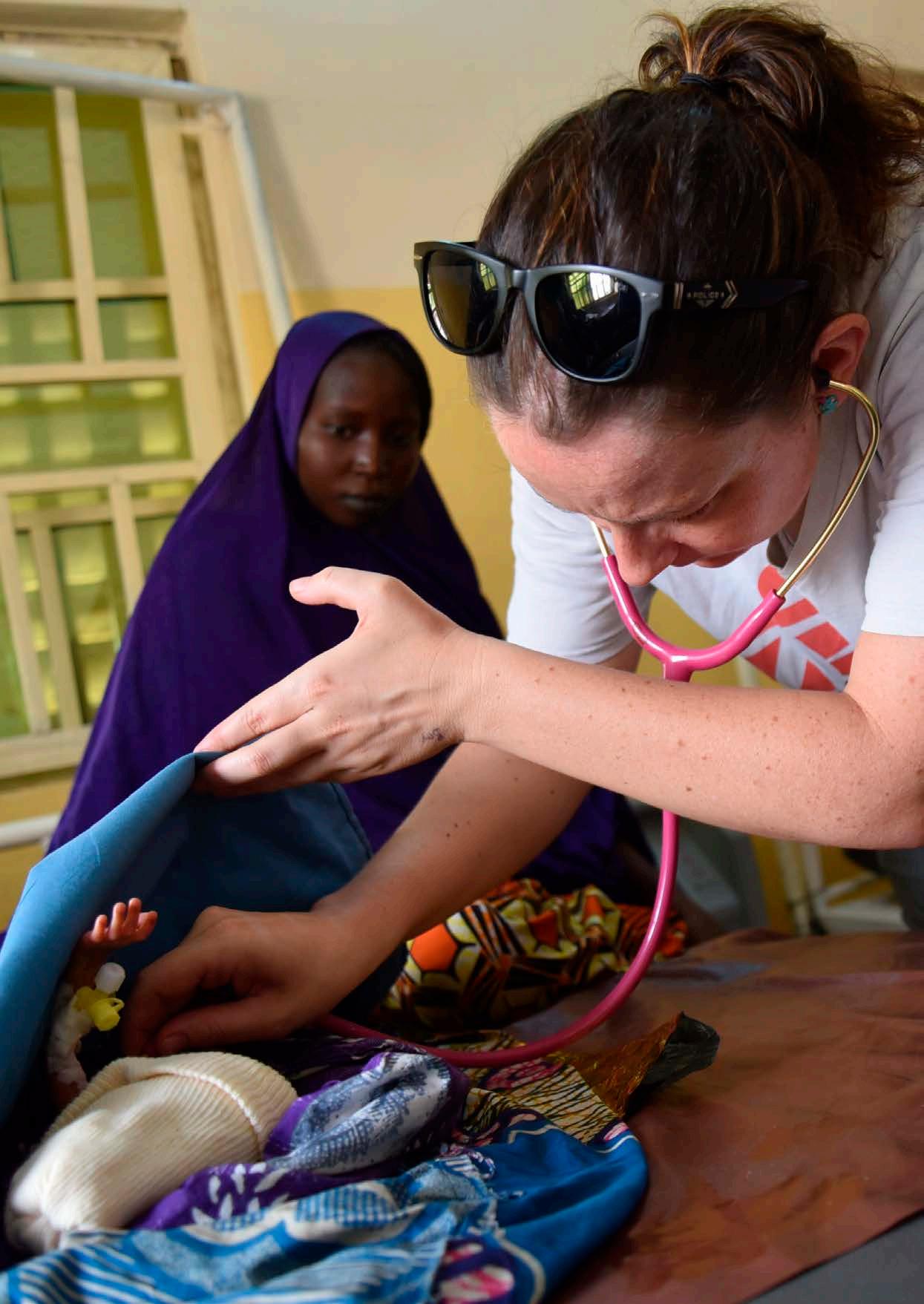 Médecins Sans Frontières New Zealand
Médecins Sans Frontières New Zealand


 Médecins Sans Frontières New Zealand
Médecins Sans Frontières New Zealand

Médecins Sans Frontières is a private international association. The association is made up mainly of doctors and health sector workers and is also open to all other professions which might help in achieving its aims. All of its members agree to honour the following principles:
Médecins Sans Frontières offers assistance to populations in distress, to victims of natural or man-made disasters and to victims of armed conflict, without discrimination and irrespective of race, religion, creed or political affiliation.
Médecins Sans Frontières observes neutrality and impartiality in the name of universal medical ethics and the right to humanitarian assistance and demands full and unhindered freedom in the exercise of its functions.
Médecins Sans Frontières volunteers undertake to respect their professional code of ethics and to maintain complete independence from all political, economic or religious powers.
As volunteers, members are aware of the risks and the dangers of the mission they undertake, and have no right to compensation for themselves or their beneficiaries other than that which Médecins Sans Frontières is able to afford them.
Katrina Penney is a nurse and midwife from Whangarei, New Zealand, who has been on several field missions with Médecins Sans Frontières and is Chair of the New Zealand Charitable Trust.
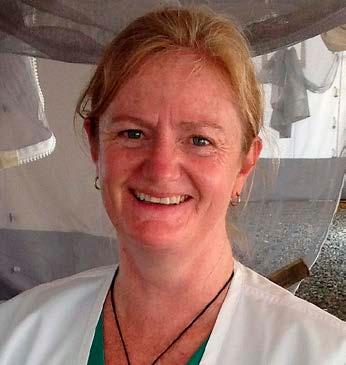
Frontières Australia; since the beginning, New Zealanders have been generous in donating their money and services to the movement. The incorporation of the New Zealand Trust in March 2016 was a milestone in recognising this support.
A further milestone was reached in 2017, with the Trust now able to receive donations from you, our supporters, and acknowledge them as tax-deductible. This was a significant step in reinforcing Médecins Sans Frontières’ identity as a reputable and trusted medical humanitarian organisation in the eyes of the New Zealand people.
My Médecins Sans Frontières journey began in 2002, with my first assignment as a nurse and midwife in Bamyian, Afghanistan. This project was one of the most incredible life experiences, and one which cemented my desire and determination to be involved in humanitarian work. Since then, I have worked in the field with Médecins Sans Frontières in Nepal, Yemen, Haiti and Sierra Leone, each assignment continuing to impress on me the value of providing quality healthcare where it is most needed.
I became an elected member of the Médecins Sans Frontières Australia board in 2013. As a proud New Zealander, I was involved in the development of the New Zealand Trust from its inception and this stood me in good stead to accept the privileged position of Chair of the Charitable Trust.
New Zealand has always been a proud and integral part of Médecins Sans
In 2017, millions of people were disproportionally affected by the impacts of violence, disease and natural disasters. In the context of such enormous need, medical humanitarian action remained more essential than ever. Our New Zealand donors are now a valued part of a global movement helping Médecins Sans Frontières to respond to such crises.
In 2017, New Zealand supporters contributed to funding essential lifesaving medical care in Yemen. Dubbed “the forgotten war”, the conflict in Yemen has claimed over 100,000 lives in three years. Providing emergency medical aid in this country continued to be a priority for Médecins Sans Frontières (see page 16 for a description of the projects in Yemen funded by New Zealand donors).
Tragically, civilians, medical personnel and health structures continued to be affected by fighting, and Médecins Sans Frontières hospitals were hit by airstrikes and shelling several times. These attacks leave both healthcare workers and people in need of medical treatment fearful to enter healthcare facilities. Civilians were further deprived of medical aid by the blockade on humanitarian assistance in 2017.
In Myanmar, peoples’ access to medical treatment was also diminished as aid organisations were refused access in some areas. However, until mid-2017 Médecins Sans Frontières was able to deliver primary healthcare to the population in the region of Wa, through the support of our New Zealand donors. Read more about this project on page 15 of the report.
As a midwife with Médecins Sans Frontières, I have been fortunate to hear firsthand the experiences of women who seek the quality delivery care offered by our teams. Pregnant women worldwide share the same personal hope: a safe delivery and a healthy baby. Thanks to your generosity in donation and thought, Médecins Sans Frontières is able to make this a reality for many women. Providing a high standard of maternal and newborn healthcare in our field projects, ‘against all odds’, is one of many ways in which we can transform a hope into a reality. Thank you for supporting us in this mission.
The New Zealand Trust has had outstanding success from its launch until now, thanks to the hard work and preparation of all involved. It has been an honour and a privilege to be part of this incredible journey.
Katrina Penney Chair of the Charitable Trust Medecins Sans Frontieres New Zealand Katrina Penney Chair of the Charitable Trust Médecins Sans Frontières New Zealand © Katrina Penney/MSF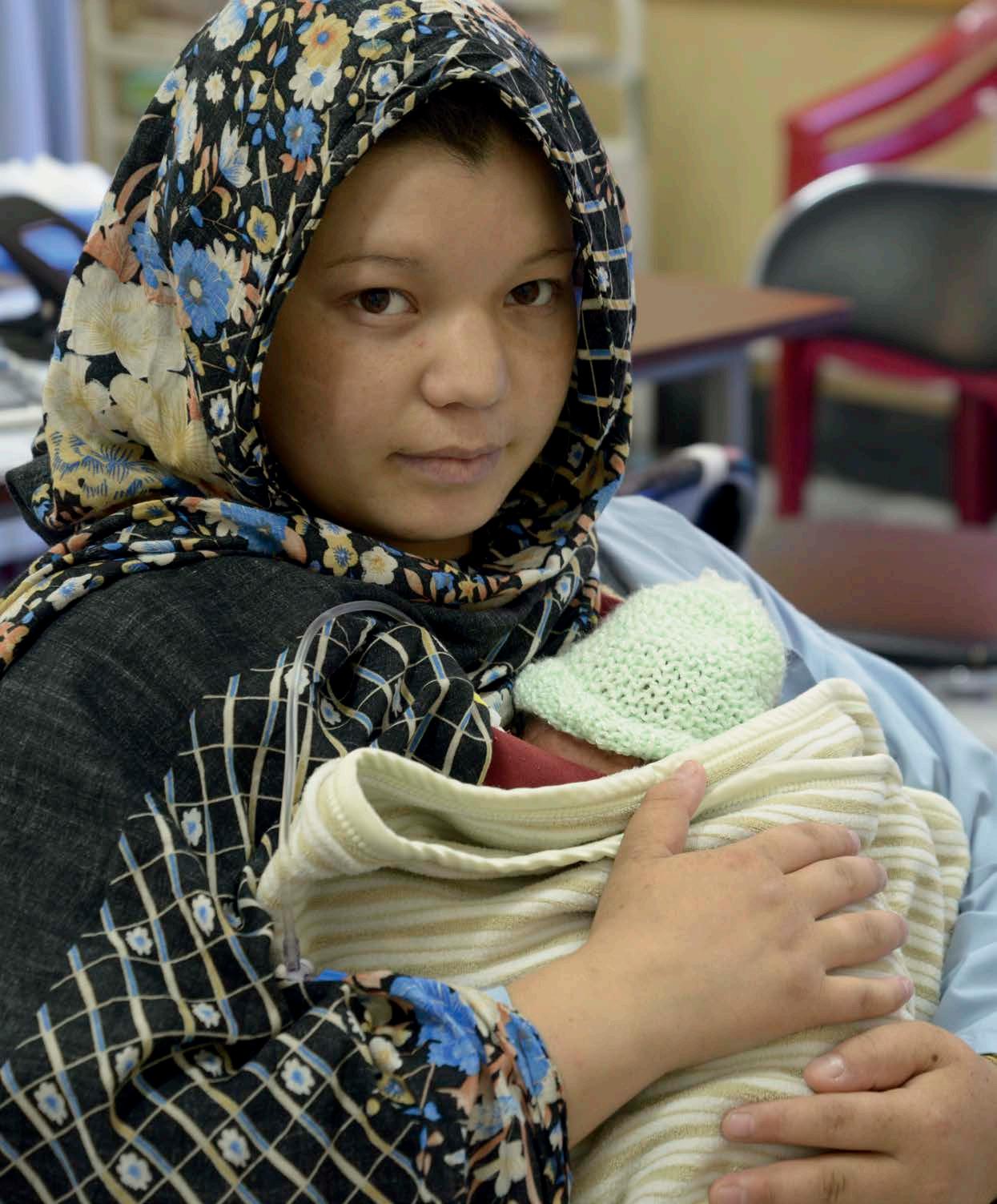 A mother and her child, who is receiving care in the Dasht-e-Barchi public district hospital, Kabul, Afghanistan. © Aurelie Baumel/MSF, 2016
A mother and her child, who is receiving care in the Dasht-e-Barchi public district hospital, Kabul, Afghanistan. © Aurelie Baumel/MSF, 2016
In 2017, Médecins Sans Frontières scaled up its response in emergency contexts around the world, delivering medical aid to those who need it most with the support of our Australian executive team.
the Philippines, Pakistan, Nigeria, South Sudan, Haiti, Liberia and Lebanon.
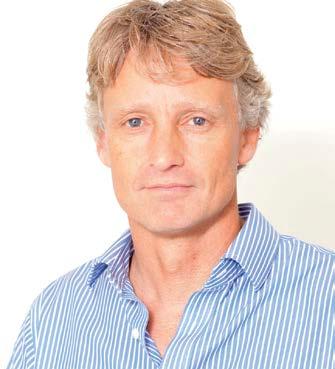
With millions of people displaced globally after being forced to flee conflict or persecution, continued violence against civilians and outbreaks of infectious disease, Médecins Sans Frontières increased its capacity to deliver quality medical assistance. In the Message from the President (page 4), Dr Stewart Condon discusses the critical role for medical humanitarian aid to address the needs of people caught in crises. In 2017, our Sydney office team continued to work diligently to support our operations in the field and make our work assisting these people possible.
Through the efforts of our Field Human Resources department, Australian and New Zealand field workers filled a total of 233 field positions in 37 countries. This exceptional number of placements was in direct response to a significant growth in our emergency activities worldwide. The countries most supported were Iraq, South Sudan, Nigeria, Syria, Yemen, Bangladesh, Afghanistan, Uganda, Tanzania and the Democratic Republic of Congo. This list comprises some of the world’s most severe humanitarian emergencies and indicates the essential contribution made by our field staff.
Our staff continued to deliver high quality, patient-centred medical care to our patients. In the Sydney Medical Unit (see message, page 10), our medical advisors worked to support our field projects in improving paediatric, women’s health and sexual violence care. The Medical Unit works in close collaboration with colleagues of the Operational Centre Paris group, as well as in direct contact with individual field projects. In 2017, the Unit conducted 16 field visits to provide technical expertise in Jordan,
Throughout 2017, we participated in 70 speaking engagements, produced approximately 100 pieces of original content, facilitated 149 external media interviews and had more than 763,000 visits to our website. With 65.6 million people forcibly displaced from their homes around the world, we highlighted their perilous journeys and precarious living conditions with a communications project during Refugee Week. Across the year we placed a communications spotlight on the crises affecting millions in Yemen and Nigeria. My visit to Maiduguri, Borno state, allowed me to document the stories of some of our patients first hand and give media interviews from our clinics. We also prioritised coverage of the refugee crisis in the Mediterranean Sea and the desperate situation of thousands trapped in Libya. We supported our operations with a long-term placement of our Media Coordinator on the rescue ship Aquarius. Closer to home, we denounced our lack of access to refugees and asylum seekers on Manus Island.
To allow New Zealanders to invest in Médecins Sans Frontières and become engaged and aware of our work, we launched www.msf.org.nz and supported our returning field workers to share their stories with the media and the public in New Zealand.
The Advocacy and Public Affairs team continued to offer services in political and sectoral analysis and networking in support of our field operations. In 2017 field teams in Indonesia and Nauru were directly supported to improve understanding of the political and sectoral context of their operations, which focus on mental health for local populations as well as forced migrants. In addition, we engaged with the Australian government and their allies in the Bali Process and ASEAN to ensure our operational experience and perspectives on the situation of the Rohingya fleeing Myanmar were well
Médecins Sans Frontières Australia Médecins Sans Frontières New Zealand © Meredith Schofieldunderstood when those states’ actions influence their fate.
Following on from our work in 2016 addressing attacks on patients, staff, and facilities in war zones, our Advocacy staff led a successful engagement with the Australian Defence Force and other key sector actors to discuss matters including targeting, protection and International Law.
The Finance and Administration team continued to improve internal controls, essential systems and drive efficiencies. The finance team has itself expanded to better support the overall growth of the office. One of the key areas of growth was the launch of our fundraising activities in New Zealand in 2017. This exciting step allows New Zealand supporters to make tax deductible donations to support medical humanitarian action.
The two-year information technology strategy is being implemented, providing many direct benefits in online tools and systems across the office and ensuring a high level of data security. Following the review and restructure of the Supporter Relations team we are seeing improved one-on-one relationships with our field partners and growing supporter base.
Domestic Human Resources maintained two priorities throughout 2017: a review of leadership within Médecins Sans Frontières, focusing on how we develop both current and emerging leaders to increase effectiveness across the organisation, and an increased investment in the health and wellbeing of staff. As an extension to these priorities, we have committed to an assessment of diversity and inclusion, ensuring that we cultivate a diverse workforce with the associated benefits of increased productivity and innovation.
International
Médecins Sans Frontières Australia was active within the international movement, positioning ourselves strongly on priority setting for operations, and leading or supporting projects that benefit our operations worldwide. Médecins Sans Frontières Australia has taken responsibility for the international Speaking Out Case Studies project, which researches and documents historical periods where
Médecins Sans Frontières spoke out on behalf of its patients when confronted by dramatic events. This valuable research will support internal and external training and reflection in the humanitarian sector.
Our partnership with the Operational Centre Paris continues to be our main international engagement. A shared strategy is now under implementation with specific contributions from Australia to our field operations such as our women’s and children’s health expertise, advocacy capacity and support in the development of field personnel.
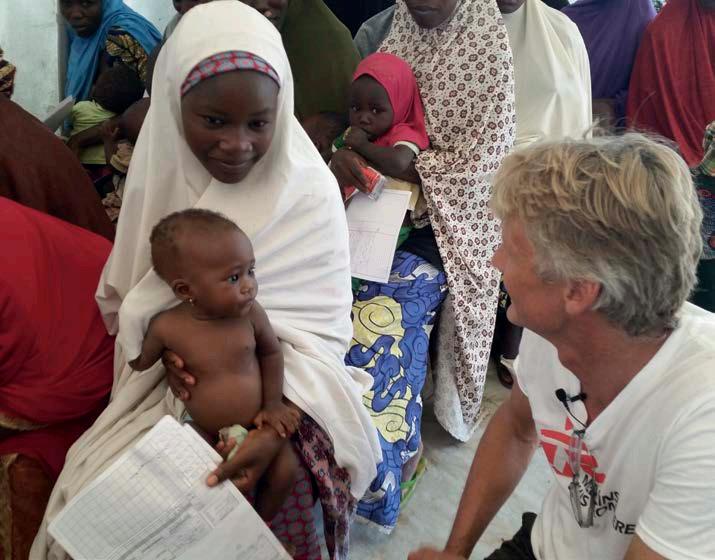
An assessment across the region of Southeast Asia has been undertaken in collaboration with our regional Médecins Sans Frontières partners in Hong Kong and Japan. This highlighted significant investment opportunities that will be further explored in 2018 in the countries of Malaysia, the Philippines, Thailand and Indonesia.
We were also finally able to support the launch of a new Médecins Sans Frontières program addressing the significant gap in mental health services in Nauru. The Sydney office plays a role in directly supporting the operations of this new team in the region.
In 2017, our fundraising activities generated a total of $88,039,735 mostly through the generous donations of our field partners and major donors.
I would like to thank you, our supporters, for the trust you have placed in Médecins Sans Frontières. It is this trust that allows our medical teams to set priorities based on what they know best and are directly confronted with. It is this trust that allows us to mobilise worldwide to respond quickly to emergencies, while maintaining our independence and impartiality to act on behalf of those often least visible.
In 2018 I will step down as Executive Director after eight fulfilling years in the role, during which time the commitment and loyalty of our long-term supporters has continued to overwhelm and impress. Over these years I have met and formed a strong relationship with many of you, with goodwill, collaboration and a joint determination to provide the best possible outcomes for the patients Médecins Sans Frontières serves. I am sincerely grateful for what we have been able to achieve together and I trust that the strong collaboration will continue.
Paul McPhun Executive Director Médecins Sans Frontières Australia Médecins Sans Frontières New ZealandField workers from Australia and New Zealand filled 233 field roles in 2017, contributing to an international workforce of more than 45,000 people.
AFGHANISTAN
Anne Hoddle paediatrician
Carmel Morsi nurse
Heather Loane anaesthetist
Janet Coleman midwife
Jessica Chua anaesthetist
Judith Forbes anaesthetist
Loren Shirley pharmacist
Megan Graham administration-finance coordinator
Miho Saito midwife
Nicole Campbell nurse
Rachael Auty nurse
Rodney Miller field coordinator
BANGLADESH
Andrew Dimitri medical doctor
Arunn Jegatheeswaran field coordinator
Ben Collard logistics team leader
Eva Capa Corrales humanitarian affairs officer
Evan O’Neill medical doctor
Jacqui Jones midwife
Jai Defranciscis nurse
Jessie Watson
HR officer - regional
Matthew Gosney HR officer - regional
Melissa Hozjan medical doctor
Rosanna Sanderson logistics team leader
Sam Templeman medical coordinator
Sandra Downing epidemiologist
Tanya Coombes HR officer - regional
CAMBODIA
Helen Tindall nurse
CENTRAL AFRICAN REPUBLIC
Eugen Salahoru medical doctor
Heidi Woods Lehnen nurse
Hugo De Vries general logistician
Katie Treble medical doctor
DEMOCRATIC REPUBLIC OF CONGO
Ann Thompson midwife
John Swinnen surgeon
Kaheba Clement Honda medical doctor
Louisa Cormack logistics team leader
Rose Burns medical doctor
ETHIOPIA
Andrew Dimitri medical doctor
Prudence Wheelwright midwife
GREECE
Trudy Rosenwald mental health coordinator
HAITI
Alex Rutherford surgeon
INDIA
Parul Kashyap HR officer
Stobdan Kalon medical coordinator
IRAQ
Aiesha Ali pharmacist
Cath Deacon medical doctor
Daron Cunningham surgeon
David Danby logistician-electrician
Diane Hanna mental health coordinator
Elisha Swift midwife
Emer McCarthy nurse
Emma Clark medical doctor
Felicity Heath nurse
Georgina Woolveridge medical doctor
Geri Dyer psychiatrist
Grace Yoo pharmacist
Graham Baker logistics team leader
Helmut Schoengen anaesthetist
Ivan Thompson surgeon
Jessa Pontevedra medical doctor
Jessica Chua anaesthetist
Kevin Baker anaesthetist
Kiera Sargeant medical doctor
Kimberley Hikaka logistics team leader
Kyla Ulmer nurse
Louise Timbs nurse
Malcolm Hugo mental health coordinator
Mathew Zacharias anaesthetist
Melissa Hozjan medical doctor
Natalie Schulz administration-finance coordinator
Natalie Thurtle medical doctor
Neil Thompson logistician-electrician
Neville Kelly logistics team leader
Philippa Collins nurse
Rachel Tullet medical doctor
Raewyn Turner nurse
Sacha Myers communications officer
Shanti Hegde obstetrician-gynaecologist
Sivapalan Namasivayam anaesthetist
Stephanie Sarta logistics team leader
Suzel Wiegert nurse
Vino Ramasamy HR officer - regional
ITALY
Erica Spry psychologist
Lauren King communications officer
Shaun Cornelius general logistician
Jordan Nastaran Rafiei medical doctor
KYRGYZSTAN
Graham Baker general logistician
Vivegan Jayaretnam logistics team leader
LEBANON
Mohamad-Ali Trad medical doctor
LIBERIA
Frederick Cutts logistician-electrician
Peter Sheridan logistics team leader
William Johnson logistician-electrician
LIBYA
Neil Thompson logistician-electrician
MALAYSIA
Corrinne Kong administration-finance coordinator
MEXICO
Adelle Springer epidemiologist
MYANMAR
Adelene Hilbig medical doctor
Jennifer Duncombe field coordinator
NAURU
Beth O’Connor psychiatrist
Carol Nagy field coordinator
Chandri Nambiar cultural mediator
NIGER
Kaheba Clement Honda nurse
NIGERIA
Allen Murphy field coordinator
Anne Taylor head of mission
Chatu Yapa epidemiologist
Corrinne Kong administration-finance coordinator
Eileen Goersdorf nurse
Erica Spry mental health coordinator
Frederick Cutts logistician-electrician
Jacqui Jones midwife
Janine Evans nurse
Jared Watts obstetrician-gynaecologist
Jessica Paterson administration-finance coordinator
Josiah Park logistics team leader
Keith Cavalli logistics team leader
Kelly Wilcox field coordinator
Kerrie-Lee Robertson administration-finance coordinator
Kerry Atkins HR officer - regional
Liam Correy nurse
Maurice Scott general logistician
Natalie Thurtle medical doctor
Sarah Scott medical doctor
Shanti Hegde obstetrician-gynaecologist
Simon Black logistician-electrician
PAKISTAN
Kate Edmonds midwife
Lisa Yu
paediatrician
Sarah Dina mental health coordinator
Simon Roberts anaesthetist
PALESTINE
Carol Nagy medical coordinator
Carol Nagy field coordinator
PAPUA NEW GUINEA
Anna Haskovec logistics team leader
Jeff Fischer general logistician
Rachel Sun pharmacist
PHILIPPINES
Kaye Bentley administration-finance coordinator
SERBIA
Simone Silberberg mental health coordinator
SIERRA LEONE
Anita Williams epidemiologist
Annie Whybourne medical doctor
Bethany Lansom nurse
Daniel Baschiera general logistician
Stella Smith field coordinator
SOUTH SUDAN
Alan Hughes obstetrician-gynaecologist
Alison Moebus nurse
Ben Collard logistics coordinator
Brian Moller field coordinator
Brigid Buick health promotion
Catherine Flanigan nurse
Dwayne Minch logistics team leader
Edith Torricke-Barton nurse
Evan O’Neill medical doctor
Freya Hogarth nurse
Grace Yoo pharmacist
Hannah Rice midwife
Jai Defranciscis nurse
Jairam Kamala
Ramakrishnan psychiatrist
Jezra Goeldi logistics coordinator
Malcolm Hugo mental health coordinator
Martin Sosa medical coordinator
Maurice Scott logistics team leader
Miho Saito midwife
Petra van Beek HR officer - regional Rachel Lister medical doctor
Rosanna Sanderson water and sanitation logistician
Roslyn Brooks medical doctor
Susan Bucknell logistics team leader
Susan Crabtree midwife
Tien Dinh pharmacist
Tria Rooney medical doctor
Ursula Alwash nurse
SWAZILAND
Nick O’Halloran administration-finance coordinator
SYRIA Aiesha Ali pharmacist
Amy Neilson medical doctor
Annie Chesson midwife
David MacFarlane obstetrician-gynaecologist
Eric Boon logistics team leader
Haydar Alwash surgeon
Jane Davies nurse
Jessica Chua anaesthetist
Jessica Vanderwal nurse
John Cooper general logistician
Kamal Heer surgeon
Kevin Baker anaesthetist
Kriya Saraswati general logistician
Peter Mathew surgeon
Rachel Tullet medical doctor
Raewyn Turner nurse
Ranya Samaan logistician-construction
Sivapalan Namasivayam anaesthetist
Susan Bucknell logistics team leader
Suzel Wiegert nurse
Toby Gwynne nurse
Vanessa Cramond medical coordinator
Virginia Lee mental health coordinator
TANZANIA
Elisha Swift midwife
Jennifer Craig logistics team leader
Kristi Payten medical coordinator
Morne Ferreira logistician-electrician
Natasha Davies nurse
Saschveen Singh medical doctor
UGANDA
Amy Le Compte midwife
Anna Haskovec general logistician
Anthea Fisher logistics team leader
Hannah Hassell midwife
Irina Petrova psychologist
Janthimala Price field coordinator
Kaheba Clement Honda nurse
Khang Hoong Foong pharmacist
Kimberley Hikaka logistics team leader
Lisa Mazlin nurse
Stephanie Sarta general logistician
Vanessa Cramond medical coordinator
UKRAINE
Zen Patel administration-finance coordinator
UZBEKISTAN
Jemma Taylor medical doctor
YEMEN
Caterina Schneider-King HR officer - regional
Claire Manera field coordinator
David McGuinness nurse
Diana Wellby obstetrician-gynaecologist
Haydar Alwash surgeon
Helle Poulsen-Dobbyns medical coordinator
Hugo De Vries logistician-construction
Liam Hannon medical doctor
Lisa Altmann nurse
Melissa McRae medical coordinator
Natasha Davies nurse
Richard Lees anaesthetist
Sita Cacioppe field coordinator
Steven Purbrick field coordinator
Tamaris Hoffman surgeon
Tiffany Button nurse
VARIOUS
Kylie Gaudin logistics team leader
Robert Onus field coordinator
Rose Stephens nurse
Médecins Sans Frontières New Zealand Annual Report 2017 – 9
This list of field workers comprises only those recruited by Médecins Sans Frontières Australia. We also wish to recognise other Australians and New Zealanders who have contributed to Médecins Sans Frontières programs worldwide but are not listed here because they joined the organisation directly overseas.Providing patient-centred, high quality care across paediatric, women’s health and sexual violence care projects was the focus for the Médecins Sans Frontières Australia Medical Unit in 2017.
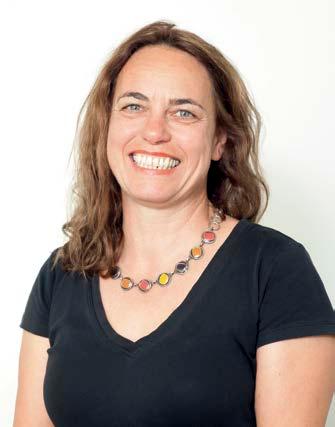
In 2017 the Medical Unit continued to strive to deliver a high standard of healthcare across Médecins Sans Frontières’ projects globally. In women’s health we prioritised the development of quality obstetric support to deliver babies safely, together with quality care for newborns from the start of life.
16,000 BIRTHS assisted in Kabul, Afghanistan
4,807 WOMEN screened for cervical cancer in the Philippines and Malawi
45,817 CHILDREN admitted to therapeutic feeding programs
70,350 children hospitalised
262 MEDICAL STAFF TRAINED in emergency paediatric care
6,244 PATIENTS came for initial care for sexual violence
We fulfilled our primary responsibility of supporting patient care in many ways, including through disease screening and prevention, innovative treatment, providing better access to medical care for highly vulnerable patients, and increasing our understanding of the contexts in which we work.
A key priority for the Medical Unit in 2017 was further improving women’s access to quality delivery care. We shifted our focus to outside of the hospital, aiming to improve care and awareness in communities. In Jahun, Nigeria, we focused on delivery care in health centres to enable women to safely deliver babies closer to home, aiming to reduce the high rate of complicated deliveries and reduce risk of consequences such as fistula, foetal death and maternal death. In terms of higher level obstetric and newborn care, the maternity hospital in Kabul, Afghanistan, remained our largest maternity program: in 2017, our medical teams helped with the deliveries of some 16,000 babies, a quarter of all the births assisted in Medical Unit-supported projects worldwide.
Across all our projects offering maternal healthcare, we also deliver quality care for newborns. In 2017 the Medical Unit piloted a neonatal training program, linked to our neonatal guidelines, aimed at staff not experienced in newborn care. This received a good response both across the
organisation and from local Ministries of Health in countries where we work.
Along with safe delivery care, and as an essential part of lifesaving healthcare for women, we continued to offer safe abortion care in our projects. We are providing emergency care for unsafe abortion, family planning and termination of pregnancy on request, with sustained efforts to increase training and support for our teams.
Across our two projects providing cervical cancer prevention, in the Philippines and Malawi, 4,807 women were screened for cervical cancer. In the second year of our project in the Tondo slum area of Manila, Philippines, we vaccinated more than 23,000 girls against the human papillomavirus (HPV) responsible for cervical cancer, and we increased screening for cervical cancer by visual inspection with acetic acid (VIA) by over 500 per cent. This type of screening allows for immediate recognition of suspicious lesions and their treatment on the same day. The implementation of a mobile clinic in the form of a van set up to screen and treat patients provided more accessible care for women.
Our treatment of paediatric malnutrition required context-adapted responses. In 2017 we were involved at a larger scale than ever before in providing treatment for malnutrition in infants under the age of six months, in Qayyarah in Iraq, following the evacuation of Mosul, and in Kobane/Ain Al Arab in northern Syria. We provided formula milk for malnourished babies of mothers who could not lactate and initiated activities aiming at re-establishing lactation and breastfeeding support. Globally, we admitted 45,817 children
In projects supported by the Médecins Sans Frontières Australia Medical Unit Dr Myrto Schaefer Head of Medical Unit Médecins Sans Frontières Australia © Meredith Schofieldto our therapeutic feeding programs. In 2017 we continued to work on simplified strategies of treatment. The measure of a child’s middle upper arm circumference (MUAC) was scaled up as an admission criterion to feeding programs in addition to being a screening tool, allowing faster and more efficient identification of children in need of therapeutic feeding.
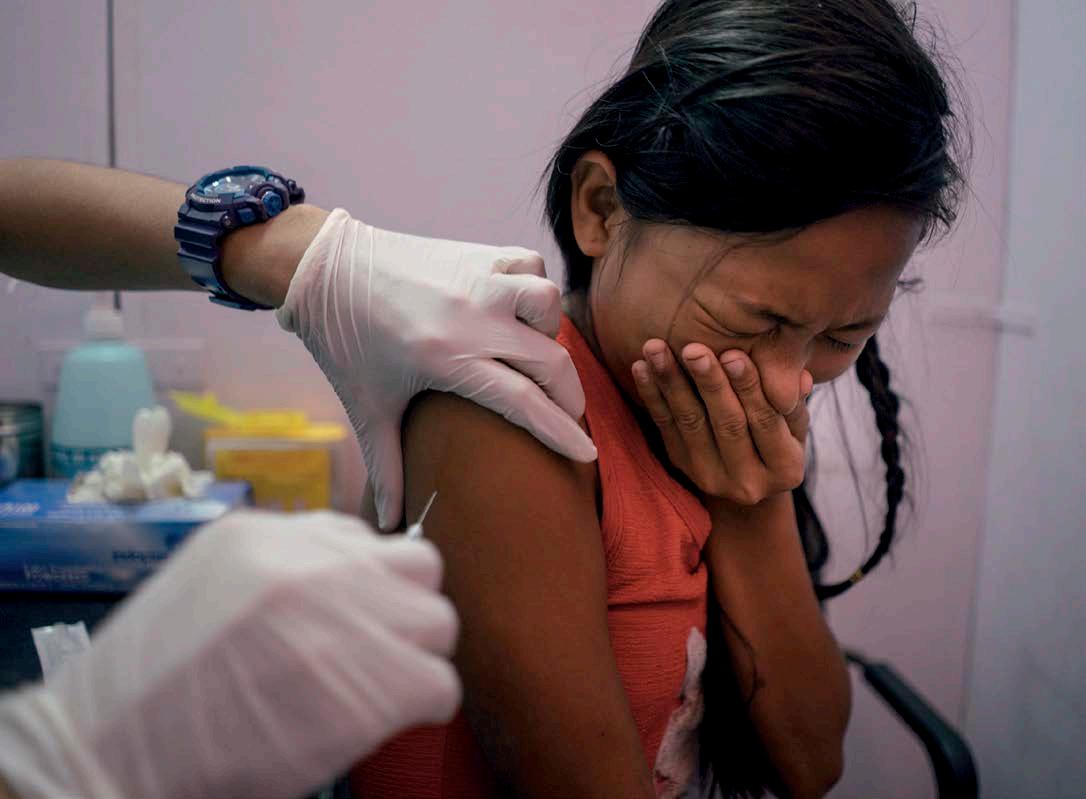
In 2017, 70,350 children under 15 years of age were hospitalised across our projects and 788,257 children were treated in Médecins Sans Frontières health centres. We opened a paediatric intensive care unit (PICU) service in our project in Zahle, Lebanon, close to the border with Syria. The project encompasses a PICU linked to a paediatric ward and chronic disease service to treat conditions such as epilepsy, asthma and thalassemia (a hereditary blood disease), with the aim of providing specialised paediatric care which otherwise is not accessible to the
Syrian refugee population. In 2018 we will continue to develop the provision of intensive care to critically sick children in this project. In Monrovia, Liberia we developed our first project to focus on paediatric surgery. We plan to raise the level of care through training local staff in paediatric surgery, paediatric anaesthesia and high level paediatric care. In 2017 a total of 262 medical staff were trained in emergency paediatric care across 14 courses worldwide.
Sexual violence care is increasingly a priority for the Medical Unit. In 2017, 6,244 patients came for initial care, almost 50 per cent more than in 2016. The increase reflects the opening of new clinics providing sexual violence care, as well as indicating that established clinics are seeing more patients. Our Mathare sexual violence project in Nairobi, Kenya, running for over eight years, has added two decentralised clinics to continue to
reduce barriers to access care. In 2017 we implemented sexual violence care in an emergency context in Yumbe, Uganda, serving mainly South Sudanese refugees. This project saw 786 cases in the year. As well as providing ongoing training to our international and national staff, the Medical Unit supported field operations by developing the role of Sexual Violence Mobile Implementation Officer. The Officer will, in 2018, provide face-to-face support in our projects to ensure a high quality of care is delivered to victims of sexual violence.
2017 proved to be a challenging but productive year for the Medical Unit. In 2018, we will continue to work in innovative ways to improve the care we deliver.
Dr Myrto Schaefer Head of Medical Unit Médecins Sans Frontières AustraliaMédecins Sans Frontières field projects are run by five operational centres (Amsterdam, Barcelona, Brussels, Geneva and Paris). Donations made to Médecins Sans Frontières
New Zealand and Médecins Sans Frontières Australia contribute to funding projects run by both the Paris and Geneva operational centres and to funding field roles.
“In 2017, we increased our capacity to deliver quality medical assistance.”
- Paul McPhun, Executive Director, Médecins Sans Frontières New Zealand
In 2017, Médecins Sans Frontières allocated funds from New Zealand donors to projects in Myanmar and Yemen. Médecins Sans Frontières also runs a range of other projects including those described on pages 14 to 55 (funded by Australian donors). The report also includes stories from field workers recruited by Médecins Sans Frontières Australia.
Médecins Sans Frontières Australia’s full financial statements are available in the Médecins Sans Frontières Australia Annual Report at https://www.msf.org.au/reports-and-publications. For a complete record of Médecins Sans Frontières’ work in 2017, including projects funded through other Médecins Sans Frontières sections, please go to www.msf.org.
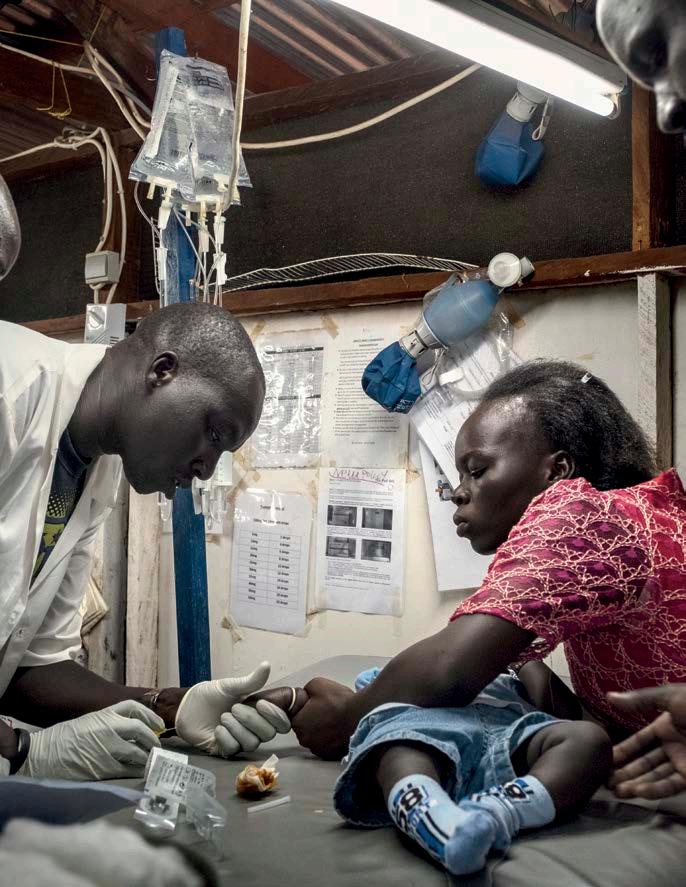
KEY:
TOTAL FUNDING
refers to the total cost of the projects described in the country description for 2017 (projects run by Operational Centre Paris and/or Operational Centre Geneva). All amounts are in New Zealand dollars.
MSFA FUNDING
refers to Médecins Sans Frontières Australia’s contribution to the country’s projects in 2017. All amounts are in New Zealand dollars.
MSFNZ FUNDING
refers to Médecins Sans Frontières New Zealand’s contribution to the country’s projects in 2017. All amounts are in New Zealand dollars.
FIELD STAFF
refers to the total number of field staff in projects run by Operational Centre Paris and Operational Centre Geneva in 2017.
A Médecins Sans Frontières midwife with her son, who is examined by staff for symptoms of malaria in a clinic in Aweil, South Sudan. © Peter BauzaFUNDING:
TOTAL MSFA MSFNZ
$1,802,917 $36,069 $67,057
In 2017 in Myanmar, armed conflict, displacement, intercommunal tensions and statelessness led to a significant crisis. Meanwhile, provision of medical care diminished further as aid organisations were refused access.
In August, attacks on police posts in Rakhine state prompted government forces to respond with grossly disproportionate security operations. This caused a catastrophic humanitarian situation in the state, prompting over 660,000 people – mostly Rohingya – to flee to Bangladesh by the end of the year.
At the end of 2017, Médecins Sans Frontières was still waiting for official permits to carry out medical activities, Rohingya continued to flee across the border into Bangladesh, and very few humanitarian actors were allowed to respond in Rakhine.
In eastern Myanmar, in Wa Special Region 2, Médecins Sans Frontières ran fixed and mobile clinics to provide primary healthcare in an area where access to medical treatment is severely limited.
Due to a worsening political situation and the inability to secure access for
NAME: Jacqui Jones
FIELD ROLE:
FROM: Originally from New Zealand, now in Wyoming NSW
Midwife Activity Manager, Maiduguri, April to October 2017
international staff, Médecins Sans Frontières activities in Wa ended in mid-2017. Before the close of the project, teams performed over 2,438 outpatient consultations and 112 antenatal consultations, provided vaccinations, including against tetanus, to 2,382 pregnant women, treated 497 people for non-communicable diseases, and provided regular community health training on the use of safe delivery kits and treatment of malaria.
My role in Maiduguri involved assisting with managing the Nigerian supervisors, providing education to staff and assisting with difficult births or other cases.
I was available on the phone to the midwives whenever they needed me, as I could only visit the hospitals during the day due to security restrictions. One patient story which stuck with me was the case of a nun who came for treatment for a gynaecological problem. She was displaced after armed groups attacked the convent. I didn’t have the equipment to help, so together we went to the Ministry of Health supervisor, an Islamic woman who at that time was fasting during Ramadan. I watched these two women conversing, and they quickly found a solution. There was no judgement about religion or anything else, just assistance provided to someone who required it. This is what always amazes me the most. Our world has us believe we are at war with one another, however working with Médecins Sans Frontières, seeing regular people getting on with their lives, you realise we have no reason to be.
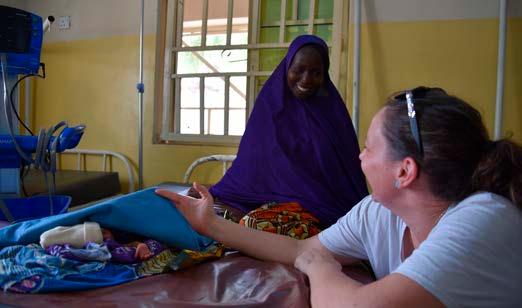
In Wa, Médecins Sans Frontières ran clinics in an area where access to medical treatment is severely limited.
KEY ACTIVITIES:
FIELD STAFF:
KEY MEDICAL FIGURE: 12,674 people treated for cholera in
A full-scale war has been raging in Yemen since 2015. In 2017, a cholera outbreak and an upsurge in fighting exacerbated the already dire humanitarian situation.
Much of the public infrastructure, including health facilities, has been destroyed by the warring parties. Import restrictions due to the imposition of a blockade by the Saudi-led coalition in 2015, coupled with high inflation, have crippled Yemenis’ access to healthcare and other essential services. Furthermore, many of the country’s 50,000 health workers have not been paid since August 2016 and have consequently left the public health system, forced to look for other sources of income. All these factors have led to the collapse of the health system and outbreaks of diseases. Even where medical facilities are operational, most people are no longer able to afford the transport costs
to go to them. This means they are unable to seek timely care, and easily curable health conditions are turning deadly when left untreated.
In 2017, Yemen experienced its worst cholera epidemic, with an estimated one million people affected. The conflict exacerbated the challenges for Yemeni people in accessing clean water, disposing of waste and obtaining medical care.
Aden
In Aden governorate, Médecins Sans Frontières dispatched an emergency team to respond to the second wave of cholera, providing training of staff,
donations, and water and sanitation support in cholera treatment centres (CTCs) set up by the Ministry of Health. At Médecins Sans Frontières’ emergency surgical hospital in Aden, the team saw an increase in the number of patients admitted for surgery this year, not only from the frontlines, but also from within the city, due to an upsurge in violence. Staff performed 4,881 surgical interventions in Aden in 2017.
Amran
Teams treated 12,674 people with cholera in Amran governorate in 2017. Médecins Sans Frontières also worked in Khamir and Huth hospitals, where teams provided maternal healthcare, paediatric care and nutrition care, and performed 2,210 caesarean sections.
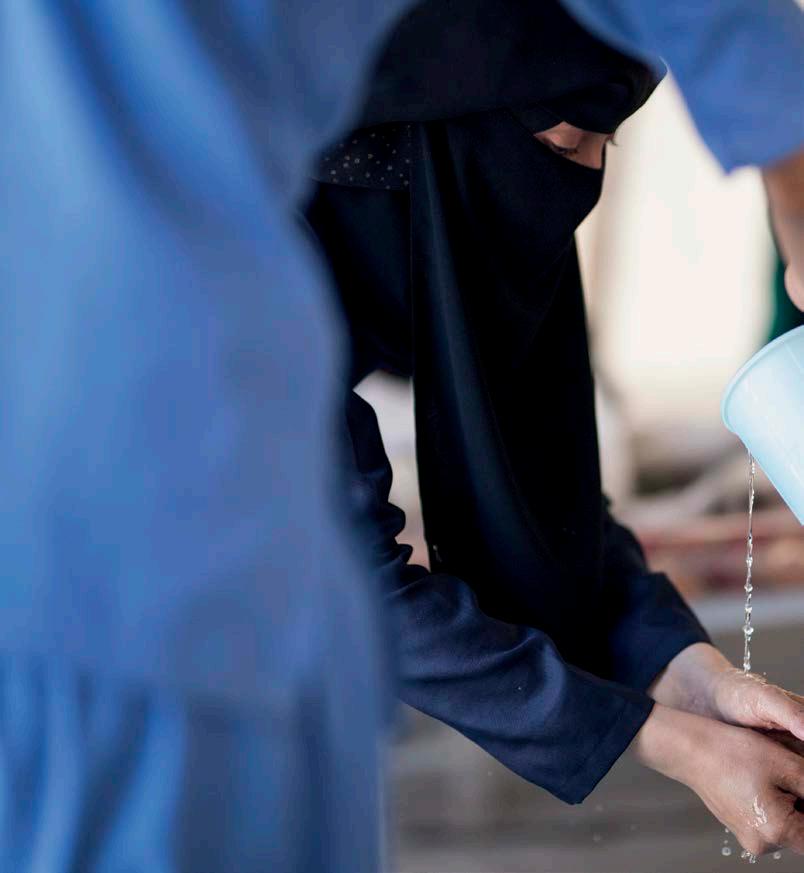
In 2017, Médecins Sans Frontières returned to the hospital in Haydan, in the governorate of Sa’ada. Teams had left after the hospital was destroyed by airstrikes in 2015. Throughout the year, staff provided 11,894 emergency consultations and 3,889 ante- and postnatal consultations. Further east, our teams also support the health centres of Nushor and Yesnim. In response to the cholera outbreak, we ran a CTC of 20 beds in Sa’ada city.
In Kilo, a city located between Ibb and Taiz, Médecins Sans Frontières continued to work on improving the surgical capacity, intensive care unit, emergency ward and inpatient department of one of the main hospitals. The team trained staff in mass casualty
NAME: Lauren King
FROM: Sydney, NSW
FIELD ROLE: Field Communications Manager on the MV Aquarius, search and rescue ship operated by Médecins Sans Frontières and SOS Mediterranée, July to December 2017
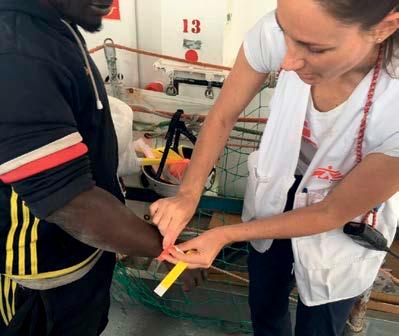 © Lauren King/MSF
© Lauren King/MSF
I coordinate all communications for Médecins Sans Frontières from the Aquarius. There are often independent journalists on board the ship, so I set up interviews for them and organise the logistics of their visit. I respond to interview requests, write stories, and make videos for social media. But of course, when there are rescues, all plans go out the window! Quite often we’re woken up at 4am by the Maritime Rescue Coordination Centre informing us of boats in distress. I grab my tools – for doctors, it’s the medical kits, for communications, it’s your phone and camera. I wake up the journalists on board, and then I head up to the deck to take photos of the team in action and update Twitter. After that, I help with the rescue. I hand out rescue kits and assist the midwife in the women’s shelter. My scheduled deck watch is a great time to hear the stories of the people we have rescued. The hardest time on board is disembarkation. Watching people leave after two days hearing of their extraordinary journeys from Africa and the Middle East, and not knowing what their future holds, is incredibly difficult to do. Once they disembark we can’t do much for them. The team would identify the most vulnerable cases and link them to other humanitarian organisations in Italy. Apart from this, we can only provide humanity and dignity in the short time we are with them.
incident preparedness and supported the maternity unit, laboratory and X-ray department with logistics and supplies. As more people became aware of our activities at this hospital, the number of patients increased. Médecins Sans Frontières teams provided 3,886 surgical interventions and 3,644 emergency consultations, and admitted 7,737 patients for treatment in 2017.
The respect for humanitarian principles and the safety of medical facilities and staff remain key concerns for Médecins Sans Frontières, as well as import limitations due to the blockade and their effects on the Yemeni healthcare system. Authorities in Sana’a and Aden continue to impose new and often arbitrary requirements and restrictions on aid operations across the country. In November 2017, the Saudi-led coalition imposed a complete blockade on humanitarian staff and cargo at the ports and airports under its control, thereby hampering Médecins Sans Frontières’ capacity to assist vulnerable communities in need.
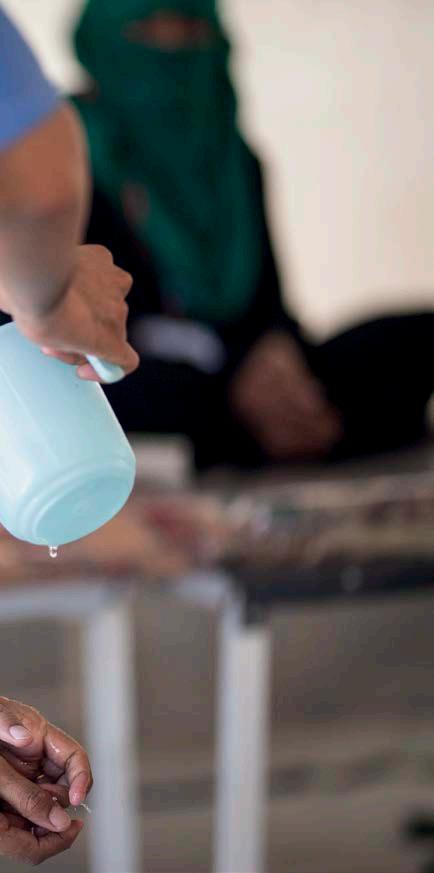
The following projects were funded by Médecins Sans Frontières Australia.
AFGHANISTAN
Médecins Sans Frontières focuses on providing maternal healthcare in Afghanistan, which has some of the highest maternal and neonatal mortality rates in the world.
The conflict in Afghanistan continued to intensify in 2017, exacerbating the already immense medical needs.
KEY ACTIVITIES: Maternal healthcare, newborn care
FUNDING: TOTAL MSFA
$5,726,243 $1,526,080
FIELD STAFF: 278
KEY MEDICAL FIGURE: 16,000 babies delivered in Dasht-e-Barchi
In Kabul, Médecins Sans Frontières supports the Ministry of Public Health to provide 24-hour maternal care at Dasht-e-Barchi hospital, the only facility for emergency and complicated deliveries in a neighbourhood of more than one million people. Médecins Sans Frontières runs the labour and delivery rooms, an operating theatre for caesarean sections and other complicated deliveries, a recovery room, a 30-bed maternity unit and a 20-bed neonatal unit.
In 2017, the Médecins Sans Frontières team assisted almost 16,000 deliveries, a third of which were complicated cases. At the end of the year, we started to support another Ministry of Public Health hospital in the area with staff, training and essential drugs to increase
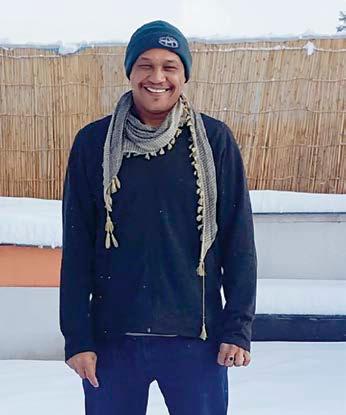
NAME:
Siry Ibrahim
FROM: Wellington, NZ
FIELD ROLE: Head of Mission, Afghanistan, November 2016 to August 2017
I contributed to the analysis and follow up of the political and humanitarian situation for Médecins Sans Frontières in Afghanistan, including analysing the local context and problems. I gave support to our operational strategy, monitored operations and provided managerial support to the Project Coordinators. I had responsibilities in security analysis and management, negotiations with stakeholders, communications and reporting, to name a few. Part of my role was also to facilitate the debates and discussions at field level among Médecins Sans Frontières’ association members. Médecins Sans Frontières provides a very unique opportunity – the job is challenging and rewarding at the same time. The most challenging aspects are sometimes feeling hopeless when you cannot access the people in need, and when you say goodbye to people you have just spent your whole assignment with. But the work gives you a sense of fulfilment that no other job can.
the facility’s capacity to provide noncomplicated maternity services. Working at full capacity, the newborn unit admitted 1,342 babies with complications such as sepsis, hypoglycemia and birth asphyxia [loss of oxygen around the time of birth].
The newborn unit admitted 1,342 babies with complications such as sepsis, hypoglycemia and birth asphyxia.
Médecins Sans Frontières supports the Armenian health authorities in treating patients with drug-resistant tuberculosis (DR-TB).
Tuberculosis remains a significant public health concern in Armenia, with an estimated incidence of 44 new cases per 100,000 people in 2016. DR-TB prevalence is 47 per cent among patients who have already been treated for TB.
Médecins Sans Frontières has supported the Armenian health authorities in providing treatment to DR-TB patients since 2005 and has progressively expanded its activities. Since June 2016, these have covered the whole country. In 2013, with Médecins Sans Frontières’ support, Armenia was among the first countries in the world to use bedaquiline, the first new drug to be developed to treat TB in 50 years. The Armenian Ministry of Health and Médecins Sans Frontières have since collaborated to provide access to delamanid, another new TB drug. Since 2015, both drugs have been prescribed in the framework of the
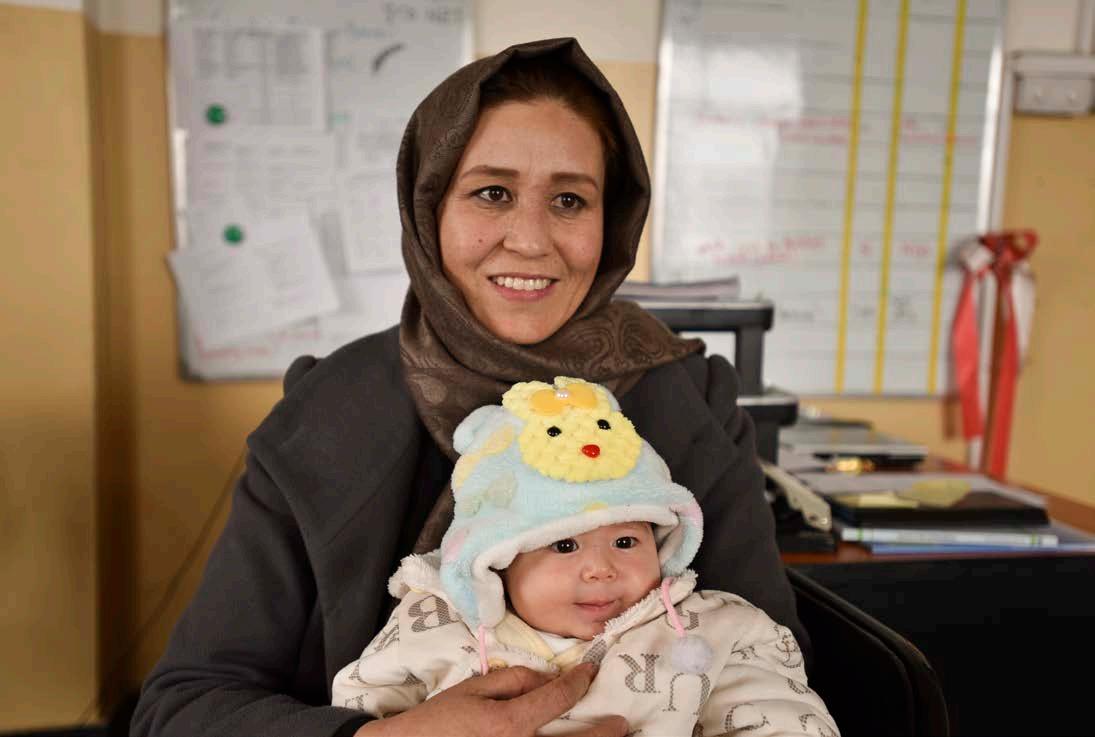
endTB partnership, a project that aims to accelerate the use of bedaquiline and delamanid, and to document their safety and effectiveness in routine use. At the end of 2017, 142 DR-TB patients started a regimen that included one of the two new drugs. To help patients cope with the constraints of the treatment, which lasts up to two years and involves taking thousands of pills under medical observation, Médecins Sans Frontières has introduced a system enabling patients to take some drugs at home, with a medical staff member remotely connected by video. In 2017, 65 patients benefited from this system.
Since 2016, Médecins Sans Frontières has also been offering treatment to DR-TB patients co-infected with hepatitis C, using direct-acting antivirals, a new, effective and less toxic class of drugs. In 2017, 26 co-infected patients started treatment.
KEY ACTIVITIES: Tuberculosis care
FUNDING: TOTAL MSFA
$2,749,213 $164,099
FIELD STAFF: 43
KEY MEDICAL FIGURE: 142 patients receiving innovative DR-TB treatment
Aqila is Midwife Supervisor in Dasht-e-Barchi hospital in Kabul, Afghanistan. She delivered her baby boy in the hospital. On working days he is cared for in the childcare centre, which opened in January 2016. YEREVAN TURKEY AZERBAIJAN Project locations funded by Australian donorsKEY ACTIVITIES:
Paediatrics, primary healthcare, sexual and reproductive healthcare, water and sanitation activities
FUNDING:
TOTAL MSFA
$2,749,213 $305,216
FIELD STAFF:
278
KEY MEDICAL FIGURE: 400 patients treated per day in Tasnimarkhola
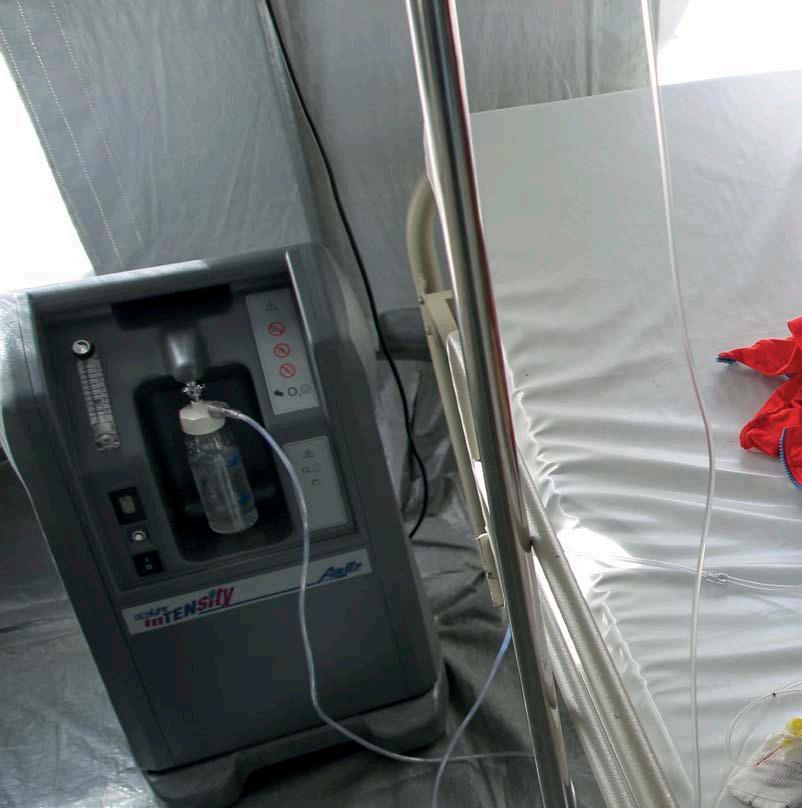
In 2017, Médecins Sans Frontières dramatically scaled up its activities to respond to a massive influx of Rohingya refugees from Myanmar.
A concerted campaign of violence unleashed by the Myanmar military against the Rohingya in Rakhine state, Myanmar, from 25 August prompted more than 660,000 people to flee across the border into Cox’s Bazar district, Bangladesh, by the end of 2017, bringing the total Rohingya refugee population in the country to over 830,000. Most Rohingya are living under precarious shelters in heavily congested settlements prone to mudslides and flooding, where the hygiene and sanitation conditions are dire, and there is a shortage of clean drinking water.
In response to the huge growth in needs, Médecins Sans Frontières massively scaled up operations in Cox’s Bazar. The main conditions treated by the teams were respiratory tract infections, diarrhoeal diseases and
child malnutrition, which directly correlate with the abject living conditions in the settlements. In 2017, teams established two health centres in Balukhali informal refugee camp, and one health centre with a sexual and reproductive health service in Tasnimarkhola camp. The Tasnimarkhola centre treated an average of 400 patients per day, 30 per cent of who were children under five years old. The centre also received victims of sexual violence. A 50-bed hospital with an isolation room for people with infectious diseases was constructed in Tasnimarkhola camp, dedicated to children under 15 years of age. The facility was the only one offering inpatient care in the area.
Plans were made to open a second hospital in Balukhali camp in 2018,
encompassing a maternity department with a neonatal care unit, an intensive care unit, an isolation unit and an intensive therapeutic feeding centre.
Médecins Sans Frontières also undertook water and sanitation activities, which in 2017 included providing the health facilities with water, hygiene and sanitation support through the construction of wells, latrines, greywater management and a waste zone; as well as a deep drilling campaign to increase access to clean water in the camps.
To manage outbreaks of infectious disease, Médecins Sans Frontières established an active surveillance system alongside a volunteer-based outreach program to identify and refer cases of diphtheria and measles in the community. Our team also worked with other Médecins Sans Frontières sections to support a Ministry of Health measles vaccination campaign in late November.
In December, Médecins Sans Frontières published results from six surveys it conducted in refugee settlements in Bangladesh, which revealed that at least 9,000 Rohingya died in Myanmar, in Rakhine state, between 25 August and 24 September 2017. As 71.7 per cent of the reported deaths were caused by violence, at least 6,700 Rohingya, in the most conservative estimations, were estimated to have been killed, including at least 730 children under the age of five years. Médecins Sans Frontières has routinely collected accounts by refugees who arrived in Bangladesh after 25 August to better understand the circumstances of their flight and the patterns of violence to which they have been exposed. At the end of 2017, Rohingya continued to seek refuge in Bangladesh and a significant increase in humanitarian aid is needed in 2018.
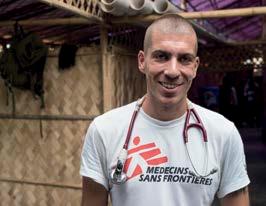
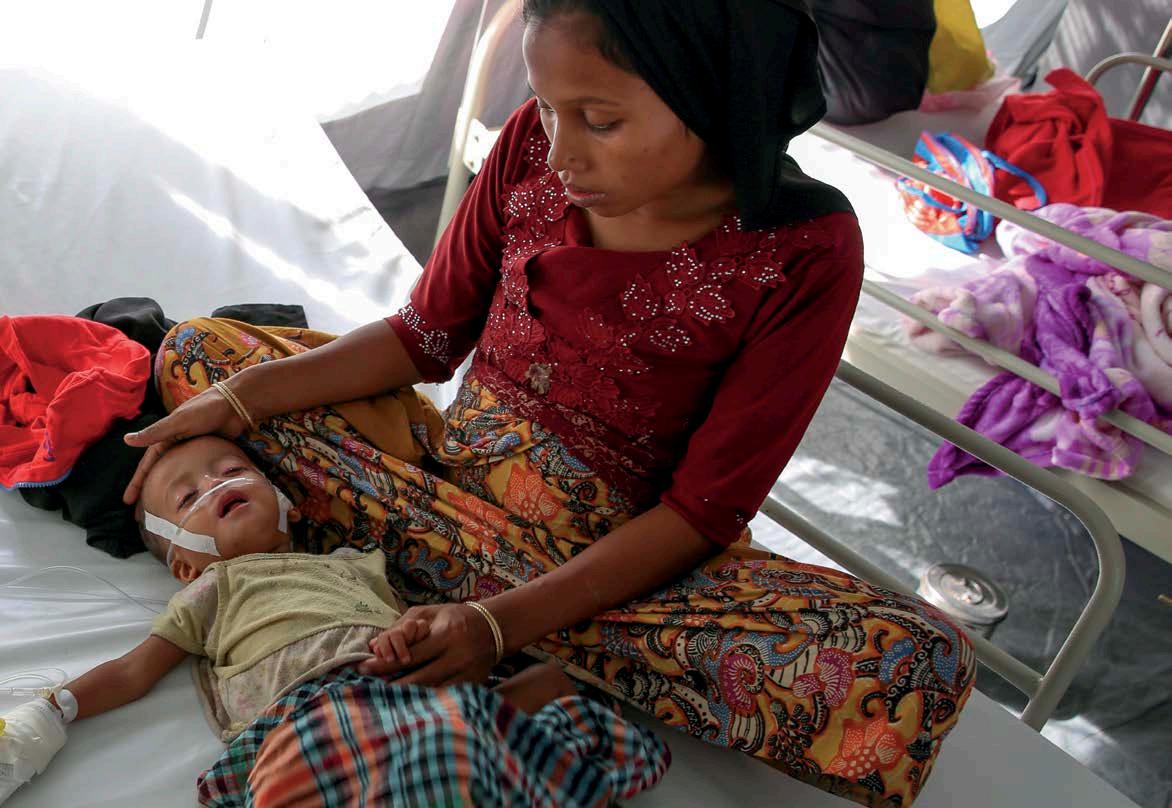 NAME: Evan O’Neill
NAME: Evan O’Neill
FROM: Melbourne, VIC
FIELD ROLE: Medical Activity Manager, Bangladesh, September to November 2017
In addition to a clinic, we also have an outpost deeper in the camp where we provide medical advice and essential medicines to patients unable to traverse the tricky path to our crowded clinic. It also gives us extra eyes, as we monitor for potential outbreaks – cholera, measles, polio – all possible. Children account for more than the fair share of smiles I see, and in my mind each smile is defiance in the face of the statistical peril facing paediatric patients. Or maybe it’s just a good distraction. Children don’t know the numbers, but they know hunger. We are seeing more children wasted to the point of severe acute malnutrition (SAM). It is said that if you are a child with malnutrition, you are 10 times more likely to die from common camp afflictions, like diarrhoea or respiratory infections. This worries me as I think about the spectre of malnutrition looming larger by the day. We are monitoring it and referring the ones we identify as SAM to the ambulatory malnutrition treatment centres in the camp and, eventually, referring the more severe cases to the intensive inpatient treatment centre Médecins Sans Frontières has a few kilometres north.
© MSF Médecins Sans Frontières New Zealand Annual Report 2017 – 21KEY ACTIVITIES: Hepatitis C care
FUNDING:
TOTAL MSFA
$5,775,917 $1,008,559
FIELD STAFF: 54
KEY MEDICAL FIGURE:
2,926 patients treated with direct-acting antivirals
In 2017, Médecins Sans Frontières projects in Cambodia focused on tackling hepatitis C.
In May 2016, Médecins Sans Frontières launched a program offering free diagnosis and treatment for hepatitis C. Although its prevalence is unknown, an estimated two to five per cent of the Cambodian population is infected. Treatment for this blood-borne virus, once considered a lifelong and deadly disease, has been revolutionised in recent years with the arrival of new – and expensive – drugs, called direct-acting antivirals.
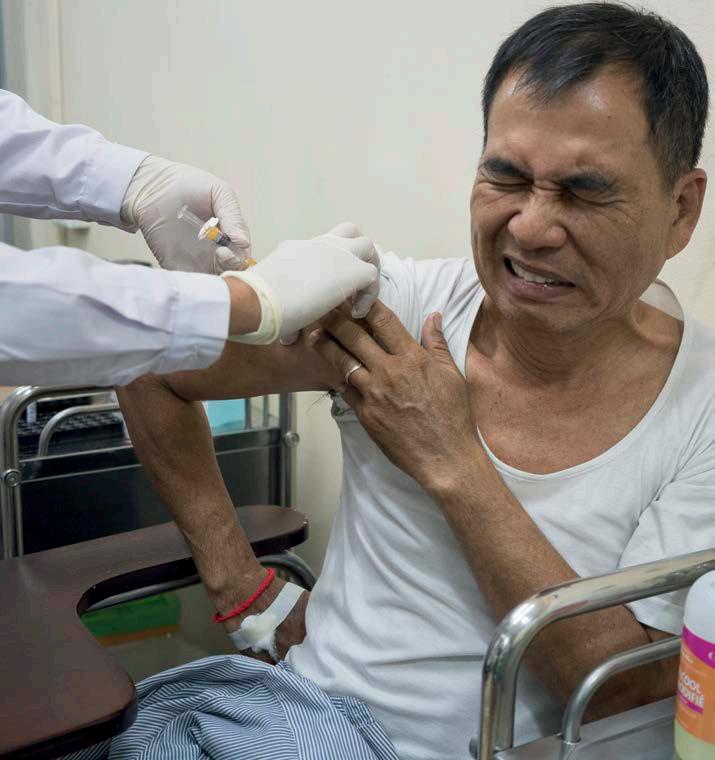
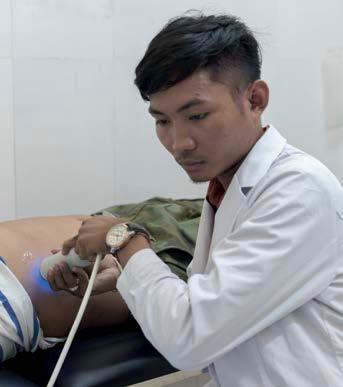
The project is based at Preah Kossamak hospital in the capital, Phnom Penh. One of its goals is to simplify diagnosis and treatment, to show its cost-effectiveness and make it replicable in other countries. In 2017 Médecins Sans Frontières treated 2,926 patients with direct-acting antivirals, which cure more than 95 per cent of people who complete the treatment.
Savorn is a father of three young children who lives and works in Phnom Penh. Like many people with hepatitis C in Cambodia, Savorn knew he was sick with the virus many years ago and struggled to find any effective and affordable treatment. In early 2017, Savorn started on treatment, and in May he heard the good news that he was cured.
“Before I started this treatment, I felt hopeless. I couldn’t afford the new treatment and was waiting to die. If I wanted to have the treatment, I needed to sell my house. If I sold my house, my kids would not have any shelter. Then someone told me about a post on Facebook that Médecins Sans Frontières was offering this new treatment for free at Preah Kossamak Hospital. I went straight to the clinic and registered myself. This morning when the doctor showed me the result, I was overwhelmed with relief. I was really happy and on the edge of crying.”
Médecins Sans Frontières increased activities in north Cameroon to provide emergency care for victims of violence.
Since 2011, the conflict between armed opposition groups and the Nigerian army has forced hundreds of thousands of people from northeast Nigeria to seek refuge in Cameroon, Chad and Niger. During the past three years, violence has increasingly spilled over from Nigeria into the three neighbouring countries, causing further displacement. By the end of the year, there were around 88,000 refugees and 240,000 internally displaced people in Cameroon.
Since the first suicide attacks on Cameroonian soil in Maroua in 2015, there have been frequent bombings in the Far North region. In 2017 alone, Médecins Sans Frontières recorded over 58 such attacks in the region – more than one each week. In response, Médecins Sans Frontières scaled up emergency surgical activities and boosted capacity to treat mass casualties following attacks. In the town of Mora, close to the Nigerian border, Médecins Sans Frontières rehabilitated the operating theatre and set up an ambulance
referral service at the local hospital. The team stabilised patients and transferred those in need of specialised surgical care to Maroua hospital.
Médecins Sans Frontières also rehabilitated the operating theatre and post-operative ward at Maroua hospital in 2016 and now manages its surgical department. During 2017 our teams carried out 3,136 surgical interventions in Maroua. In Mora, our staff worked in two health centres serving displaced people and local residents, and vaccinated 28,748 children against diseases including polio, diphtheria, tetanus, whooping cough, measles and hepatitis B. Médecins Sans Frontières also trained Ministry of Health staff in the management of large influxes of wounded patients and donated mass casualty kits to local hospitals.
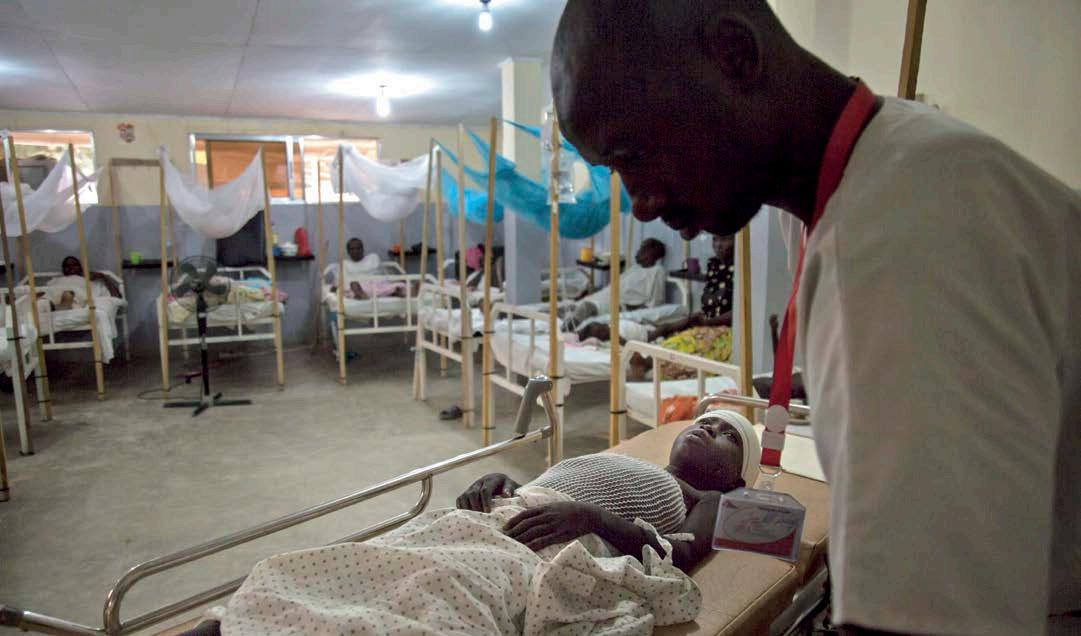
INDIA CENTRAL
In the Central African Republic (CAR), renewed conflict and extreme levels of violence against civilians led to mass displacement and acute humanitarian needs.
MAMBÉRÉ-KADÉÏ
Project locations funded by Australian donors
FUNDING: TOTAL MSFA
$30,272,181 $3,225,091
FIELD STAFF: 1,146
KEY MEDICAL FIGURE: 5,500 births assisted in Berbérati
In 2017, non-state armed groups controlled 14 of the 16 prefectures in this country of 4.5 million people. Thousands of civilians fled their homes because of fighting and violent attacks against them, taking the number of people displaced in recent years to 688,000 – around 15 per cent of the population. In neighbouring countries, the number of refugees from CAR rose to 545,000.
The conflict directly affected the population’s access to medical care, food, water, shelter and education, and left them in a state of extreme vulnerability. Brutal murders took place, including summary executions, some of which were witnessed by Médecins Sans Frontières staff.
In 2017, Médecins Sans Frontières continued to offer outpatient and inpatient care to local communities and internally displaced people in three
prefectures and the capital. In Paoua (Ouham-Pendé), Carnot and Berbérati (Mambéré-Kadéï), Bria (Haute-Kotto) and Bangui, the team provided basic, specialised and emergency care, as well as maternity and paediatric services.
A field worker story from CAR
Even though I have been a doctor for nearly eight years and I thought I’d seen my fair share of sick kids, it turns out I hadn’t seen anything ‘til I got here. CAR is one of the poorest, hungriest countries in the world, with one of the highest infant mortality rates. The majority of kids who come through my emergency department are much sicker than any child I’ve ever seen in the west, and have diseases I’ve only read about in textbooks. Many are malnourished and weak before they even get sick, and live far away in camps for displaced people where they are visited occasionally by our mobile outreach clinics, so they’re usually desperately unwell by the time they reach us. A 19-year-old mother cycled 100km with her 3-week-old baby to get to us the other day.
FROM: Byron Bay, NSW
FIELD ROLE: Medical doctor, Bria, February to June 2017
It’s a beautiful country but a brutal place to be a child, with tetanus, pneumonia, TB, starvation, diarrhoea and malaria all on the cards. The children survive through a pervasive resilience and cheerfulness, and for every death there are dozens who pull through who I’d never have imagined could recover. They show me that being here and trying to swim against the overwhelming tide of childhood disease isn’t always a completely pointless, thankless task after all.
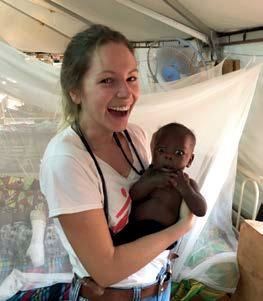
© MSF
KEY ACTIVITIES: HIV/AIDS care, maternal healthcare, nutrition, paediatrics, sexual violence care, surgery
in a number of locations such as the PK3 displacement site.
The security situation in Paoua deteriorated considerably at the end of December. Fighting on the outskirts of the city displaced more than 65,000 people and forced Médecins Sans Frontières to end its support to seven health centres. Until then, the team had been running a primary and secondary healthcare program, and had treated more than 1,000 patients for snakebites. Overall in 2017, the team conducted 78,782 outpatient consultations.
In Bangui’s first district hospital Médecins Sans Frontières provided care, including surgery, to victims of violence from the city and the surrounding
prefectures. Teams treated victims of sexual violence and performed 4,128 surgical interventions.
In Carnot, teams admitted 4,074 children to hospital and provided 59,540 consultations in health facilities supported by Médecins Sans Frontières.
Teams continued to provide treatment for HIV/AIDS in CAR. The HIV programs in Paoua and Carnot focused on decentralising antiretroviral treatment at primary healthcare level in challenging and low-resource settings.
Médecins Sans Frontières carried out vaccination campaigns to protect
children from diseases such as diphtheria, hepatitis B, measles and pneumonia in Carnot. In Berbérati, 22,400 women of childbearing age were vaccinated against tetanus, which will also help protect their newborns in the future.
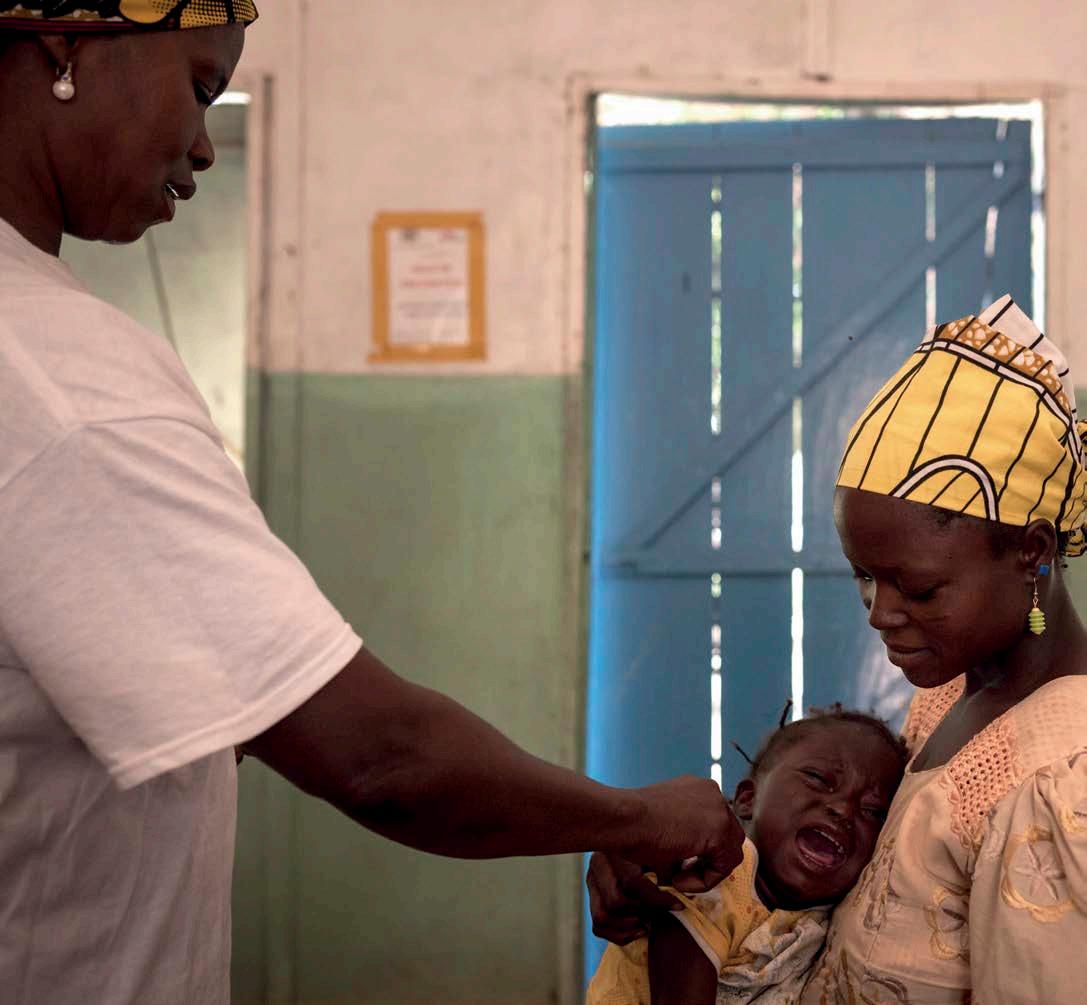
After three years working in the hospital in the prefectural capital, Berbérati, and surrounding health centres, Médecins Sans Frontières handed over its activities to the Ministry of Health in September. Since the beginning of the project, Médecins Sans Frontières had admitted 20,700 children to the hospital’s paediatric unit, treated more than 4,570 children under five years of age for severe acute malnutrition and assisted more than 5,500 births.
A young girl is vaccinated in a health centre supported by Médecins Sans Frontières in Paoua, Central African Republic. © Alexis Huguet Médecins Sans Frontières New Zealand Annual Report 2017 – 25KEY ACTIVITIES:
Malaria care, maternal healthcare, nutrition, primary healthcare
In 2017, violent clashes between armed opposition groups and military forces in the Lake Chad region, near the border with Nigeria and Niger, forced people to flee inland.
FIELD STAFF: 282
KEY MEDICAL FIGURE: 111,757 children protected against malaria
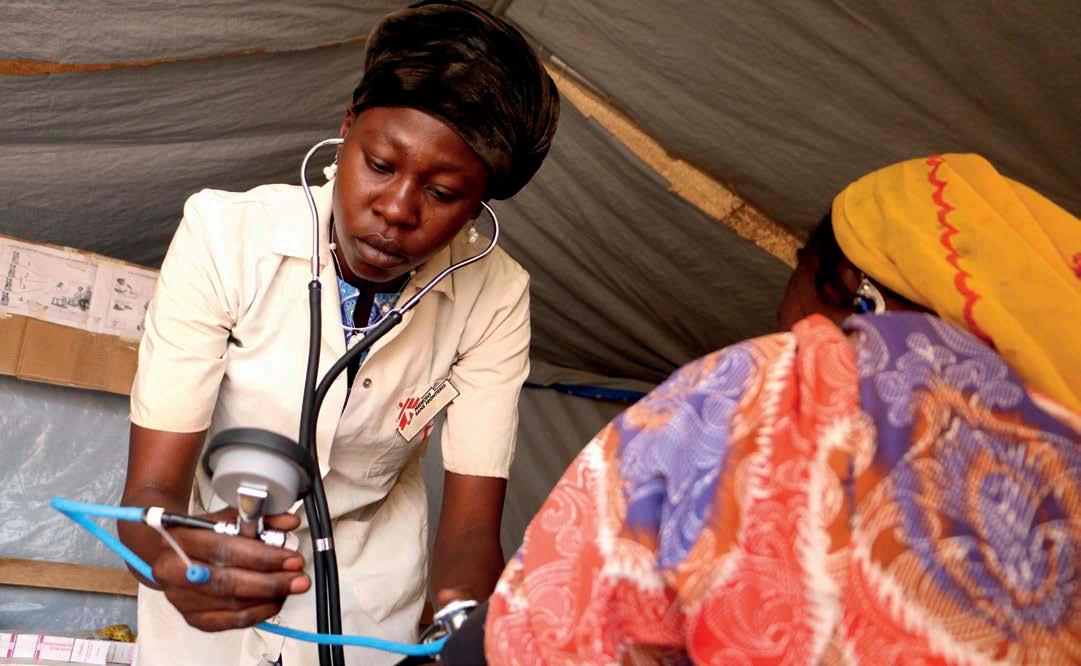
Médecins Sans Frontières continued its projects in Baga Sola and Liwa health districts, in the Lake Chad region, where access to healthcare is extremely limited for local residents as well as refugees and displaced people. Teams run frequent mobile clinics providing primary healthcare, including psychological support and treatment for victims of sexual violence. Médecins Sans Frontières also launched a preventive malaria treatment campaign (seasonal malaria chemoprevention) for children under the age of five. During the year, teams carried out 79,363 outpatient consultations and 6,598 antenatal consultations, vaccinated 12,684 people and screened 11,108 children for malnutrition. Médecins Sans Frontières is constantly developing and applying new strategies to improve its response to emergencies, including malnutrition. For example, in this region, teams trained
mothers to detect malnutrition in their children as early as possible, and also vaccinated malnourished children against common diseases.
Since 2010 in the health district of Moissala, in southern Chad, Médecins Sans Frontières has focused on the prevention and treatment of malaria in children under the age of five and pregnant women. In 2017, four preventive treatment campaigns against malaria reached a total of 111,757 children. Médecins Sans Frontières also supports 22 health centres to manage simple cases of malaria, and to refer other patients to Moissala hospital where our teams run an antimalarial unit for complicated cases.
Médecins Sans Frontières supports maternal and child health in the Hambol region of Côte d’Ivoire.
KEY ACTIVITIES:
FUNDING: TOTAL MSFA $7,577,894 $2,536,110
The political and military crises of 2002 to 2010 have taken a severe toll on the Ivorian health system: according to the World Health Organization, it is one of the weakest in Africa, with only one medical doctor and five midwives per 10,000 inhabitants. As the maternal mortality rate is very high, the Ministry of Health has made maternal healthcare one of its main priorities, offering it free of charge to all pregnant women. However, budgetary restrictions, drug stockouts and a lack of trained health personnel, among other factors, continue to hamper access to good quality medical services for women and young children.
In Hambol region the mortality rate is estimated at 661 per 100,000 live births, according to a 2015 survey by Epicentre, Médecins Sans Frontières’ epidemiological research group. The Médecins Sans Frontières team, in conjunction with the Ministry of Health, aims to improve care for obstetric and
neonatal emergencies in this rural setting by supporting Katiola referral hospital and six primary health centres in the region. In 2017 Médecins Sans Frontières also started to rehabilitate parts of Dabakala hospital, including the operating theatre, in order to improve the management of caesarean sections. Médecins Sans Frontières supports all these facilities with medical supplies and personnel and operates an efficient referral system for complicated deliveries. Training, coaching and supervision of Ministry of Health staff also form a significant part of the program.
Every month in 2017, on average 415 deliveries were assisted in Médecins Sans Frontières supported facilities, including over 40 caesarean sections; and 64 newborns were admitted to the neonatal ward at Katiola hospital.
Albertine cares for her baby in Koutiala hospital, Côte D’Ivoire, two days after her complicated delivery. Albertine was referred from Dabakala, more than 80 km away.
Obstetrician-gynaecologist Dr Rasha Khoury explains Albertine’s case before getting ready to operate. “She needs to have her baby delivered by caesarean section because her baby is bigger than her pelvis. This is a potentially life-saving intervention, because if her labour prolongs she risks a uterine rupture or dystocia [obstructed labour], and both could cause serious, future complications for her. She has already had a caesarean for her first baby, and she took traditional medicine to accelerate the birth this time. In fact, this combination has already caused a partial uterine rupture.” One hour after surgery began, Albertine is out of trouble. Her newborn has survived but had to be resuscitated by a paediatrician and midwife, because his small lungs were filled with meconium [a baby’s first faeces]. He is under care in the neonatal intensive care unit. Says Rasha, “Without the quick referral from Dabakala, the emergency obstetric services here in Koutiala hospital, the trained staff, the blood bank and the newborn unit, mother and baby would probably have not survived.”

Project locations funded by Australian donors
HIV/AIDS care, maternal healthcare, paediatrics, primary healthcare, outbreak response, secondary healthcare, vaccinations
FUNDING:
TOTAL MSFA
$26,346,957 $3,871,078
FIELD STAFF: 428
KEY MEDICAL FIGURE: 78,467 children vaccinated against measles in Nyunzu
Millions of people were displaced in the Democratic Republic of Congo (DRC) in 2017 as new waves of violence erupted.
In Goma, North Kivu province, Médecins Sans Frontières supports the Ministry of Health to provide HIV/AIDS screening in five health facilities. In 2017, 9,380 people were screened. At the end of 2017, Médecins Sans Frontières transferred its activities in the hospital in Rutshuru, North Kivu, to the Ministry of Health. Teams had been supporting the hospital since 2009, and in 2017 performed 6,582 surgical procedures and treated 4,606 people in emergency for malaria.
In the Upper Lomami region, teams responded to an outbreak of cholera in May which affected people in the areas along the lakes of Kabamba and Kibala, and the Lulaba River. Médecins Sans Frontières opened a cholera treatment centre, in which teams were treating 1,568 patients at the end of 2017.
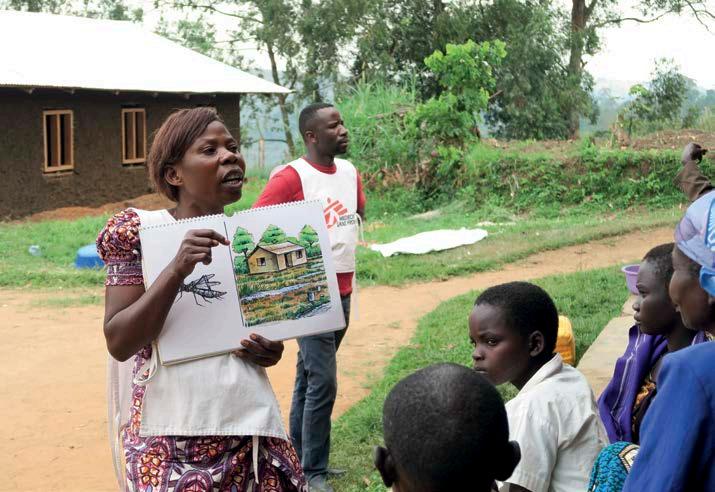
After 11 years working in Gety in Ituri, Médecins Sans Frontières handed over the last of its activities there to the Ministry of Health. Since 2015, our teams had been gradually handing over responsibility for various departments to the ministry and, with over 650 training sessions, had ensured staff have the required knowledge and skills. From 2007, teams conducted 573,200 outpatient consultations, 16,900 postnatal consultations, admitted 42,900 patients to hospital and assisted almost 13,500 deliveries. As well as supporting paediatrics, women’s health, neonatology, emergencies and intensive care, our staff worked to prevent epidemics through vaccination campaigns. Médecins Sans Frontières also helped to rebuild and renovate the regional hospital.
Our team continued to work to bring an outbreak of measles under control in Nyunzu, Tanganyika province. Staff vaccinated 78,467 children against the disease in 2017. The region also remains affected by violence, with around 30,000 people displaced from their homes. Médecins Sans Frontières worked to provide primary and secondary healthcare to refugees and the local community, including management of severe measles cases and the opening of a 21-bed paediatric department. Teams also carried out epidemiological surveillance for measles and cholera.
In July, Médecins Sans Frontières sent a team to the Kasai region, based on reports of extreme violence and displacement of people related to the conflict between the Congolese armed forces and a new armed group. The team were the first representatives of an international organisation to assess the health zones of Dibaya and Thsimbulu. Staff conducted mobile clinics and screening for malnutrition in several health centres run by the Ministry of Health, and donated medical and food items to these health centres.
Bwito, in Rutshuru territory, has seen a resurgence of intercommunal violence since 2016, with clashes between armed groups and with the Congolese army. Civilians continue to be subjected to brutal violence, resulting in forced displacement and a phenomenon of “mono-ethnicity” of certain areas. In the village of Bambu, Médecins Sans Frontières provided 23,058 primary healthcare consultations and supported the paediatric ward and an intensive therapeutic feeding unit in Bambu hospital.
In Haiti, where quality healthcare is unaffordable for the majority, Médecins Sans Frontières provides free, specialised medical care to burns patients.
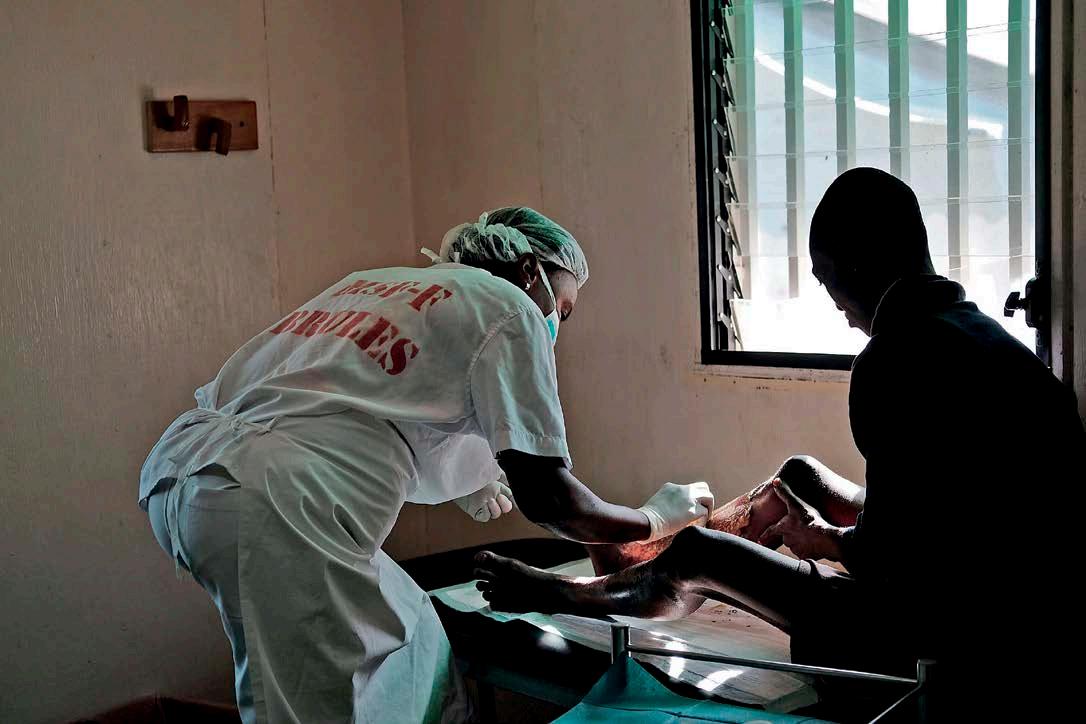
In the capital Port-au-Prince, Médecins Sans Frontières is working in Drouillard hospital, close to Cité Soleil slum. Drouillard is the only specialised centre in the country to focus on the treatment of severe burns – a widespread problem mostly linked to the dire living conditions of destitute Haitians. Around half the patients are children under the age of five who have been injured in domestic accidents. In 2017, the team conducted more than 1,300 emergency room consultations and admitted almost 700 patients. Treatment included surgery, dressings and pain management, as well as physiotherapy, psychological care
and infection control. In one innovative technique, patients were treated with grafts of artificial skin. Most patients came from the Port-au-Prince area, but some were referred from other regions by air ambulance. Médecins Sans Frontières also trained medical staff and started constructing a new 40-bed hospital to replace the existing temporary facility in 2018.
Droulliard is the only specialised centre in Haiti to focus on the treatment of severe burns.
KEY
Honduras continues to experience high levels of political, economic and social instability, and has one of the world’s highest rates of violence. Women are among the worst affected by the medical, psychological and social consequences.
FUNDING: TOTAL MSFA
$1,688,904 $544,238
FIELD STAFF: 30
KEY
In March 2017, Médecins Sans Frontières started working at a mother and child clinic in Choloma, a rapidly expanding industrial city in northern Honduras that is notorious for its high levels of violence. Until Médecins Sans Frontières opened the project, there were few health facilities catering for the needs of women in the area. Many pregnant women were not receiving antenatal care and delivery services remained extremely limited. The result was a high rate of medical complications among women of reproductive age.
Médecins Sans Frontières teams in Choloma provide family planning, ante- and postnatal consultations, assist births, and offer psychosocial support to victims of violence, including victims of sexual violence. In collaboration with the Ministry of Health staff, 19,271 outpatient consultations were carried out. In October, Médecins Sans Frontières began implementing its strategy for the prevention of unsafe abortion practices through activities such as family planning, counselling, contraceptive services and sexual violence prevention.
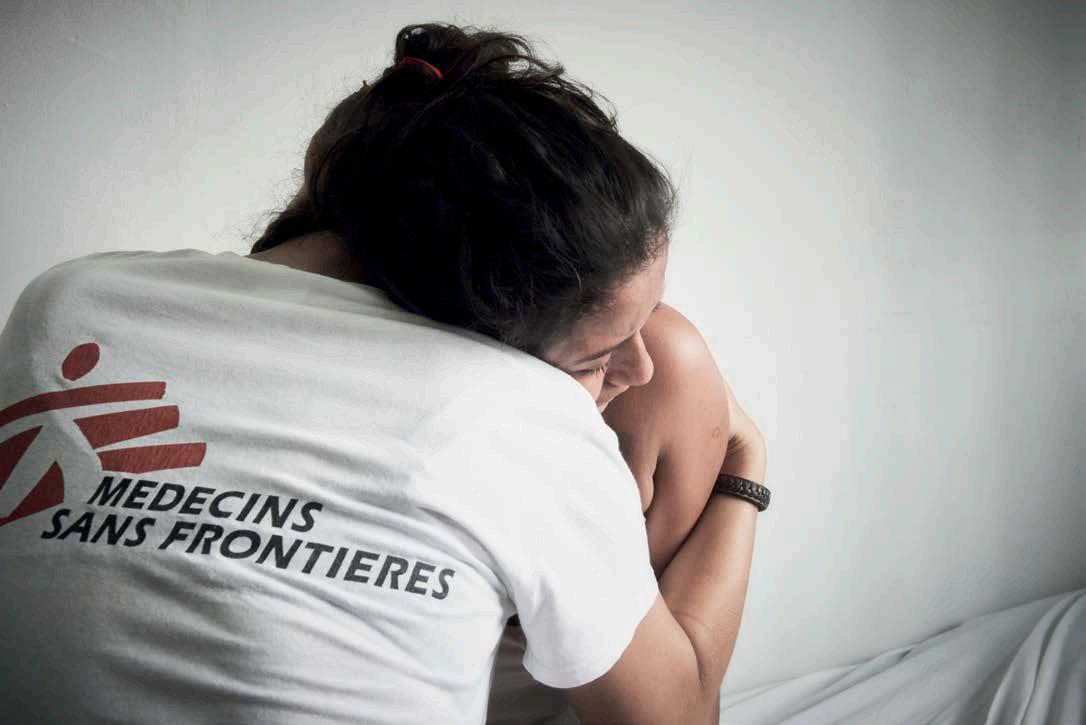 CHOLOMA
CHOLOMA
Our teams in Choloma provide family planning, ante- and postnatal consultations, assist births, and offer psychological support to victims of violence.
Project locations funded by Australian donors
KEY ACTIVITIES:
FUNDING:
TOTAL MSFA $2,769,767 $1,621,928
FIELD STAFF: 40
KEY MEDICAL FIGURE: 19,575 outpatient consultations
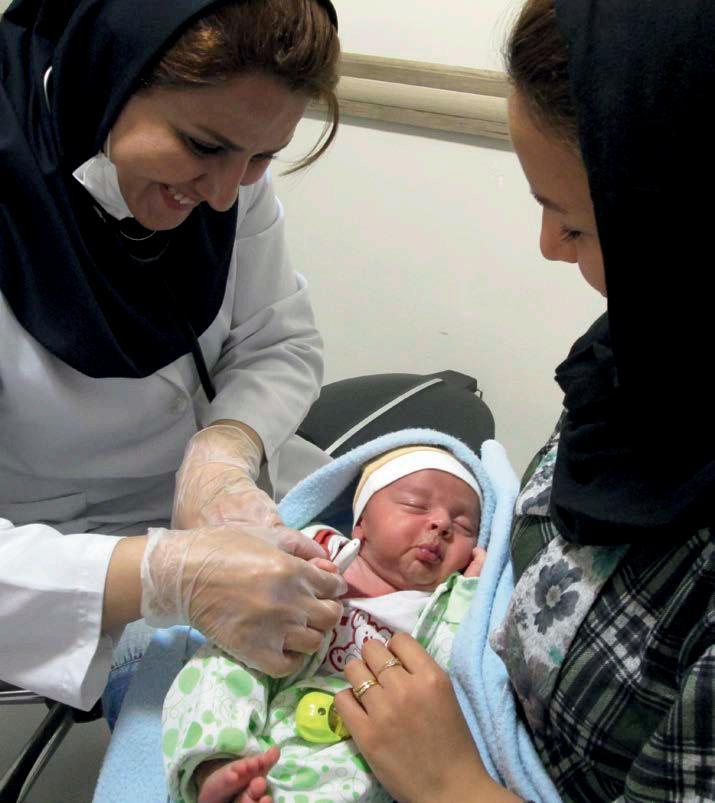
and treatment for sexually transmitted infections. Patients can also be tested for communicable diseases such as HIV, tuberculosis and hepatitis C. Médecins Sans Frontières treats hepatitis C patients with direct-acting antivirals, which are effective and welltolerated drugs, with a course of only three months. The team also operates a referral system, and runs mobile clinics in partnership with Society for Recovery Support, a local organisation which specialises in support for addicts and provides psychosocial assistance, harm reduction and shelter. In 2017, teams conducted 19,575 outpatient consultations and 3,495 individual mental health consultations in fixed and mobile clinics. A total of 218 patients were referred for care, and 45 started
treatment for hepatitis C. Iranian authorities accepted a proposal for a new project to address drug issues among the Afghan community in Mashhad, which will be launched in early 2018.
Médecins Sans Frontières offers medical services designed for high-risk patients who experience stigma, or need more help to follow their treatment.
Médecins Sans Frontières New Zealand Annual Report 2017 – 31
A baby receives care in the primary healthcare centre in Tehran, Iran. © Samantha Maurin /MSF, 2013Hepatitis C care, HIV/AIDS care, mental healthcare, sexual and reproductive healthcare
KEY ACTIVITIES:
Mental healthcare, paediatrics, primary healthcare, secondary healthcare, sexual and reproductive healthcare, surgery
FUNDING:
TOTAL MSFA
$36,703,111 $2,609,006
FIELD STAFF: 654
KEY MEDICAL FIGURE: 26,770 mental health consultations in refugee camps
The conflict in Iraq continued to take its toll in 2017, killing, injuring and displacing thousands of civilians. Many health facilities were destroyed, leaving the sick and wounded with no access to care.
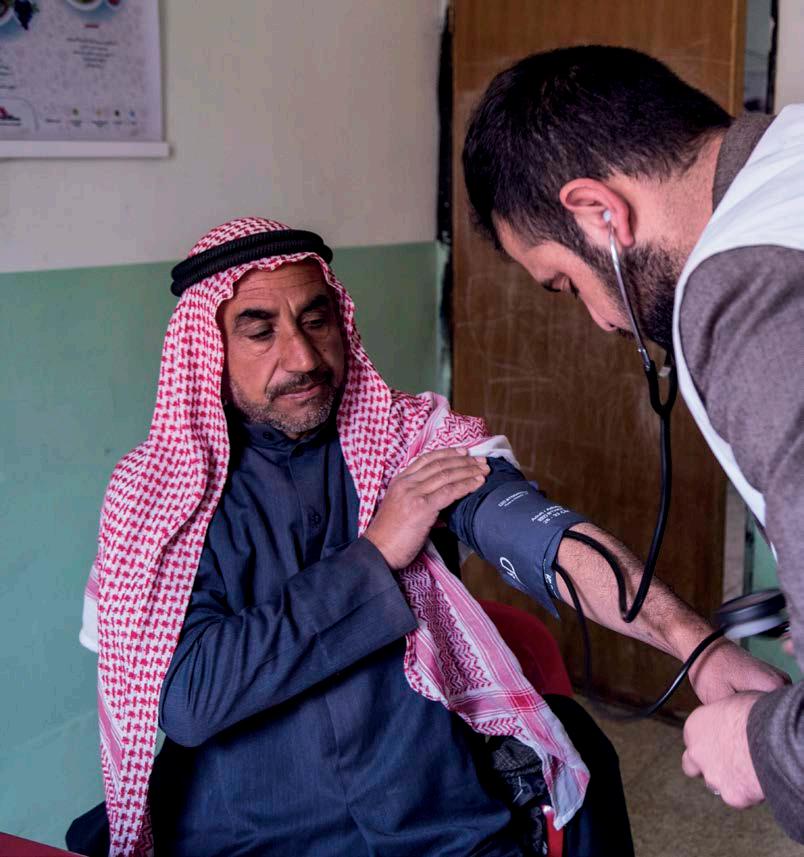
Although the conflict subsided in late 2017, humanitarian needs in Iraq remain extremely high. More than 2.9 million people have still not been able to return to their homes.
In the battle to recapture Mosul, many civilians were killed and wounded in the city or while trying to flee, due to explosions, bombings and shooting. People fled east of Mosul, settling in camps in the governorates of Erbil and Ninewa where access to healthcare was extremely limited.
Camps for displaced people
Médecins Sans Frontières operated in 16 locations in Erbil and Ninewa governorates, delivering medical
assistance to people living in displacement settlements after having fled the violence. Teams provided primary healthcare, treatment for non-communicable diseases (NCDs) such as diabetes and hypertension, and mental health support, including psychosocial counselling and child therapy. Overall, teams carried out 25,168 primary health and noncommunicable disease consultations and 26,770 mental health consultations.
Qayyarah
Médecins Sans Frontières’ field hospital in Qayyarah operated at full capacity, providing surgery, emergency and inpatient care, paediatric medicine, nutrition and mental health support.
SAUDI ARABIA SYRIA TURKEY IRAN NINEWA MOSUL ERBIL BAGHDAD IRAQIn displacement settlements teams provided primary healthcare, treatment for non-communicable diseases and mental health support.A consultation in a mobile clinic near Zummar, Iraq. © Louise Annaud/MSF Project locations funded by Australian donors
Teams treated more than 1,000 emergencies in the first month, carrying out over 90 surgeries. Following the end of the offensive on Mosul, the number of war-wounded patients decreased, and teams mainly received paediatric and burns cases referred from other health facilities in the region. In 2017, our teams provided 14,306 emergency consultations, carried out 2,854 surgeries and admitted 1,421 patients to hospital. In February, Médecins Sans Frontières managed the emergency department of a trauma stabilisation post in Hammam Al-Alil, 30 kilometres south of Mosul. In that month, teams received a total of 1,895 patients.
At Gogjali trauma stabilisation post, our teams received 1,077 emergency cases in three months, including
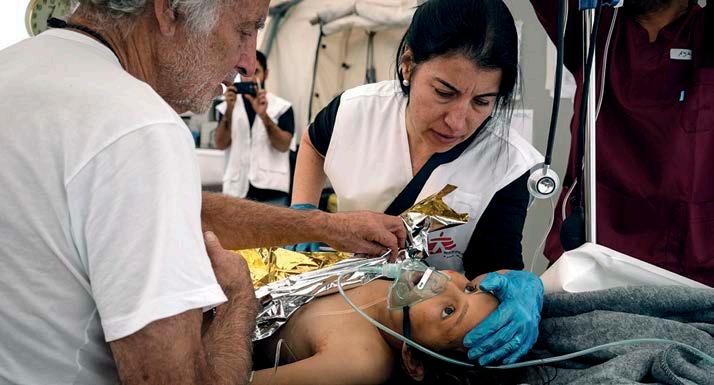
NAME: Kevin Baker
FROM: Sydney, NSW
FIELD ROLE: Anaesthetist, Mosul/ Hammam Al Allil, March to April 2017
Our health facilities in Iraq are remarkable, with all the required surgical and anaesthetic equipment. There’s one operating theatre in a shipping container on the back of a truck, a second operating theatre in a tent, and a recovery room with an intensive care unit, where we maintain patients before transferring them. The injuries we were seeing were predominantly gunshot wounds. There was a shocking number of children under 15. Many of these kids weren’t hit by a stray piece of shrapnel, but appeared to suffer sniper wounds – it seemed they had been intentionally hit. That was the most dramatic thing about this field placement: kids being shot, even toddlers being shot. That was an emotional experience for the team, and there were plenty of tears shed, including my own.
people injured by explosions and artillery fire. Teams established a 17bed maternity hospital in Karama, a region deprived of access to maternal and newborn healthcare. Staff assisted 482 deliveries before the closure of the project in mid-July. Médecins Sans Frontières also supported Al Taheel Hospital from March to August, where teams undertook 1,403 emergency consultations, mainly related to trauma, and performed 1,827 dressings and 489 surgical interventions.
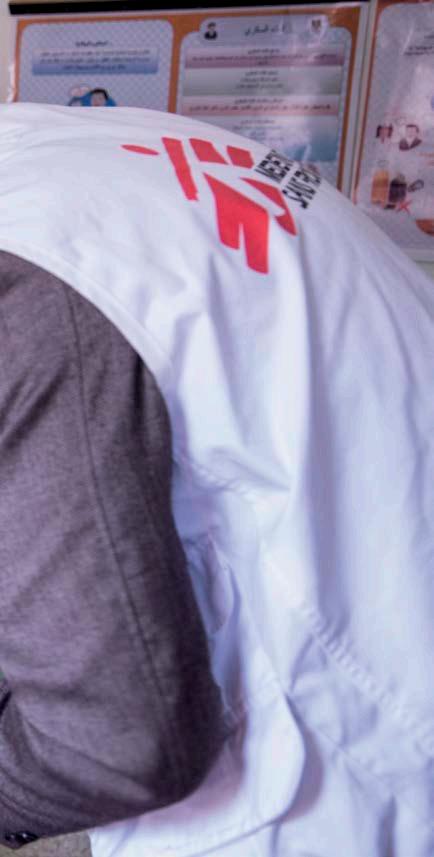
In August, Médecins Sans Frontières opened a rehabilitation centre with a 20-bed inpatient department in Baghdad, to provide physiotherapy, pain management and psychological support to civilian war victims. Teams carried out 714 outpatient and 520 inpatient physiotherapy sessions.
In Zummar, north of Mosul, Médecins Sans Frontières continued to run a maternity clinic, an emergency room and a paediatric inpatient department at Tal Maraq Hospital. The team offered sexual and reproductive healthcare and referrals for complicated cases. In addition, mobile clinics were deployed to neglected communities in Tal Afar district to provide primary healthcare, including treatment for non-communicable diseases. After the Kurdish referendum in September and the subsequent border changes in that region, communities previously cut off from medical care suddenly had access to the Zummar clinic. This resulted in a sharp increase in the number of people seeking help, and the team conducted a total of 10,600 sexual and reproductive health consultations and assisted 2,881 deliveries.
©Alice MartinsProject locations funded by Australian donors
KEY ACTIVITIES: Mental healthcare, neonatal care, sexual and reproductive healthcare, surgery
TOTAL MSFA
$29,597,296 $4,562,561
FIELD STAFF: 238
KEY MEDICAL FIGURE: 16,000 antenatal consultations
There are almost 650,000 registered Syrian refugees in Jordan, the majority of whom rely on humanitarian assistance to meet their basic needs. The huge growth in the number of people has placed increased pressure on the health system.
Médecins Sans Frontières is the main provider of reproductive healthcare for Syrian refugees in Irbid governorate, where we run a 22-bed maternity department and a neonatal intensive care unit. This year, the teams assisted 4,120 deliveries, admitted 664 newborns and carried out some 16,000 antenatal consultations. We also increased our focus on mental healthcare, offering support to Syrian children and their parents in a project based in Mafraq, as well as through outreach consultations and sessions held at the non-communicable disease clinics and primary healthcare centre in Irbid. The various teams provided individual and group counselling, psychosocial support and health education sessions.
Médecins Sans Frontières also continued to support medical facilities in southern Syria from Jordan through medical donations, technical support and distance training.
The Amman reconstructive surgery hospital continues to treat war-wounded patients and indirect victims of violence from neighbouring countries. The hospital provides comprehensive care for patients requiring orthopaedic, reconstructive and maxillofacial surgery, including physiotherapy and mental health support. In 2017, 1,150 surgical procedures were performed, and an average of 188 patients were being treated in the hospital at any one time.
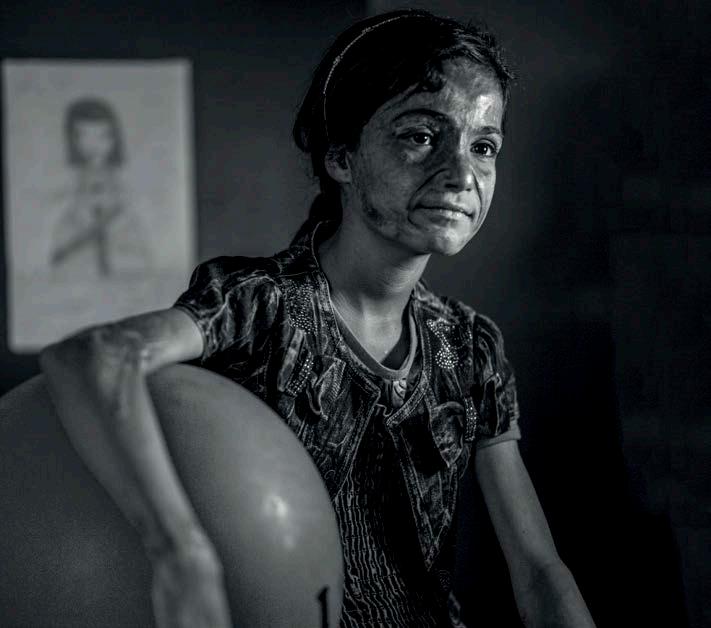
Before coming to Jordan, Manal had had no surgery. She had difficulty closing her right eye, which stayed slightly open while she slept, disturbing her rest. In Médecins Sans Frontières’ hospital in Amman, the physiotherapists massage her eye and teach her how to do it on her own. Since having surgery and intensive physiotherapy, Manal is able to close her eyes and sleep properly, as well as use her hands to pick out tunes on the guitar.
© Alessio Mamo
KEY ACTIVITIES:
In 2017, Médecins Sans Frontières continued to provide much-needed medical care in Kenya’s refugee camps and slums, while also responding to public health challenges including infectious disease outbreaks across the country.
FUNDING:
TOTAL MSFA $20,688,007 $5,039,866
KEY
Many public health facilities were closed and thousands of people were left without access to essential healthcare for a large part of the year due to strikes by health workers – doctors for the first three months of the year, followed by nurses from June until November. This had a knock-on effect on Médecins Sans Frontières’ activities, increasing the number of patients presenting at our facilities and putting a strain on resources. In response, Médecins Sans Frontières set up additional medical facilities and offered financial assistance for patients needing specialised care in private clinics, which they could not otherwise have afforded.
Nairobi
Médecins Sans Frontières continues to offer treatment to victims of sexual violence in the capital through its project in Eastlands. In recent years, the team has recorded an increase in the number of people treated; rather than a rise in the
number of incidents, this could be a result of outreach campaigns by our teams and the local community, making people more willing to come forward.
More than 24 per cent of the population of Homa Bay county is HIV positive – the highest rate of HIV infection in the country. Médecins Sans Frontières supports both inpatient and outpatient services in 33 facilities in Ndhiwa subcounty, in addition to two wards for patients with advanced HIVrelated diseases. Our teams work with the Ministry of Health and local communities to run outreach services, including door-to-door visits, testing and counselling, to reduce the spread of HIV and the number of deaths from HIV-related diseases. Médecins Sans Frontières also supports the TB ward at Homa Bay county referral hospital, treating patients with both drugsensitive and drug-resistant strains of the disease.
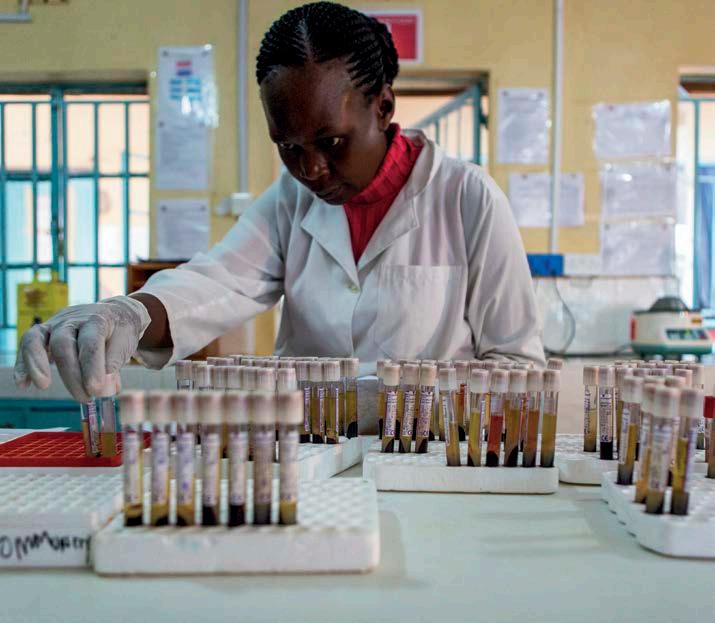
In 2017, Médecins Sans Frontières implemented sexual and reproductive healthcare services and comprehensive emergency obstetric and neonatal care at the Mrima health facility in Likoni sub-county. A temporary container village was set up to accommodate the inpatient department, the laboratory and an operating theatre. A total of 7,864 deliveries were assisted in this structure, as well as 1,656 caesarean sections. Previously, pregnant women had to take a ferry across a channel to reach medical services in Mombasa. The ferry often experienced delays, putting the lives of women and their babies at risk. Construction and extension of the existing permanent health facility began in January 2017, and continued throughout the year. The project also has an important outreach component including health promotion activities and support for peripheral health facilities.
In the city of Aidarken, Batken district, Médecins Sans Frontières is supporting the Ministry of Health to deliver care for non-communicable diseases such as anaemia and hypertension. The project, launched in December 2016, aims to provide better diagnosis and management of disease as well as improve mother and
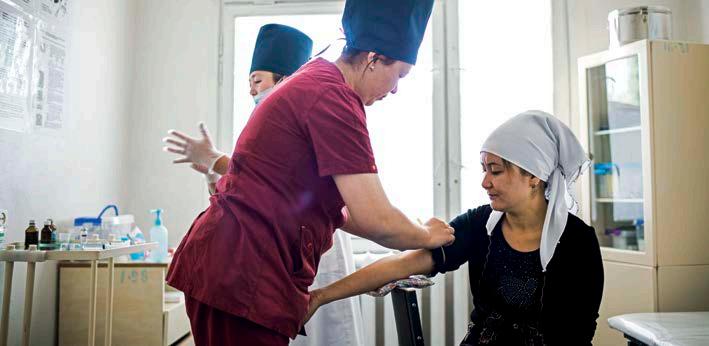
KEY ACTIVITIES: Primary healthcare
FUNDING: TOTAL MSFA $2,222,800 $163,271
FIELD STAFF: 23
KEY MEDICAL FIGURE:
Six primary healthcare centres supported
As neighbouring conflicts continue to spiral, more than one-quarter of Lebanon’s population is now composed of refugees, including over one million from Syria.
This huge influx of people has put an immense strain on the country’s services, such as education, healthcare, housing, water and electricity.
In the Bekaa Valley, where the majority of Syrian refugees has settled, Médecins Sans Frontières opened a paediatric intensive care unit in a government hospital in Zahle
in March. In total we are now providing secondary and tertiary healthcare, general paediatrics and paediatric intensive care, as well as elective surgery. Teams are treating chronic diseases including epilepsy, asthma and thalassemia, a hereditary blood disease. From March, teams conducted 1,400 emergency room consultations.
Sobhiya holds her seven-month-old grandson, Mohamed.
“My daughter, Amera, delivered her son Mohamed at home and not in a hospital, due to the difficult financial situation faced by her family. The size of the baby was very small, and the midwife told the family that Mohamed is not in a good condition.” Mohamed was born in a refugee camp in the Bekaa Valley, where his parents and brother live. Since the baby’s birth, Mohamed’s family hasn’t stopped visiting hospitals. They were relying on money from relatives to pay for each visit, until they heard about the free healthcare offered in the paediatric department run by Médecins Sans Frontières in Zahle. Sobhiya comes to see her grandson in the hospital regularly.
child healthcare through mobile clinics. In parallel, our teams are assessing the possible impact of heavy metal pollution on public health. In 2017 teams supported a total of 1,438 consultations, including 673 non-communicable disease consultations and 765 obstetric consultations.
KEY ACTIVITIES: Paediatrics, secondary healthcare, surgery
FUNDING: TOTAL MSFA $6,514,179 $1,622,946
FIELD STAFF: 82
KEY MEDICAL FIGURE: 1,400 paediatric emergency room consultations
SYRIA ZAHLE BEKAA LEBANONIn 2017, Médecins Sans Frontières continued to focus on the health effects of environmental pollution in the south-west of Kyrgyzstan.A consultation in the Aidarken hospital, Kyrgyzstan. © Maxime Fossat Project locations funded by Australian donors Project locations funded by Australian donors
In 2017, Médecins Sans Frontières prioritised paediatric care and mental health treatment in Liberia.
Médecins Sans Frontières set up Bardnesville Junction hospital in Monrovia in 2015 to support Liberia’s health services during the Ebola crisis. Originally serving children under the age of five, in 2017 the admission criteria were broadened to include patients up to the age of 15. During 2017, staff attended to 7,040 children in the emergency room and admitted almost 6,000 patients, mainly for malaria, severe acute malnutrition and respiratory tract infections.
Bardnesville Junction hospital continued to serve as a teaching hospital, providing placements for nursing students. The team conducted operational research on paediatric health issues, including paracetamol intoxication. In late 2017, an operating theatre was constructed for a paediatric surgery program that opened in January 2018.
In September 2017, Médecins Sans Frontières started to support mental health and epilepsy care at four primary healthcare centres in and around Monrovia. A Médecins Sans Frontières psychiatrist and two mental health clinicians offer guidance on diagnosis and treatment to Ministry of Health personnel at the health centres, and psychosocial workers train volunteers to identify people in the community who need treatment. Médecins Sans Frontières also provides psychiatric and anti-seizure medications. With Médecins Sans Frontières’ support, the health centres carried out 2,446 mental health and epilepsy consultations.
KEY ACTIVITIES: Malaria care, mental healthcare, nutrition, paediatric care, surgery
FUNDING:
TOTAL MSFA
$9,785,829 $640,279
FIELD STAFF: 290
KEY MEDICAL FIGURE: 7,040 children received emergency care
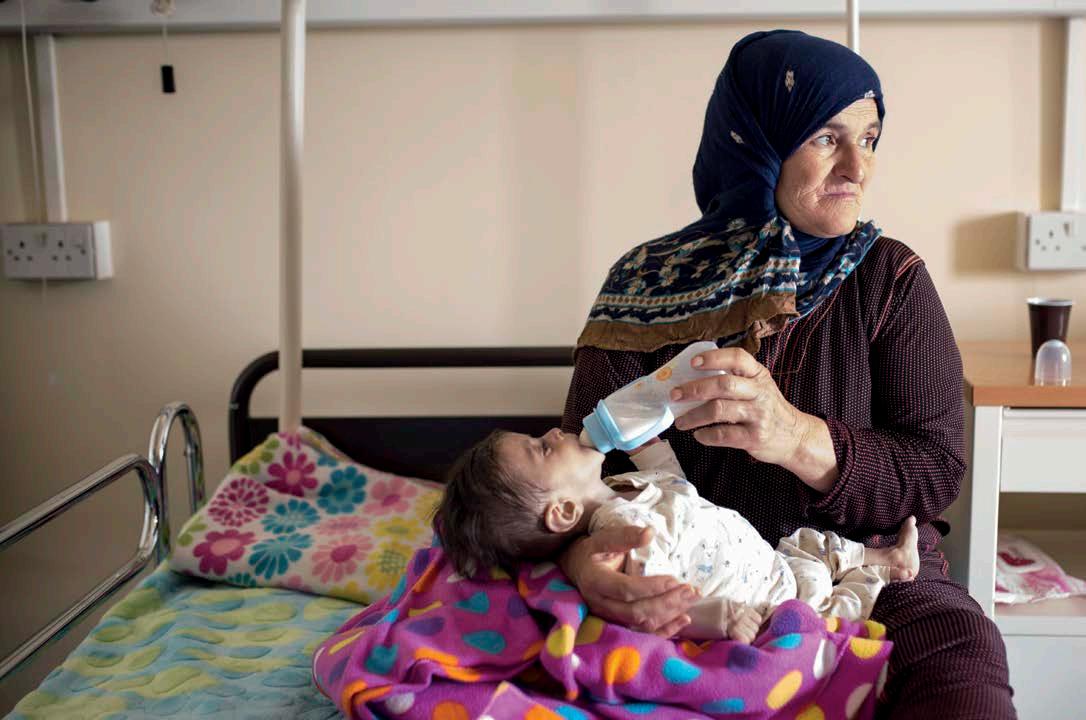 Sobhiya feeds her young grandson in a paediatric intensive care unit run by Médecins Sans Frontières in Lebanon. © Florian Seriex/MSF
CÔTE D’IVOIRE
MONROVIA
LIBERIA
Sobhiya feeds her young grandson in a paediatric intensive care unit run by Médecins Sans Frontières in Lebanon. © Florian Seriex/MSF
CÔTE D’IVOIRE
MONROVIA
LIBERIA
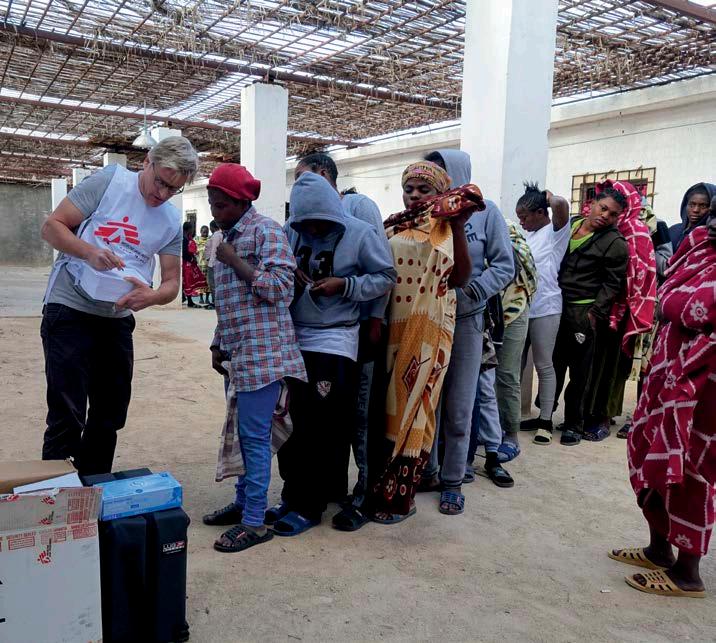
Project locations funded by Australian donors
KEY ACTIVITIES: Mental healthcare, paediatrics, primary healthcare, sexual and reproductive care
FUNDING: TOTAL MSFA $7,827,978 $1,708,383
KEY MEDICAL FIGURE: 1,351 consultations in migrant detention centres
Despite the instability and ongoing conflict, Libya remained a destination for migrant workers from across the African continent and a transit country for migrants, asylum seekers and refugees attempting to cross the Mediterranean and reach Europe.
In 2017, Médecins Sans Frontières provided medical assistance to migrants and refugees arbitrarily held in detention centres that are nominally under the control of the Ministry of the Interior. Most medical complaints were related to the conditions in which people were detained, with overcrowding, inadequate food and drinking water and insufficient latrines resulting in respiratory tract infections, musculoskeletal pain, skin diseases such as scabies infestations, and diarrhoeal diseases. Médecins Sans Frontières publicly called for an end to the arbitrary detention of migrants and refugees in Libya, calling it harmful and
exploitative. Médecins Sans Frontières also denounced European governments’ migration policies to seal off the coast of Libya and ‘contain’ migrants, asylum seekers and refugees in a country where they are exposed to extreme, widespread violence and exploitation.
In Misrata, Khoms and Zliten, medical teams started working in five detention centres, carrying out a total of 1,351 consultations and referring 49 patients for further treatment. The majority of migrants and refugees in Libya live outside detention centres, and like the local communities, they are affected by the deterioration in public health facilities, which face drug and staff shortages. In Misrata, Médecins Sans Frontières opened an outpatient clinic offering primary healthcare and referrals to patients of all ages and nationalities. Médecins Sans Frontières supported the main hospital to improve infection control and also scaled up its response to the needs of migrants and refugees in the area.
In mid-2017, teams also started to work in Bani Walid, reportedly a major transit hub for smugglers and traffickers. In partnership with a local organisation, Médecins Sans Frontières assisted people who had been held captive by criminal networks in the area but had managed to escape. Many had survived kidnapping for ransom, extortion and torture. The team provided 479 medical consultations to survivors and referred 24 patients to hospitals in Misrata and Tripoli.
In the east of the country, Médecins Sans Frontières ran a clinic in Benghazi in collaboration with a Libyan non-governmental organisation, offering paediatric and gynaecology consultations to displaced and vulnerable women and children. In 2017, teams held 12,501 paediatric consultations, and saw 8,798 gynaecology and obstetric cases. Teams also provided mental health support to children and families affected by trauma and violence.
A consultation with female migrants in a detention centre outside of Misrata, Libya. © Tankred Stoebe/MSF
KEY ACTIVITIES:
Cervical cancer care, HIV/AIDS care, sexual and reproductive healthcare
FUNDING: TOTAL MSFA
$4,818,402 $820,501
FIELD STAFF: 138
KEY MEDICAL FIGURE:
2,912 patients younger than 20 years receiving antiretroviral treatment
Alfred, 18 years old,
treatment
The main focus of activities for Médecins Sans Frontières in Malawi continues to be improving care for HIV patients, particularly adolescents and other vulnerable groups.
Since the 1990s, when the HIV epidemic was at its peak in the country, the situation in Malawi has improved greatly but there remains work to be done. By mid-2017, 714,691 people living with HIV were taking lifelong antiretroviral treatment.
Yet HIV remains the leading cause of death among adults in Malawi, and there are still around 28,000 new cases each year. The progress made relies heavily on international funding, and there is a critical lack of qualified health staff.
In Chiradzulu, Médecins Sans Frontières is completing the four-year handover of its HIV activities to the Ministry of Health. However, in 2016, Médecins Sans Frontières studies showed gaps in the detection and timely management of patients failing first- and second-line HIV treatment and revealed that only 30 per cent of adolescents were under effective treatment. Médecins Sans Frontières is developing specific activities
aimed at improving management of these patients and their adherence to treatment. They include setting up comprehensive, multidisciplinary services for adolescents, patients facing difficulties staying on treatment or those not responding to treatment.
Malawi has the highest incidence of cervical cancer in the world, with an estimated 75 of every 100,000 women newly affected each year. Yet only 10 to 20 per cent of women in the country receive early screenings, while preventive vaccination is not implemented.
Médecins Sans Frontières is developing a comprehensive project in Blantyre city and Chiradzulu district, including screening and treatment for precancerous lesions, vaccination against human papillomavirus (the main cause of cervical cancer), treatment for cervical cancer and palliative care.
Debora, 18, is HIV-positive. She is receiving care from Médecins Sans Frontières at Mbulumbuzi Health Centre in Chiradzulu.
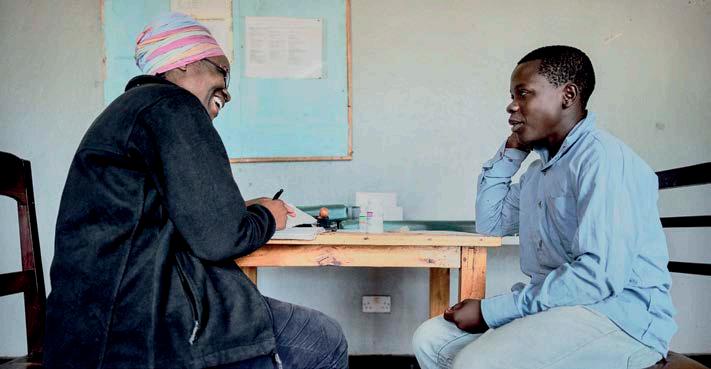
“I feel ok, because I have accepted that I am HIV-positive. With the counselling I received I realised that being HIV-positive is not the end of everything. The main constraint for me is not being able to study at boarding school because I always think how I will be taking my drugs, and how my friends will think of me if they know I am taking ARVs (antiretrovirals). I know that one day I will achieve my dream of becoming a journalist. With proper medication the future is bright.”
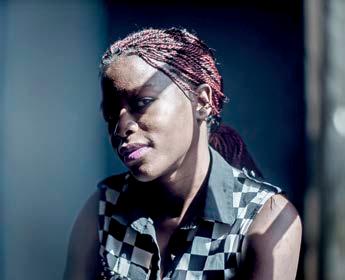 TANZANIA ZAMBIA
BLANTYRE CHIRADZULU
is receiving
for HIV in Chiradzulu, Malawi, where Médecins Sans Frontières is working to improve adherence to antiretroviral treatment for adolescents. © Luca Sola
© Luca Sola
Project locations funded by Australian donors
TANZANIA ZAMBIA
BLANTYRE CHIRADZULU
is receiving
for HIV in Chiradzulu, Malawi, where Médecins Sans Frontières is working to improve adherence to antiretroviral treatment for adolescents. © Luca Sola
© Luca Sola
Project locations funded by Australian donors
KEY ACTIVITIES:
Malaria care, nutrition, sexual and reproductive care, paediatrics
FUNDING:
TOTAL MSFA
$13,883,100 $3,243,857
FIELD STAFF:
489
KEY MEDICAL FIGURE:
2,644 children treated for severe acute malnutrition
Persistent insecurity, particularly in northern and central regions, has resulted in an overall deterioration of the national health system and basic social services in Mali.
In Koutiala, in the south of the country, Médecins Sans Frontières runs a comprehensive paediatric program aimed at reducing the morbidity and mortality of children under the age of five, many of them vulnerable to malaria and malnutrition. As part of the program, which links community and hospital-level care in collaboration with the Ministry of Health, the team supports nutrition services in Koutiala’s main referral hospital and in 15 community health centres. In 2017, 2,644 children were hospitalised for treatment of severe acute malnutrition. In the peak malaria season, from August to November, Médecins Sans Frontières dispatches extra community workers in the health district to identify, manage and refer cases. Our teams are currently constructing a new, 185-bed paediatric care unit to improve facilities in the hospital.
Médecins Sans Frontières provides specialised care in Mozambique, where the frail health system is struggling to curb a dual epidemic of HIV and tuberculosis (TB).
Mozambique has one of the highest rates of HIV prevalence in the world. Around 13 per cent of people aged 15-49 are infected and 34,000 people co-infected with HIV and TB die each year.
In Maputo, Médecins Sans Frontières cares for patients needing second- or third-line antiretroviral treatment and for those with co-morbidities such as Kaposi’s sarcoma, drug-resistant tuberculosis (DR-TB) and hepatitis. Kaposi’s sarcoma is a cancer that particularly affects patients with poor immune function. Médecins Sans Frontières has provided these patients with a new, improved treatment allowing quicker recovery. A total of 1,498 patients were taking this new drug in 2017. Our teams also provide comprehensive care for multidrug-resistant tuberculosis (MDR-TB) and extensively drug-resistant tuberculosis (XDR-TB). A hepatitis C treatment program was scaled up during the year to include
treatment for injectable drug users, focusing on developing a model of care that includes comprehensive harm reduction. Of the 27 patients with hepatitis C who received treatment, 10 were cured – the first in the country as treatment was previously unavailable.
In Ténenkou, teams provide primary and secondary healthcare for women and adolescents. Staff support the maternity ward, operating theatre and the outpatient department at the referral health centre. In 2017, teams conducted 5,597 consultations with women of childbearing age and 2,068 prenatal consultations. Médecins Sans Frontières also supports malaria health workers to manage malaria cases in five health centres during the peak malaria months, and runs mobile clinics offering basic healthcare to hard to reach communities. A total of 5,373 people were treated for malaria.
Médecins Sans Frontières’ project in the regional referral hospital of Timbuktu, which opened in 2012, was handed over to local authorities in April.
KEY ACTIVITIES:
Hepatitis C care, HIV/AIDS care, tuberculosis care
FUNDING:
TOTAL MSFA
$6,489,655 $108,847
FIELD STAFF: 129
KEY MEDICAL FIGURE:
1,498 people received new treatment for HIV and co-morbidities
In Maputo, Médecins Sans Frontières cares for patients needing secondor third-line antiretroviral treatment and for those with co-morbidities such as Kaposi’s sarcoma.Project locations funded by Australian donors Project locations funded by Australian donors
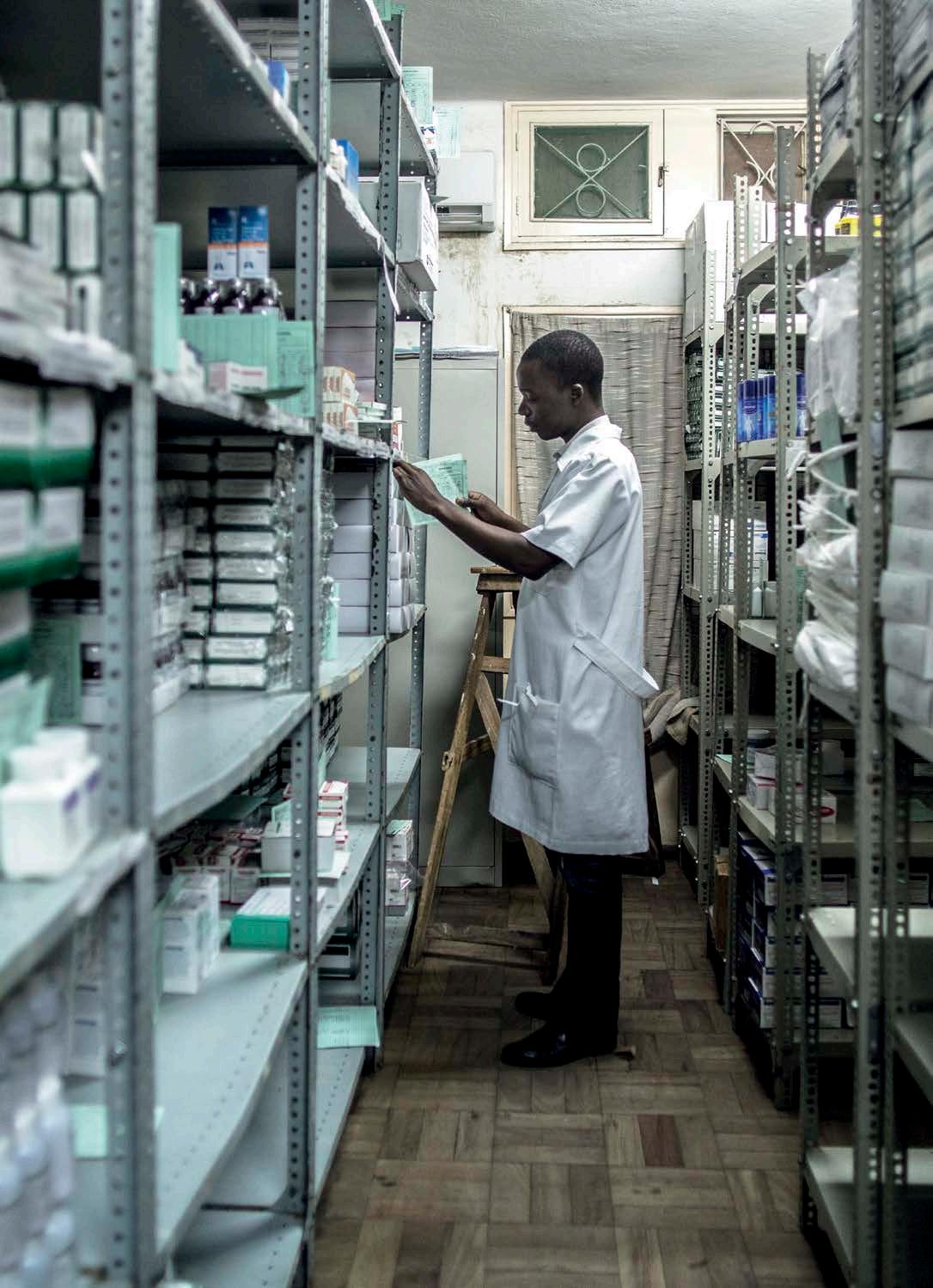
Project locations funded by Australian donors
FUNDING: TOTAL MSFA
$19,497,876 $3,817,952
FIELD STAFF: 759
KEY MEDICAL FIGURE: 14,486 children treated for severe malnutrition
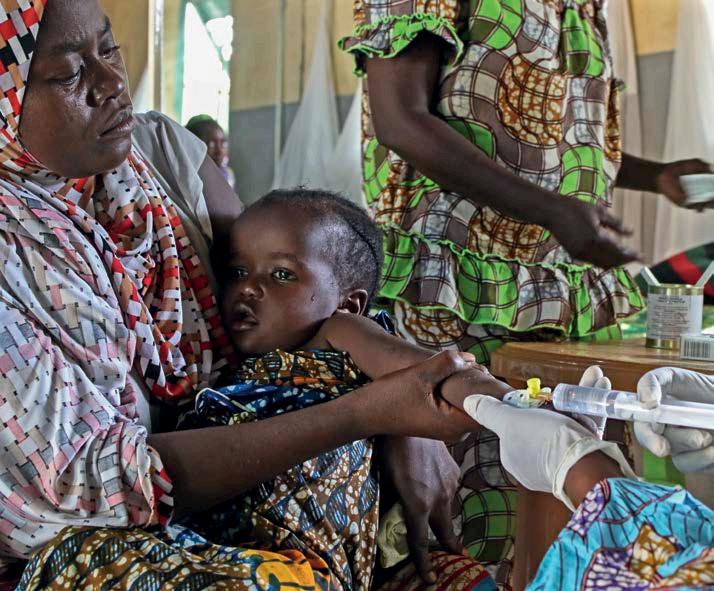
In Niger, Médecins Sans Frontières focused on reducing child mortality, particularly during the peak malnutrition and malaria season, and continued providing healthcare to refugees and displaced people in Diffa.
Every year, people in Niger face the annual ‘hunger gap’ between June and September, when the number of malaria and malnutrition cases increases dramatically. Without early treatment, severe cases can result in medical complications. Médecins Sans Frontières has worked in Magaria, in Zinder region, since 2005, and in 2017 continued to boost the capacity of the paediatric unit in Magaria district hospital by providing staff and training. Between June and December, when the number of admissions for malnutrition and malaria increased, the paediatric unit had a peak capacity of 600 beds. More than 14,849 children under the age of five were treated in the paediatric unit of Magaria hospital in 2017. In addition, Médecins Sans Frontières staff worked in six health centres and one health post to support primary healthcare for children and hospital referrals for the most severe cases. Observation rooms were set up in the busy health centres of Dantchiao and Magaria, where patients were stabilised before being transferred, if necessary, to the paediatric unit in Magaria. Médecins Sans Frontières teams also led awarenessraising sessions in Magaria.
People living in Diffa region, on the border with Nigeria, continue to suffer the consequences of the violent clashes between armed opposition groups in Nigeria and the different military forces in the region. In 2017, Médecins Sans Frontières started supporting MainéSoroa district, providing primary and secondary healthcare to cross-border and mobile populations living between Niger and Yunusari Local Government Area in Yobe state, Nigeria. Teams ran mobile clinics and supported the referral of surgical, paediatric and internal medicine cases to Mainé-Soroa hospital. In total, staff carried out 46,569 consultations in Mainé-Soroa and in Kanama, Yunusari.
In Madarounfa district, Maradi region, Médecins Sans Frontières continues to run its paediatric program focusing on the management of the main causes of childhood death, notably malnutrition and malaria. Mothers also come over the border from Nigeria to seek treatment for their children. The program, which opened in 2001, today comprises inpatient care for severe malnutrition and its complications, malaria and other diseases affecting children under the age of five in the district hospital, and outpatient treatment for severe malnutrition without complications in five Madarounfa health zones. Médecins Sans Frontièressupported community health workers are active in 34 villages during the peak malaria season to ensure early detection and treatment of simple malaria and screening for malnutrition. Our teams have scaled up health promotion and community-based healthcare activities. A total of 14,486 children in Madarounfa district received outpatient care for severe malnutrition in 2017.
Cases of meningitis were detected in Niamey in February and March 2017. The epidemic threshold was crossed in Boukoki, Lazaret and Foulan Koira health areas. Our teams conducted a vaccination campaign in coordination with the Ministry of Health, to immunise 320,000 people in the regions of Niamey, Dosso and Tahoua.
NIAMEY MADAROUNFAKEY ACTIVITIES: Nutrition, paediatrics, outbreak response, sexual and reproductive healthcare, sexual violence care
FUNDING: TOTAL MSFA $32,483,542 $5,085,746
FIELD STAFF: 1,044
KEY MEDICAL FIGURE: 75,676 children vaccinated in Borno
In Nigeria, assisting people caught up in the conflict between armed opposition groups and the military remained a priority for Médecins Sans Frontières in 2017.
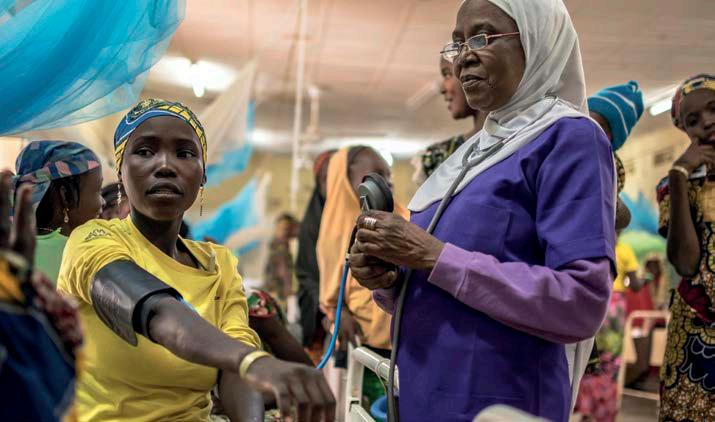
Civilians are bearing the brunt of the conflict, which entered its eighth year in 2017. According to the United Nations, more than 1.7 million people are internally displaced in the northeast of Nigeria. Of these, some 80 per cent are in Borno. Thousands have been killed in the fighting and many more by the deadly combination of malnutrition, measles and malaria. In 2017, Médecins Sans Frontières continued to expand its programs focusing on women and children. It is estimated that 58,000 women die from complications during pregnancy and childbirth every year and one in eight children dies before the age of five.
Médecins Sans Frontières has scaled up its assistance in Borno state over the past two years, but access to areas held by armed opposition groups, or contested by the two sides, has been restricted, and little is known about the needs of people in these locations. Although the nutrition situation has generally stabilised in Maiduguri, capital of Borno state, due to a massive deployment of aid, vulnerable pockets still remain. In some enclaves controlled by the military, people are unable to farm or fish due to restrictions on their movements, making them heavily dependent on humanitarian assistance. Our teams continued to deliver health services for women and children in Maiduguri, providing paediatric consultations,
emergency care and intensive care, outpatient therapeutic nutritional centres, and basic obstetric and neonatal care.
The Borno Emergency Support Team works to reduce the mortality and morbidity of vulnerable people in the region, and to respond to emergency needs. In 2017, the team focused on surveillance, vaccinations, screening for malnutrition, therapeutic food distribution, and water and sanitation activities. The emergency team also responded to a cholera outbreak in Monguno and Maiduguri. In total, staff vaccinated 75,676 children in Borno. In Monguno, also in Borno state, Médecins Sans Frontières admitted 2,280 people for hospital care. Our team also assisted the development of water and sanitation activities in camps for displaced people.
Providing
In the Médecins Sans Frontières-run maternity and neonatal departments of Jahun general hospital, in Jigawa state in the north, a high proportion of the 1,000 women admitted per month in 2017 were suffering from obstetric complications such as eclampsia. Our team also treated 325 women for vesicovaginal fistula, a condition resulting from prolonged obstructed labour that requires complex surgery. To reduce pregnancy complications, teams also support basic obstetric care in health centres.
In the southern Rivers state, in partnership with the Ministry of Health, Médecins Sans Frontières opened a second clinic in Port Harcourt offering comprehensive care to victims of sexual violence. In 2017, the team received 950 new cases. Outreach and community-based awareness activities were also organised in schools, police stations and through the media.
The Emergency team ‘EPrep’, based in Abuja, was created in 2006 to enable Médecins Sans Frontières to react to natural and man-made disasters and epidemics. In 2017, the team responded to the meningitis outbreak in Katsina state, supported the Monguno team in responding to the cholera epidemic, and performed consultations and referrals in mobile clinics in Yobe state.
Access to healthcare remains a challenge in Pakistan, especially for women and children: women die from preventable complications during pregnancy and delivery, and newborn care is unavailable in many parts of the country.
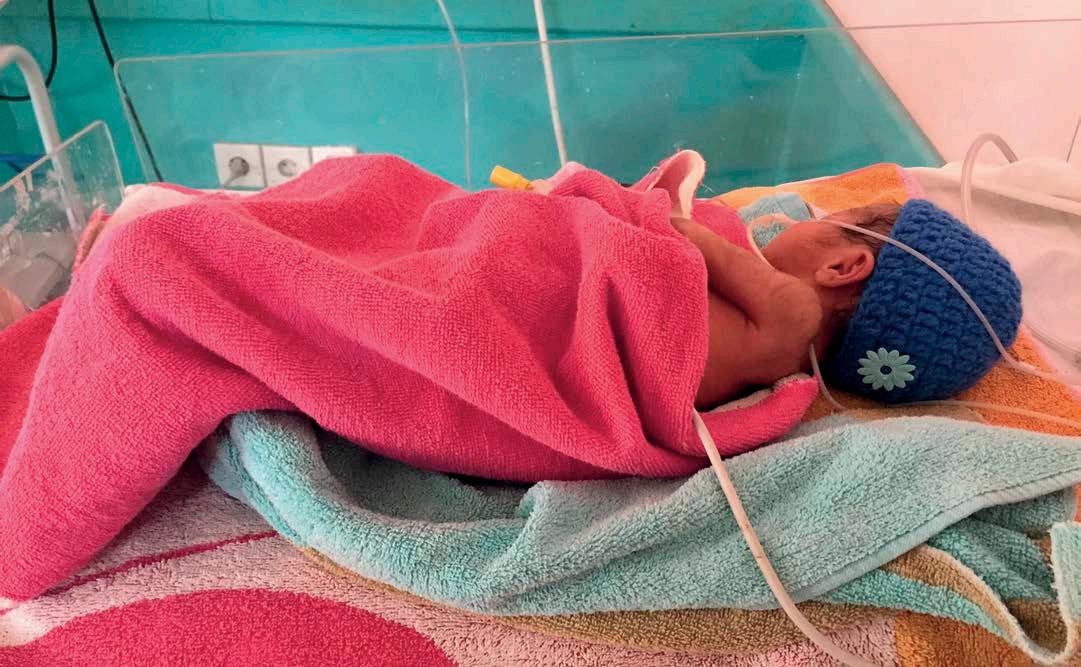
Médecins Sans Frontières continues to fill gaps in healthcare, particularly in isolated rural communities, urban slums and areas affected by conflict.
Khyber Pakhtunkhwa
In Peshawar Women’s Hospital Médecins Sans Frontières operates a comprehensive 24-hour emergency obstetric care service for patients referred from surrounding districts and the Federally Administered Tribal Areas (FATA). The hospital has 24 obstetric beds and an 18-bed unit for premature and severely ill newborns requiring specialised care. In 2017, 3,687 deliveries were assisted, including 489 caesareans.
In September and November respectively, the authorities informed Médecins Sans Frontières that the
certificate required for carrying out medical activities in FATA would not be renewed, but gave no explanation for this decision. It is likely that the closure of these medical facilities delivering free, high-quality healthcare will have serious negative implications for people who rely on them.
Médecins Sans Frontières had been providing medical services in Kurram for 14 years at the time of the closure.
In Sadda, Médecins Sans Frontières was responsible for the paediatric outpatient and inpatient departments. Teams also ran the newborn unit, and treated patients with the parasitic skin disease cutaneous leishmaniasis. In Alizai, our teams ran the paediatric outpatient department and observation room. In 2017, up until closure, Médecins Sans Frontières carried out a total of 26,567 outpatient consultations in Sadda and Alizai.
KEY ACTIVITIES:
Médecins Sans Frontières runs mental health programs offering confidential support in Nablus governorate, where the ongoing occupation and internal violence continue to have a serious impact on the physical and psychological health of the people. They are exposed to both direct and indirect trauma, including violence, raids on their homes and arrests of family members.
Teams also continued to provide mental health awareness sessions in villages in Nablus. The sessions included psychoeducation on stress management as well as mental health stigma and awareness, and individual consultations were offered for those in need. In 2017, Médecins Sans Frontières strengthened its partnership with Nablus Rafidia hospital, providing psychological support to patients admitted to the burns unit and the paediatric ward, to their caretakers, and to supervising medical staff.
Overall, staff performed 2,238 psychological consultations in Nablus in 2017.
A number of factors have contributed to the deterioration in the general socioeconomic situation in Gaza, including the 10-year blockade imposed by Israel and the fighting between the various Palestinian authorities. More than half of the population is unemployed, electricity is restricted to a few hours per day and there is a lack of clean drinking water. People’s movements in and out of the Gaza Strip are extremely limited, preventing them from seeking specialised healthcare.
Médecins Sans Frontières staff work in three clinics in Gaza, providing specialist care for burns and trauma patients, such as dressings, physiotherapy and occupational therapy. In 2017, 4,900 patients were treated, mostly for burns sustained in domestic accidents; 62 per cent of these patients were under 15 years old. Despite the technical experience of our nurses and physiotherapists, their work is complicated by the limited access to essential painkillers in Gaza. To alleviate the suffering of burns patients during the most painful medical procedures, our teams introduced a sedation technique using nitrous oxide mixed with oxygen, known as EMONO. Médecins Sans Frontières continued to run reconstructive surgical programs in conjunction with the Ministry of Health for patients with burns, trauma or congenital malformations and in 2017 performed a total of 411 interventions on 197 patients, 75 per cent of whom were under 18 years of age. The most complex cases that cannot be handled in Gaza are referred to Médecins Sans Frontières’ reconstructive surgery hospital in Jordan (see page 32). However, due to administrative restrictions, only six out of 19 patients could be referred in 2017. Our teams continued to run sessions on burns awareness for schools and women’s associations, giving advice on preventing accidents and lessons in first aid.
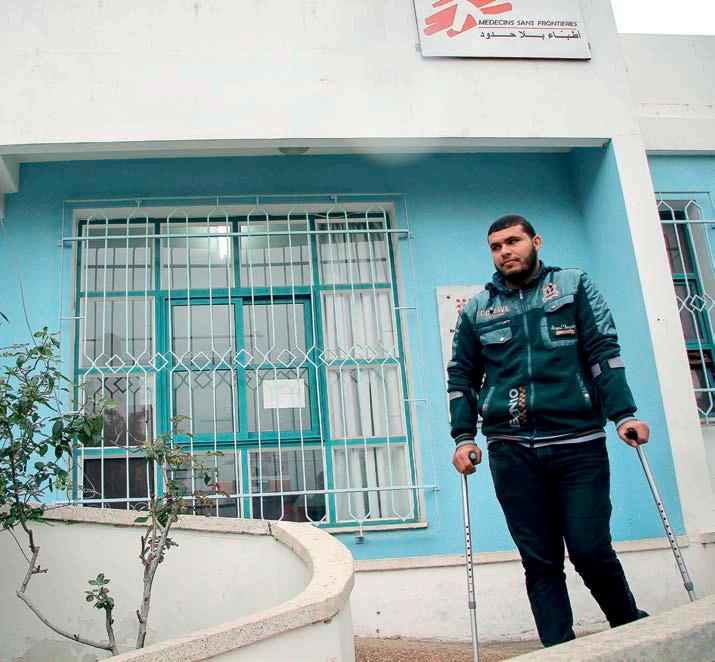 NABLUS GAZA CITY
GAZA STRIP
NABLUS GAZA CITY
GAZA STRIP
KEY ACTIVITIES:
Tuberculosis care
FUNDING:
TOTAL MSFA
$7,237,025 $1,040,519
FIELD STAFF:
152
KEY MEDICAL FIGURE:
More than 2,150 people receiving TB treatment in 2017
In Papua New Guinea, Médecins Sans Frontières focused on expanding access to care and improving adherence to treatment for patients with tuberculosis (TB).
TB was declared a major public health emergency in Papua New Guinea, with almost 30,000 new cases in 2016. It is the fourth-biggest cause of death among hospital admissions, and the principal cause of mortality among HIV/AIDS patients.

In collaboration with the national TB program, Médecins Sans Frontières focuses on improving screening, diagnosis, treatment initiation and follow-up at Gerehu hospital, in the capital Port Moresby. Mobile teams also work in the community to improve patient adherence to treatment.
In Gulf Province, Médecins Sans Frontières expanded its TB program
to support two health centres as well as Kerema general hospital. Difficult access to remote areas and the lack of an effective follow-up system result in a high number of patients not completing their treatment. In collaboration with the provincial authorities, Médecins Sans Frontières continues to develop a decentralised model of care facilitating access to diagnosis, treatment and follow-up closer to patients’ homes.
By the end of 2017, Médecins Sans Frontières had initiated treatment for more than 2,100 patients with drug-sensitive TB, and 53 with drug-resistant TB.
Giakila was five months’ pregnant when she became seriously ill, and ended up losing her baby. “Losing a child was very hard, and I really wanted to know what was going on with me. So we came to Gerehu clinic and they advised me that I had TB.”
Giakila was diagnosed with multidrug-resistant TB, which involves two years of treatment including daily injections in the early stages. “I was scared at first, because there were too many medicines that I was taking. But then it started helping me to recover some of the loss that I encountered, so I was happy taking these medicines.”
A PATIENT’S STORY:
“Losing a child was very hard, and I really wanted to know what was going on with me. So we came to Gerehu clinic and they advised me that I had TB.”
© Sophie McNamara/MSF
KEY ACTIVITIES:
Sexual and reproductive healthcare, sexual violence care, water
FUNDING:
TOTAL MSFA
$3,117,487 $1,132,580
FIELD STAFF: 29
KEY MEDICAL FIGURE:
More than 23,000 girls vaccinated against HPV in Manila
In the Philippines, Médecins Sans Frontières focused on improving access to sexual and reproductive healthcare in slums in the capital Manila, and responded to violent clashes in the south.
Since 2016, Médecins Sans Frontières has partnered with a local organisation, Likhaan, to offer sexual and reproductive health services in two densely populated and impoverished Manila districts, Tondo and San Andres. In 2017, Médecins Sans Frontières and Likhaan moved to a larger clinic in Tondo and carried out an average of 1,380 consultations a month between the two clinics. The Tondo clinic offers family planning services and care for victims of sexual violence, as well as screening and treatment for cervical cancer. In conjunction with Likhaan and Manila City Health our teams also vaccinated more than 23,000 girls against the human papillomavirus (HPV) responsible for cervical cancer.
From June 2017, Médecins Sans Frontières offered psychological first aid and ran water, sanitation and hygiene activities for people displaced by the conflict between the Philippine armed forces and two
At the end of 2017, there were nearly 3.3 million internally displaced people and 772,000 registered South Sudanese refugees in Sudan, as well as many other migrants in transit to Europe.
Sudan has the highest rate of kala azar, or visceral leishmaniasis (a disease spread by sandfly bites), in East Africa, and Al-Gedaref in eastern Sudan accounts for nearly 70 per cent of the national caseload. Médecins Sans Frontières provides free diagnosis and case management support to two hospitals in this region and organises awareness-raising activities in the community. From the end of 2016 to April 2017, the number of cases rose to
a level not seen since 2011. More than 1,300 patients were treated for visceral leishmaniasis in 2017.
Also in Al-Gedaref, Médecins Sans Frontières treated 336 cases of suspected acute watery diarrhoea. Our teams trained staff from partner organisations in case management and prevention, and conducted community education sessions.
pro-Islamic State factions, in Marawi city, Mindanao region. More than 370,000 people were displaced. Teams provided psychological first aid to more than 11,500 people, and distributed 1,500 hygiene kits and 1,150 jerry cans. When the siege of the city was declared over in late October, teams remained in the area to support internally displaced people and returnees.
A young girl from Tondo receives her free HPV vaccination in a Médecins Sans Frontières and Likhaan clinic in Manila, the Philippines. © Hannah Reyes Morales
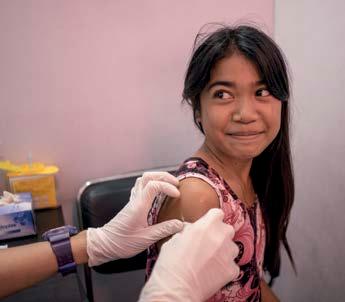
KEY ACTIVITIES: Outbreak response, visceral leishmaniasis care
FUNDING:
TOTAL MSFA $3,280,914 $2,176,952
FIELD STAFF: 40
KEY MEDICAL FIGURE: 1,300 people treated for visceral leishmaniasis
MANILLA MARAWI PHILIPPINESMédecins Sans Frontières provides diagnosis of visceral leishmaniasis and case management support, and organises awareness-raising activities in the community.AL-GEDAREF SUDAN Project locations funded by Australian donors
KEY ACTIVITIES:
Malaria care, maternal healthcare, nutrition, paediatric care, surgery, vaccinations
FUNDING: TOTAL MSFA
$49,277,778 $4,448,923
FIELD STAFF:
688
KEY MEDICAL FIGURE: 101,831 people treated for malaria in remote villages
Throughout 2017, Médecins Sans Frontières responded to emergency medical needs arising from conflict and epidemics, while striving to maintain its existing healthcare programs in South Sudan.
Tens of thousands of people in South Sudan have died and roughly one in three people have been forced from their homes since renewed conflict broke out in December 2013. Two million people have fled to neighbouring countries, while another two million are displaced within South Sudan. Security also remained a major challenge for humanitarians in 2017, as facilities came under attack and it became increasingly dangerous to work in some areas.
In South Sudan, Médecins Sans Frontières operates primary and secondary healthcare programs in hospitals and clinics, runs outreach activities for displaced people and remote communities, responds to emergencies and outbreaks as they occur and carries out preventive activities such as vaccination campaigns.
Fangak
In Fangak, a remote, opposition-held area, Médecins Sans Frontières manages the emergency room, operating theatre and inpatient feeding centre, as well as the paediatric, adult and maternity wards at Old Fangak hospital. In late 2017, the team restarted surgical services, performing 184 surgical procedures in December. The team also opened an outpatient clinic in nearby Phom, where they provided 18,148 consultations, and deployed mobile clinics along the Zeraf River.
Greater Bahr el Ghazal region Médecins Sans Frontières staff manage the paediatric and maternity departments in Aweil state hospital, the only facility providing secondary healthcare in the region. Malaria
remains the main cause of admission; in 2017, 5,767 people were admitted for treatment of the disease. Teams also support five health facilities with testing and treatment for the disease throughout the rainy season. In March, Médecins Sans Frontières closed the mobile clinics we had been operating in Wau and the surrounding countryside as other organisations began medical activities in this conflict-affected area.
In Agok, Médecins Sans Frontières runs the only referral hospital in the area providing primary and secondary healthcare, including surgery for a population of more than 140,000 people. Due to the increased need for specialist healthcare, teams started to rehabilitate and extend the hospital in 2017. The new inpatient department, due to be completed in mid-2018, will provide room for more than 140 inpatients. Overall, 9,806 patients were admitted to the hospital, including 2,162 for treatment in the therapeutic feeding centre. Teams ran a malaria test-andtreat program in remote villages and treated over 101,831 patients with the help of community workers.
Médecins Sans Frontières continues to work in Yida camp for refugees from South Kordofan, Sudan. There, teams manage an inpatient department, an inpatient feeding centre, a neonatal unit and the treatment of HIV and TB. Our teams also work in the Nuba Mountains, South Kordofan, where in 2017 we provided 151,895 consultations and vaccinated 36,709 children.
Dr Rosyln Brooks, from Cooma, NSW, recounts a patient she treated in Lankien, South Sudan. “Here in Lankien, I have seen many conditions that are rare or non-existent in Australia. One morning, I was called to see a four-year-old boy in the emergency room. He was sitting up, mouth half open, drooling and spitting saliva, and struggling to breathe. His throat and upper airway were almost completely obstructed and he had spasms of barking, seal-like cough. This is the typical picture of acute epiglottitis, a life-threatening medical emergency in which there is fever and massive swelling of the throat that can completely block the airway. The boy’s father was wonderful – he sat up supporting his child for several days and nights, while we treated with intravenous antibiotics, corticosteroids and fluids. After about a week, this little boy recovered well and went home, still with a barking seal-like cough, but breathing and eating easily.”
In Agok, Médecins Sans Frontières runs the only referral hospital in the area providing primary and secondary healthcare, including surgery.
In 2017, Médecins Sans Frontières continued to focus on reducing HIV transmission and improving access to decentralised care for people with HIV, tuberculosis (TB) and drug-resistant TB (DR-TB) in Swaziland.
Swaziland has one of the world’s highest rates of HIV, affecting roughly one in three adults. The country also has one of the highest TB notification rates, and 70 per cent of people who contract TB are also HIV-positive. The HIV epidemic is showing signs of stabilising and in recent years the number of AIDS-related deaths has reduced. Based on a 2017 HIV incidence survey, the rate of new infections has almost halved within five years.
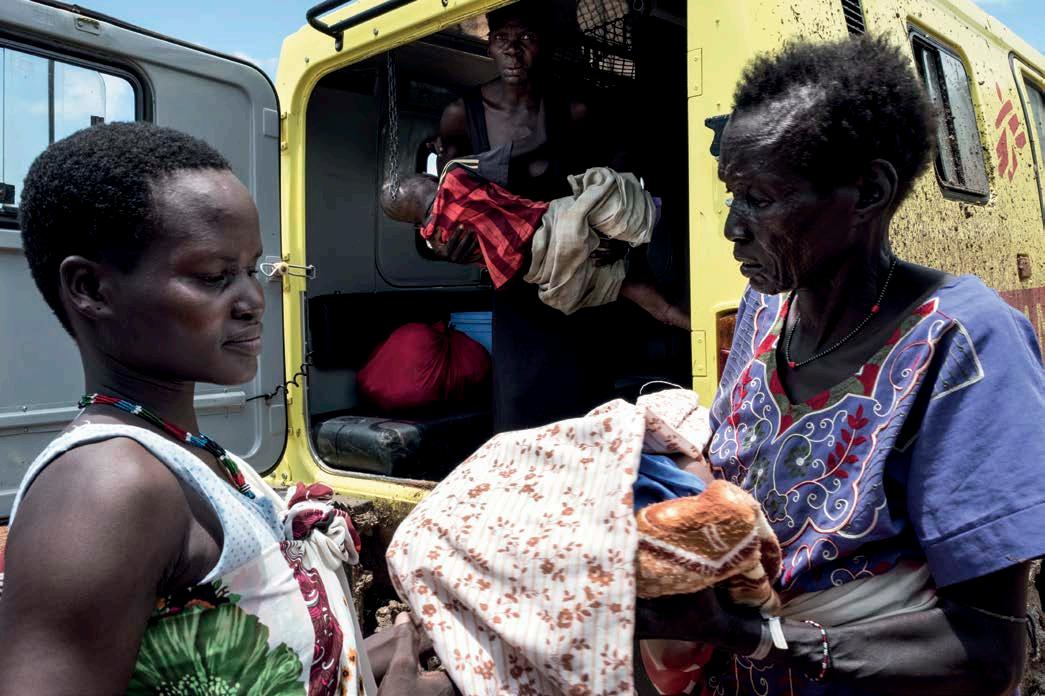
Médecins Sans Frontières’ project in Nhlangano, Shiselweni region, aims to improve the quality of comprehensive HIV and TB care in health facilities and at community level, and provide better management of DR-TB. To help patients stick to their treatment, Médecins Sans Frontières has set up community adherence clubs for adults and children. For people particularly at
risk of contracting HIV, pre-exposure prophylaxis is offered as an additional means of HIV prevention. Overall, 5,886 patients received antiretroviral therapy in 2017. In May, oral HIV self-testing was also implemented in Nhlangano, with a total of 1,328 selftesting kits distributed by the end of the year.
SWAZILAND
KEY ACTIVITIES: HIV/AIDS care, tuberculosis care
FUNDING: TOTAL MSFA $9,169,345 $1,474,885
FIELD STAFF: 147
KEY MEDICAL FIGURE:
1,328 oral HIV self-testing kits distributed
To help patients stick to their treatment, Médecins Sans Frontières has set up community adherence clubs for adults and children.Patients arrive at the Médecins Sans Frontières hospital in Agok, South Sudan, having been transported by special chain vehicle from Mayom. © Peter Bauza SHISELWENI SOUTH AFRICA Project locations funded by Australian donors Médecins Sans Frontières New Zealand Annual Report 2017 – 49
KEY ACTIVITIES:
Burns care, mental healthcare, outbreak response, primary healthcare, physiotherapy, surgery
FUNDING: TOTAL MSFA
$23,321,404 $4,326,138
FIELD STAFF: 250
KEY MEDICAL FIGURE: 13,100 physiotherapy sessions in Atmeh
The conflict in Syria continued into its seventh year, entering new depths of violence and leaving millions of people in desperate need of assistance. Civilians, civilian areas and civilian infrastructure continued to come under direct fire in Syria in 2017. Thousands of people were killed and wounded in military offensives around the country and hundreds of thousands more were forced from their homes by the conflict. Our teams continue to provide medical and humanitarian assistance in Syria but our activities are severely limited by insecurity and constraints on access.
Médecins Sans Frontières always negotiates access with the authorities – official or de facto – in control of an area; but the Islamic State group has not given any assurances since it abducted Médecins Sans Frontières staff in 2014 and the Syrian government has not granted authorisation to work despite repeated requests.
In areas where staff could not be deployed or permanently present, Médecins Sans Frontières maintained its distance support of medical facilities. Mostly run from neighbouring countries, this consisted of donations of medicines, medical material and relief items; remote training of medics inside Syria; and technical medical advice and financial support to cover facility running costs. In 2017, Médecins Sans Frontières supported 23 health facilities, reduced to 14 in June. Up to August, these facilities provided 278,177 outpatient consultations and treatment for 58,187 people with chronic disease.
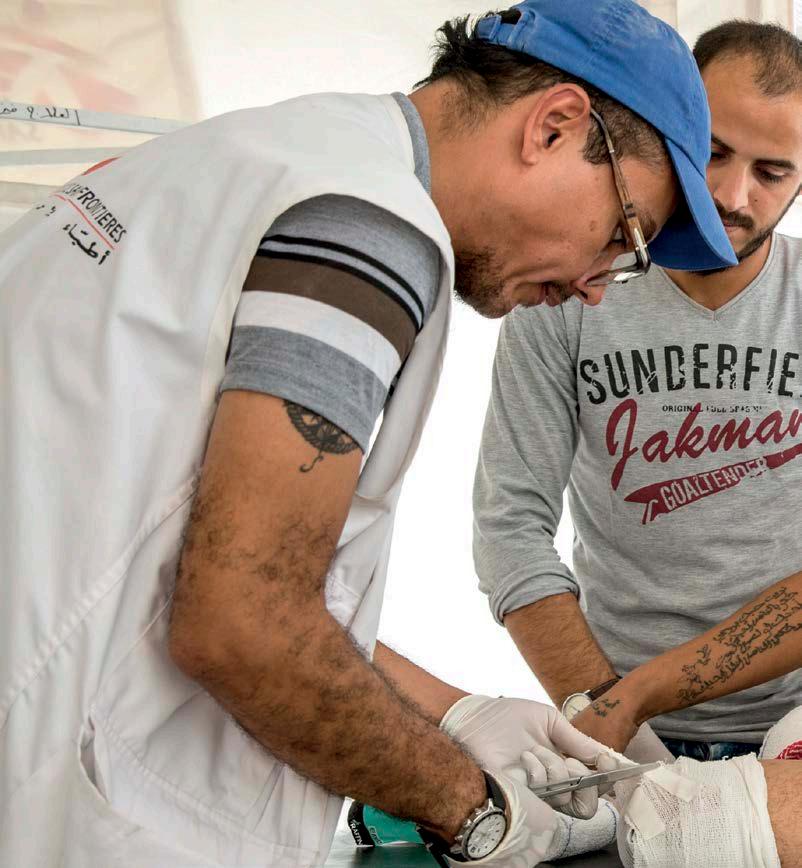
In June, the Syrian Democratic Forces launched an offensive with US-led
international support to take control of Raqqa city. As the frontlines approached the city, civilians became trapped and high levels of insecurity made it extremely difficult to reach those in need. Ain Issa displacement camp, to the north of Raqqa, became an official transit camp for people fleeing the conflict. As arrivals to the camp increased, teams distributed relief items such as mattresses, blankets and hygiene kits, set up water and sanitation services, and responded to a measles outbreak, as well as conducting routine vaccinations. In September, as the camp reached a population of 9,000 people, teams performed an average of 200 consultations each day. The camp reached a population of some 15,000 people by the end of 2017. Médecins Sans Frontières also built a medical and mental health clinic and supported a volunteer-run primary healthcare centre.
In July, Médecins Sans Frontières rehabilitated a primary healthcare centre in Tabqa and started offering medical consultations, mental healthcare and physiotherapy to displaced people. To the north of Tabqa, a team in Twaheenah displacement camp conducted measles vaccinations and provided primary healthcare.
Aleppo governorate
In Kobanê/Ain Al Arab, Médecins Sans Frontières is working with the local health authorities to re-establish basic health facilities, providing outpatient consultations, vaccinations and psychological support. This year, the team built an outpatient department and supported the emergency room, intensive care unit, maternity ward, operating theatre and nursing activities at Kobanê general hospital with supervision, training and drug supplies. The team
provided 10,575 emergency consultations and admitted 1,151 children to the hospital.
Idlib governorate
Médecins Sans Frontières continued to offer specialist care for burns patients at Atmeh hospital, including surgery, skin grafts, dressings, physiotherapy and psychological support. In 2017, staff performed 13,100 physiotherapy sessions and 602 major surgery interventions.
Hassakeh governorate
Intense fighting in northeast Syria resulted in massive displacement, thousands of casualties and severe damage to health facilities. Many injured patients were treated in the emergency room that Médecins Sans Frontières rehabilitated in the main referral hospital in Hassakeh. As in Raqqa, when the violence subsided and people began to return home, the
team saw a sharp increase in the number of patients wounded by explosive devices that had been left or placed in homes, on agricultural land and along roadsides. In 2017, Médecins Sans Frontières treated nearly 3,800 people in the emergency room and performed 563 surgical procedures. Médecins Sans Frontières also ran mobile and fixed clinics in camps for displaced people, focusing on mental healthcare, reproductive healthcare and treatment for non-communicable diseases such as hypertension and diabetes. Teams carried out a total of 15,219 consultations in 2017.
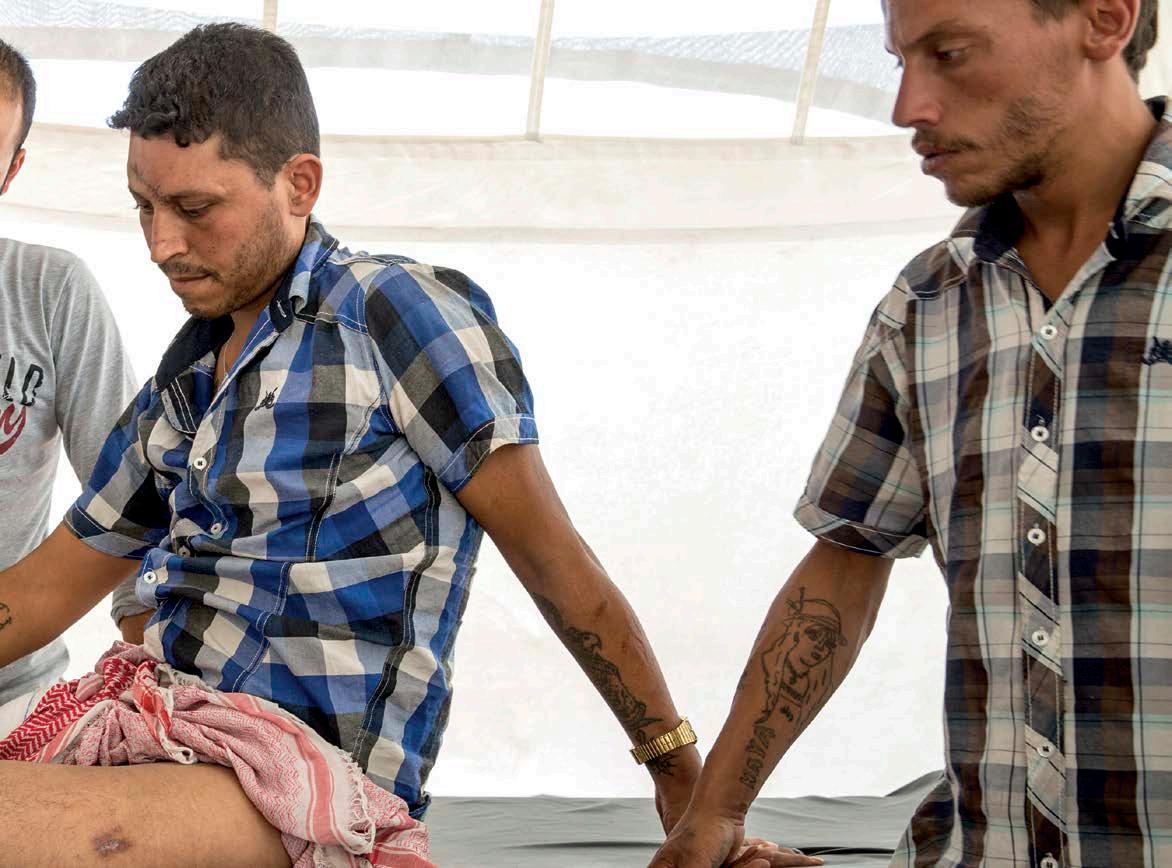 A physiotherapist treats a man who lost both his legs after activating an explosive device while fleeing Raqqa, Syria. © Agnes Varraine-Leca
Médecins Sans Frontières New Zealand Annual Report 2017 – 51
A physiotherapist treats a man who lost both his legs after activating an explosive device while fleeing Raqqa, Syria. © Agnes Varraine-Leca
Médecins Sans Frontières New Zealand Annual Report 2017 – 51
KEY ACTIVITIES:
Malaria care, maternal healthcare, mental healthcare, nutrition, paediatrics, primary healthcare, secondary healthcare, sexual violence care
FUNDING: TOTAL MSFA
$11,503,280 $217,695
FIELD STAFF: 194
KEY MEDICAL FIGURE:
8,888 individual psychological consultations
Throughout 2017, thousands of people fleeing unrest in Burundi continued to cross the border to seek refuge in Tanzania.
In January, the Tanzanian government revoked the prima facie status of Burundian refugees, meaning that automatic refugee status was not granted to new arrivals in the country, and each person had to have their refugee status determined individually.
Although the number of arrivals from Burundi decreased over the course of the year, there were still over 315,000 refugees from the Democratic Republic of Congo and Burundi living in three main camps in the Kigoma district.
In Nduta camp, which was at double its intended capacity with 118,635 refugees at the end of the year, Médecins Sans Frontières was the main healthcare provider. Teams ran a 175-bed hospital, six outpatient health posts and health promotion activities. Hospital services included maternal healthcare, nutritional support, paediatric and adult inpatient departments and an emergency room. In 2017, 18,002 patients were admitted to the hospital and 6,365 births were assisted. Specialised outpatient services, such as treatment for HIV, malaria and tuberculosis, were also provided.
Malaria remained the most common medical problem in the camp, accounting for around one-third of all
NAME: Saschveen Singh
FROM: Perth, WA
FIELD ROLE: Medical doctor, Nduta, Tanzania, April to November 2017
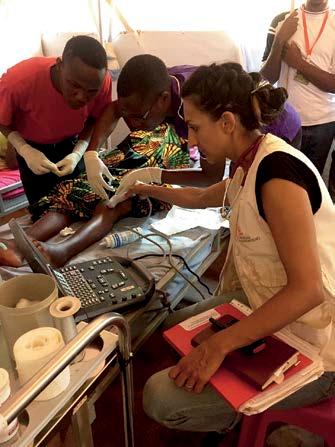
Among the chaos that is a refugee camp, and despite all the limitations and restrictions, there is an incredible sense of teamwork that permeates our activities at our hospital and in the community health posts. The work of the 600-plus staff on the ground here in Nduta is no mean feat, and it never ceases to amaze me how it somehow all comes together each day and keeps an incredible momentum, charged with the collective energies of the people here. Many people are of the misconception that Médecins Sans Frontières is comprised only of doctors and nurses, however the reality is that the medical teams would have no way of reaching the population or administering care without the support of a huge number of other professionals making it happen; no one department could exist or function without the support of another. I’ve been inspired by so many of the people I work with here, in particular our refugee colleagues who have to deal with the reality of living in a tent, but who still come to work every day and give it their all.
outpatient consultations in 2017. Despite the comprehensive malaria prevention and control activities in the camp, including rapid access to diagnosis and treatment, the infection rate remained very high during the rainy season. In December, Médecins Sans Frontières distributed thousands of mosquito nets in areas identified as being high risk due to the concentration of mosquitos and incidence of malaria.
The number of patients with diarrhoea and skin diseases also remained high due to poor living conditions and hygiene in certain areas of the camp.
As a consequence of protracted encampment and a general sense of insecurity and helplessness about the future, mental health needs among the refugees grew significantly in 2017. The main diagnoses were depression, anxiety and psychosomatic disorders. In addition, the number of patients presenting with acute psychiatric conditions at the Médecins Sans Frontières hospital increased throughout the year. Teams performed 8,888 individual psychological consultations throughout the year. Care was also provided for a total of 540 victims of sexual violence.
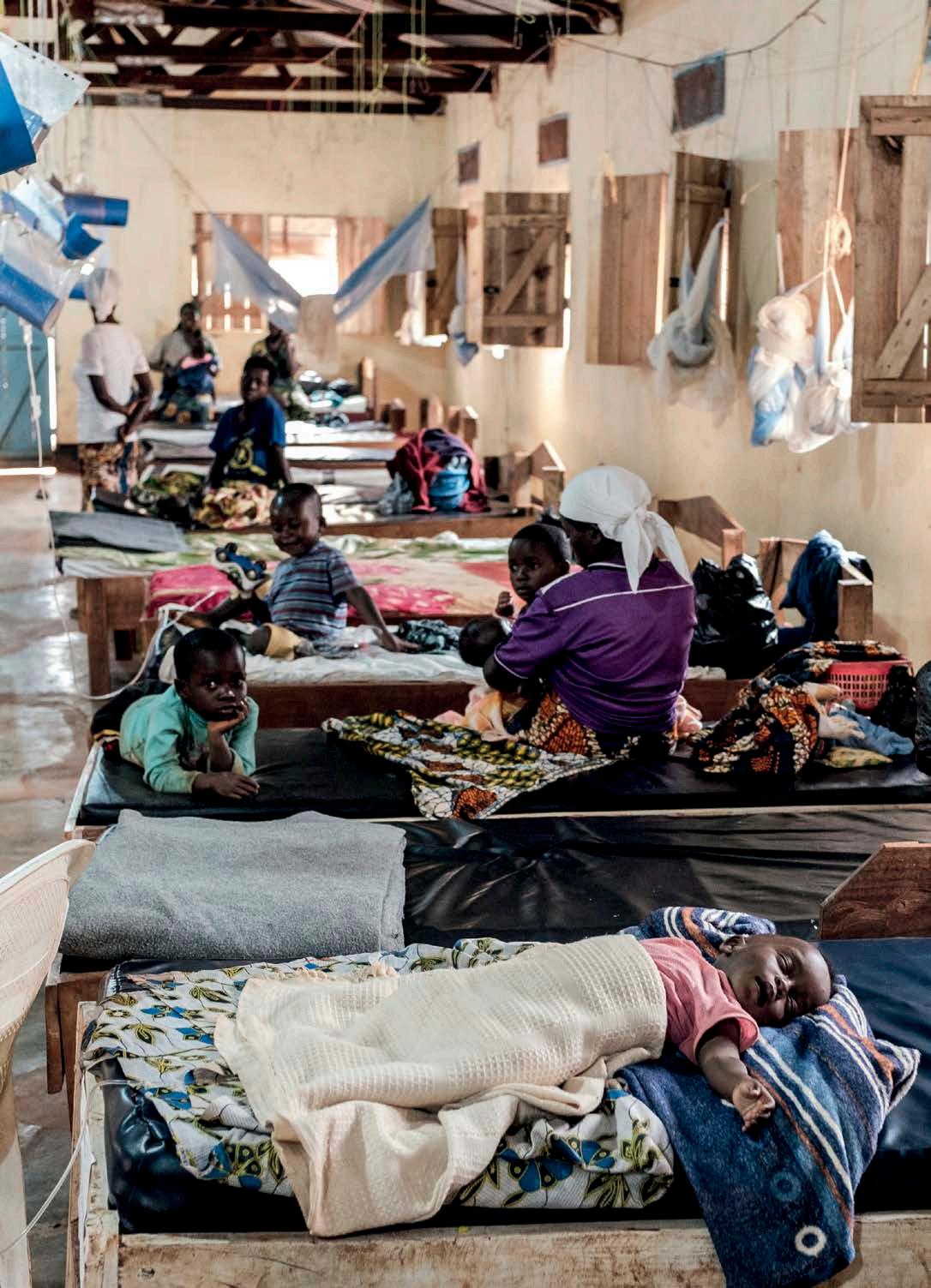 The Médecins Sans Frontières hospital in Nduta refugee camp, Tanzania, where children are recovering from severe acute malnutrition. © Erwan Rogard/MSF
The Médecins Sans Frontières hospital in Nduta refugee camp, Tanzania, where children are recovering from severe acute malnutrition. © Erwan Rogard/MSF
KEY ACTIVITIES: HIV/AIDS care, malaria care, mental healthcare, outbreak response, sexual and reproductive healthcare, sexual violence care, vaccinations, water and sanitation FIELD
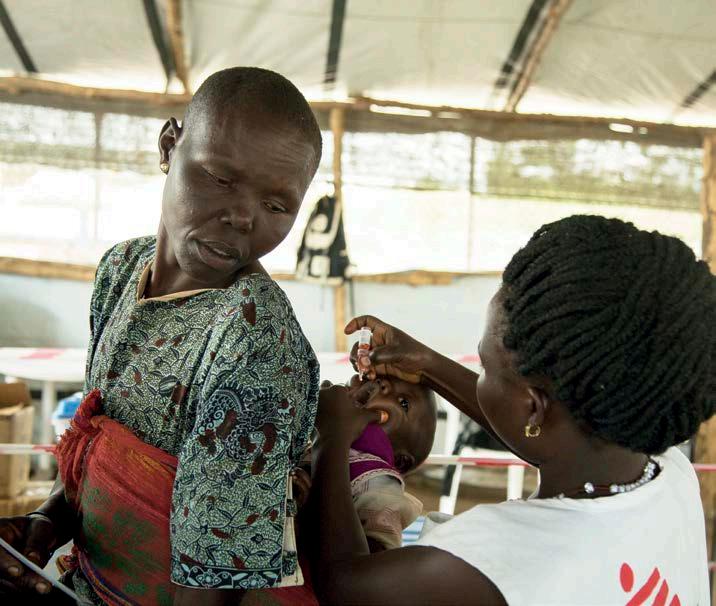
Huge numbers of refugees from the southern belt of South Sudan (Greater Equatoria region) continued to arrive in Uganda in 2017. By August, one million people – 85 per cent of whom were women and children – had fled across the border into northern Uganda, according to UNHCR, the United Nations refugee agency. Despite the efforts of the Ugandan authorities and other organisations, the provision of aid was insufficient to meet the urgent needs of so many people.
Médecins Sans Frontières developed and adapted a wide range of activities to assist refugees. In Bidi Bidi, Imvepi and Adjumani settlements, teams conducted 96,814 outpatient consultations, cared for 50,701 cases of malaria, admitted 1,802 patients to Médecins Sans Frontièresmanaged facilities, assisted 477 deliveries and offered mental healthcare for 3,089 people. In addition, staff provided vaccinations and ran health surveillance activities. The logistics team worked to improve access to drinking water and the construction of latrines.
An estimated 1.2 million people live with HIV in Uganda. Despite significant improvements, HIV detection and care remain a public health concern in specific groups of people, such as adolescents. Médecins Sans Frontières offers quick and reliable viral load monitoring through its point-of-care testing facility at Arua regional referral hospital, allowing patients to be switched to second-line antiretroviral treatment if necessary. By the end of 2017, 739 people were on second-line ARVs in Arua. In 2017, the team also provided drugresistance tests and an alternative drug regimen which enabled 10 new patients to access third-line treatment. Médecins Sans Frontières reinforced clinical and psychosocial support for HIV patients, especially for adolescents, to help them comply with their life-long treatment.
Adolescents are particularly vulnerable to the life-threatening health risks related to unwanted pregnancies, HIV/AIDS and sexually transmitted infections, due to a lack of awareness about these risks, and the shortage of youth-friendly sexual health and counselling services. Médecins Sans Frontières opened the Kasese adolescent centre in Kasese town in 2015, which offers sexual and reproductive healthcare, as well as community awareness-raising and recreational activities that encourage adolescents to come for consultations. In 2017, 30,852 adolescents had consultations and 20 victims of sexual violence received care.
Between the end of October and beginning of December, Médecins Sans Frontières addressed an outbreak of Marburg fever in Kween and Kapchorwa districts, in the east of Uganda. Teams set up two 10-bed treatment centres, trained healthcare staff and assisted local health authorities with epidemiological surveillance, community health promotion and mapping activities.
In Mykolaiv district, southern Ukraine, Médecins Sans Frontières started a new project for the treatment of hepatitis C.
When left untreated, hepatitis C can lead to liver failure and liver cancer. The program, which is conducted in collaboration with the Ministry of Health and the Mykolaiv Regional Centre of Palliative Care and Integrated Services, is aimed at around 1,000 patients with hepatitis C. Some of the patients are coinfected with HIV or on opioid substitution therapy, while others are healthcare workers infected with the virus. Patients receive free treatment with direct-acting antivirals and are also supported with counselling and health education
in order to improve adherence to treatment and help manage social issues resulting from their disease. The project became operational in November and by the end of the year 328 hepatitis C consultations had been carried out. Médecins Sans Frontières has also provided state-of-the-art diagnostic equipment and medical items to the centre in Mykolaiv.
KEY ACTIVITIES: Hepatitis C care
FUNDING: TOTAL MSFA $2,291,379 $1,088,476
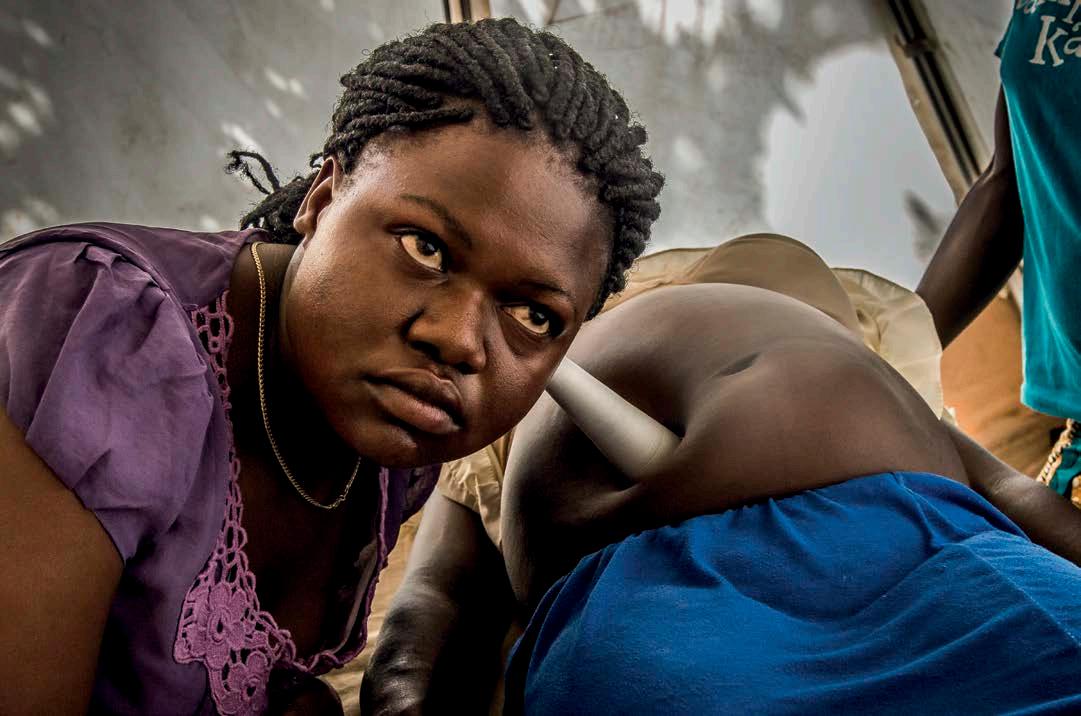
FIELD STAFF: 14
KEY MEDICAL FIGURE: 328 hepatitis C consultations
ROMANIA RUSSIA MYKOLAIV Project locations funded by Australian donorsMédecins Sans Frontières provided state-of-the-art diagnostic equipment and medical items to the centre in Mykolaiv.A pregnant woman receives a consultation in the health centre of Bidi Bidi refugee camp, Uganda. © Frederic Noy/ COSMOS/ MSF Médecins Sans Frontières New Zealand Annual Report 2017 –
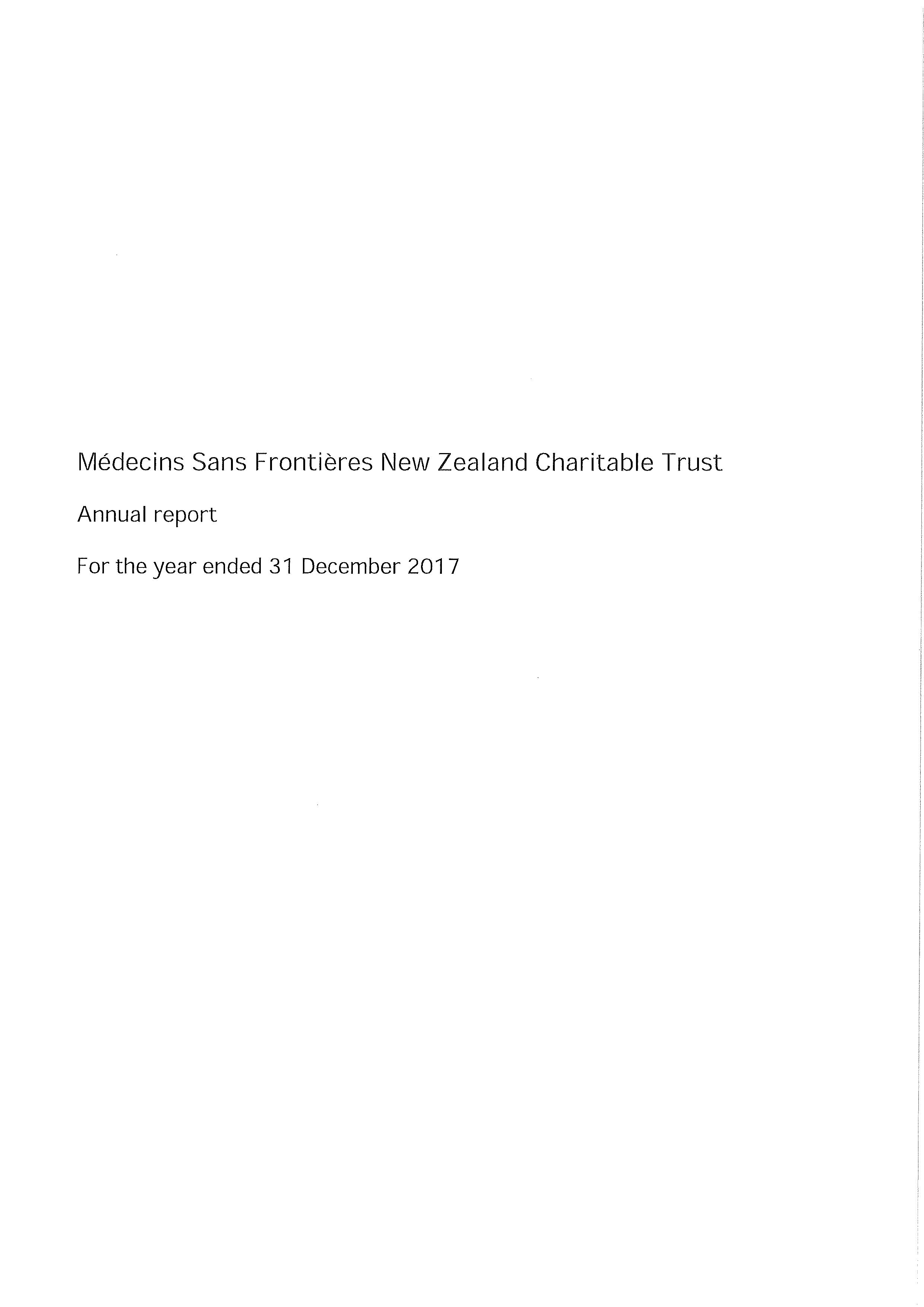
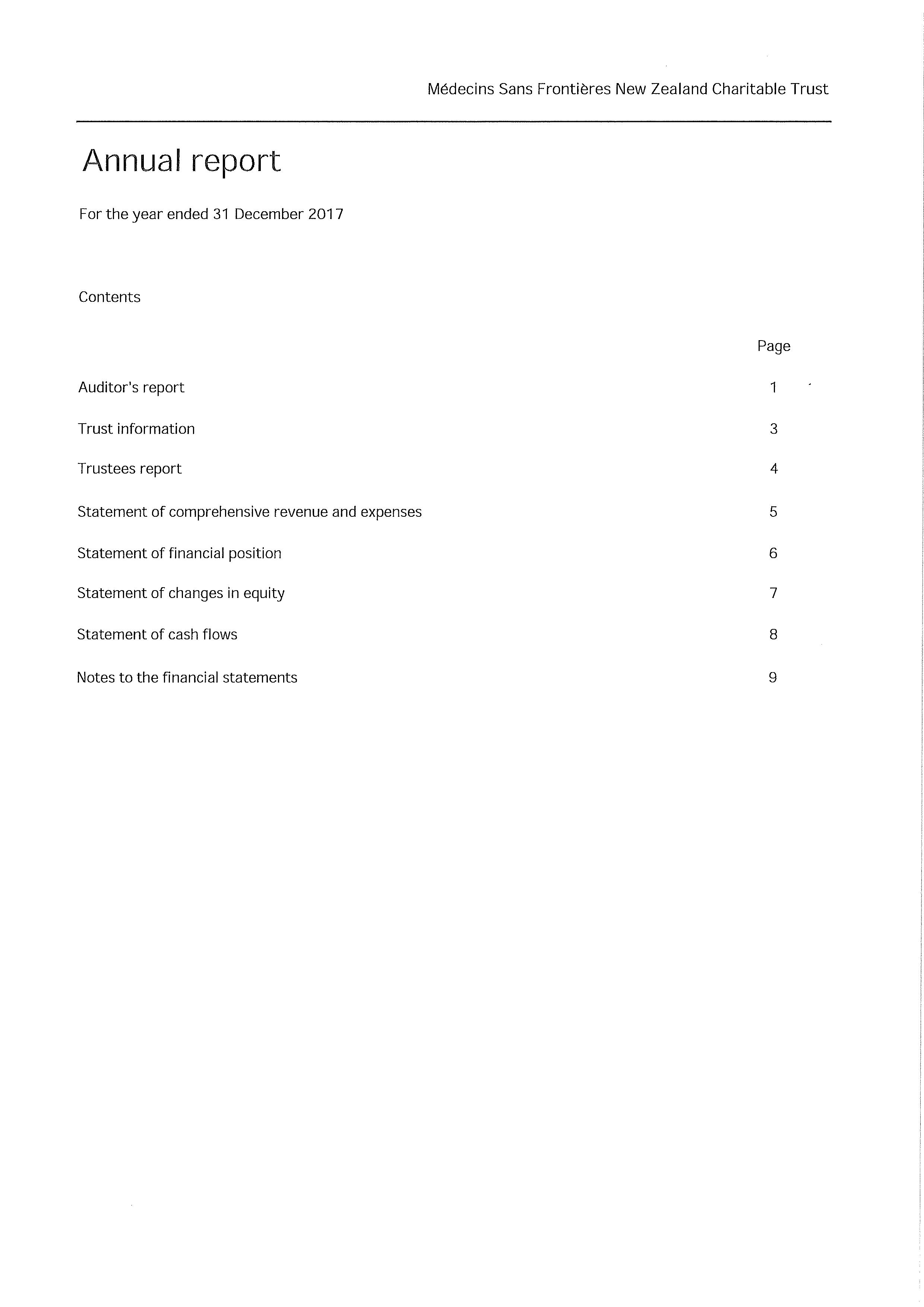
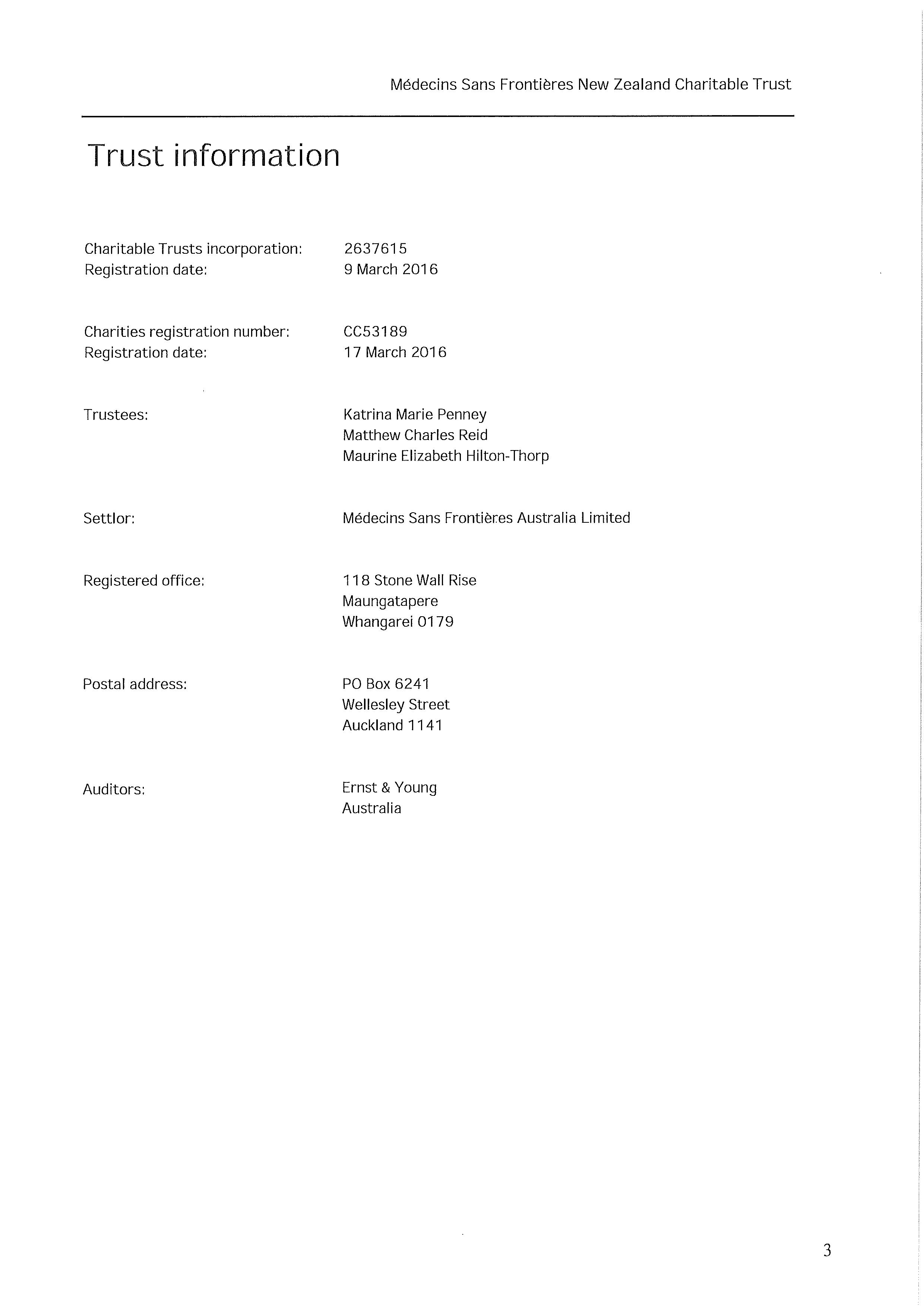
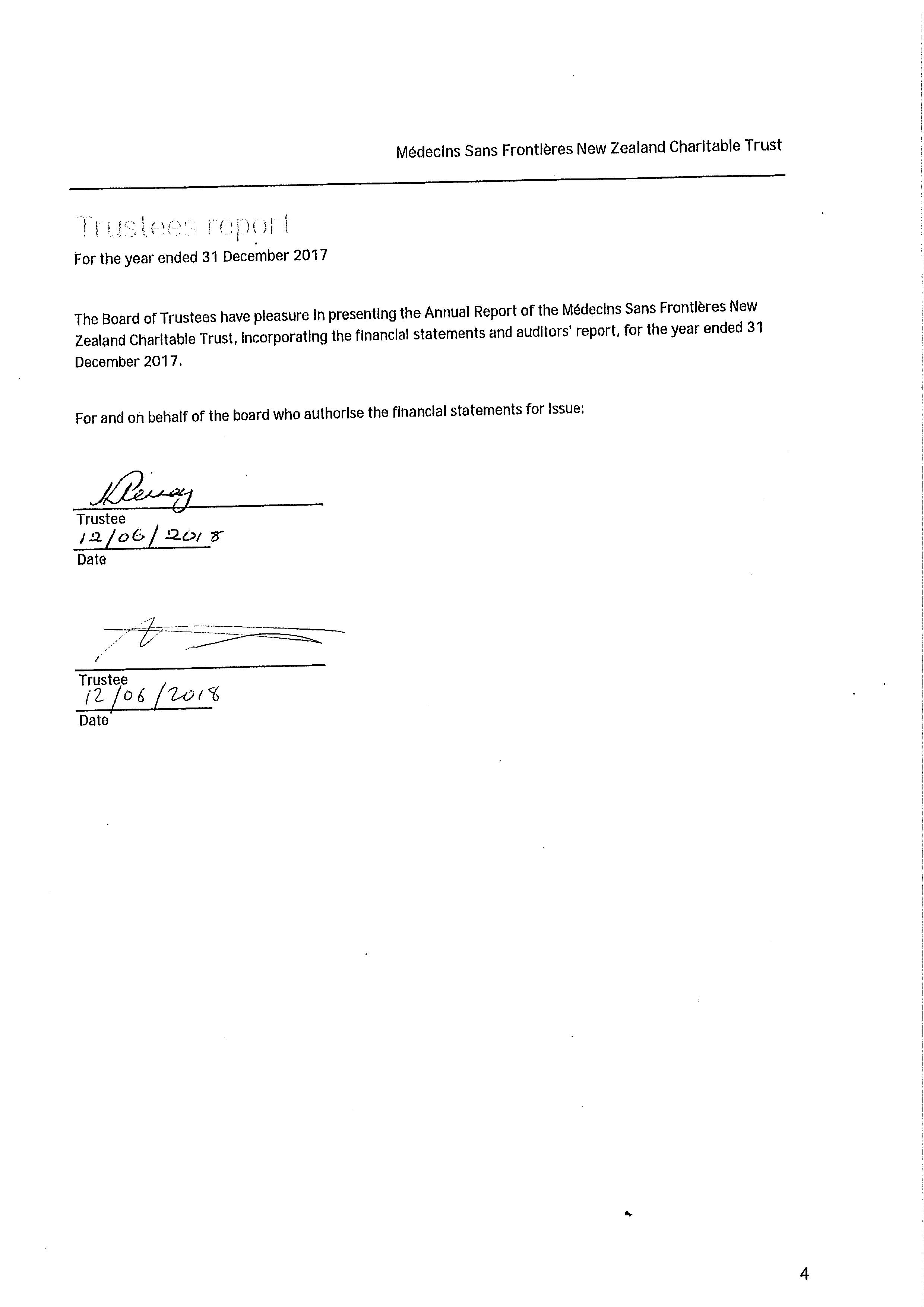

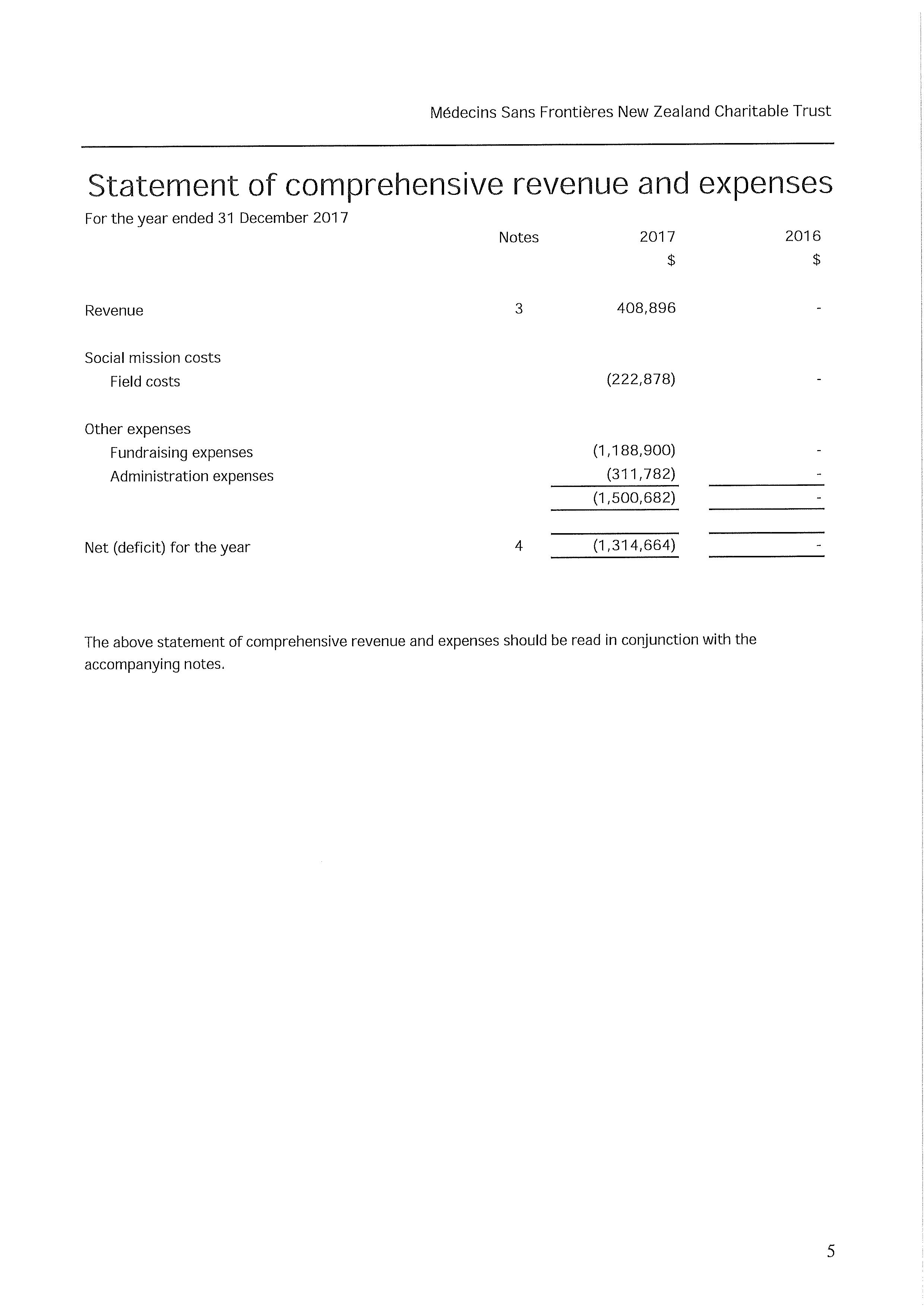
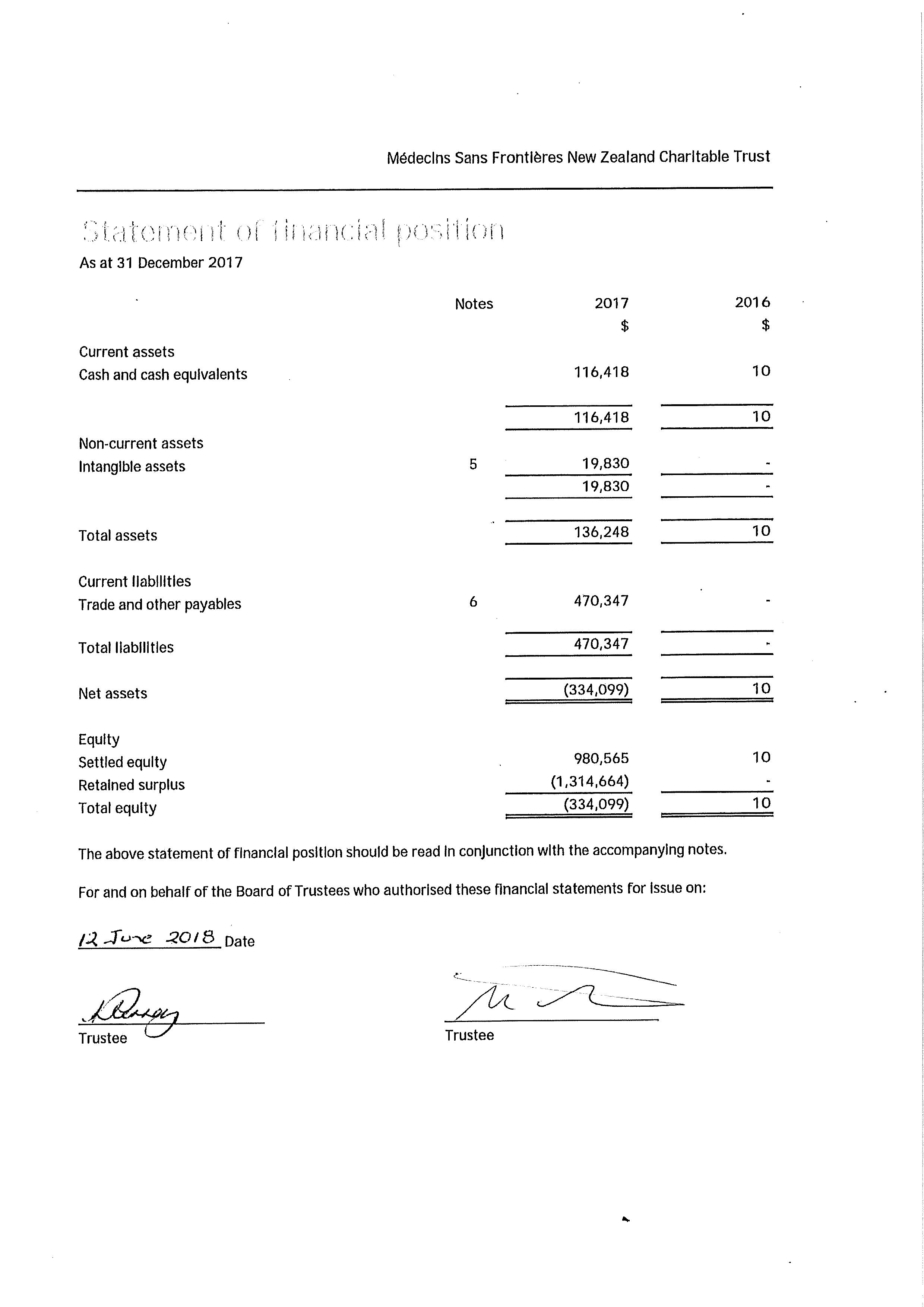
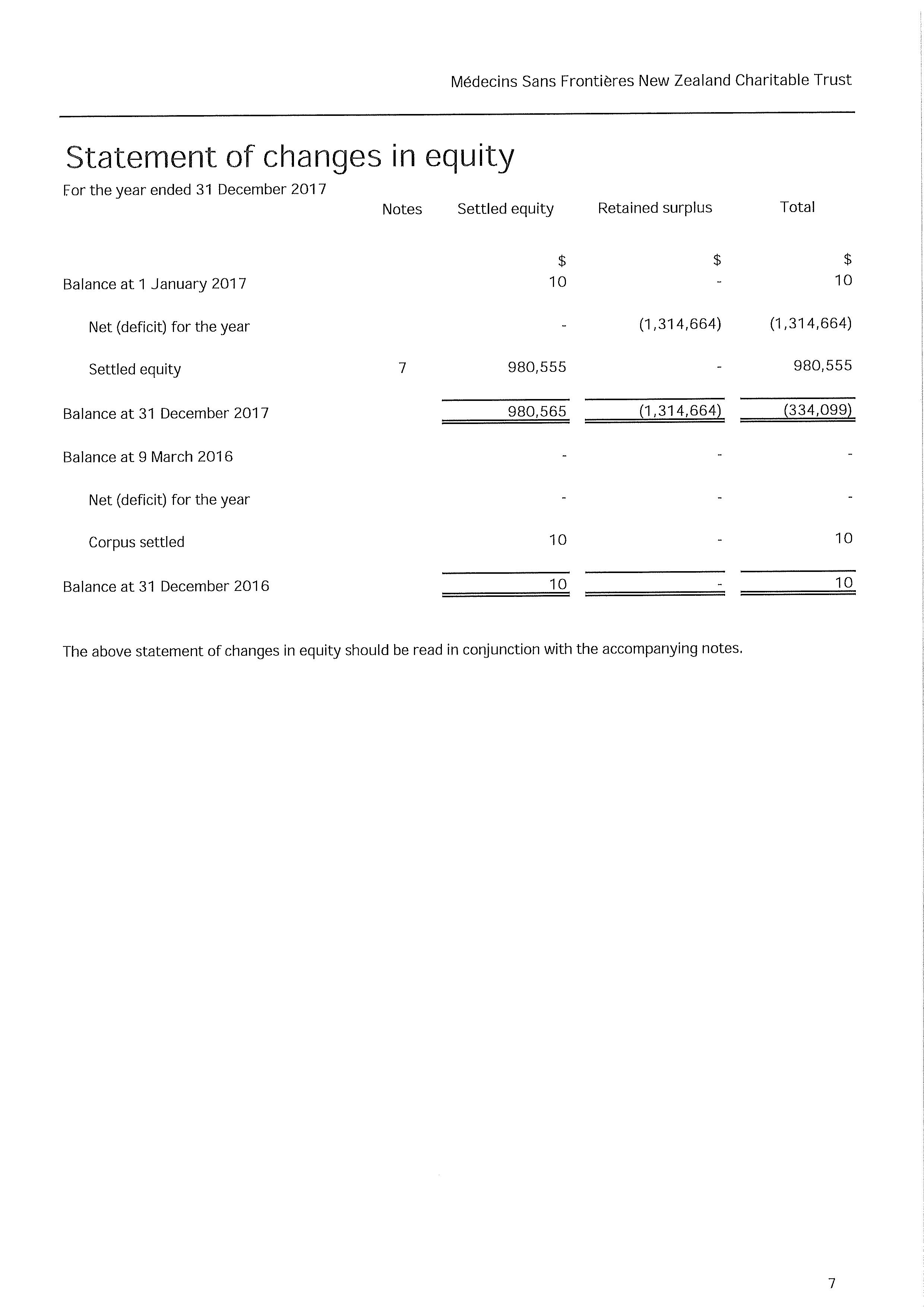
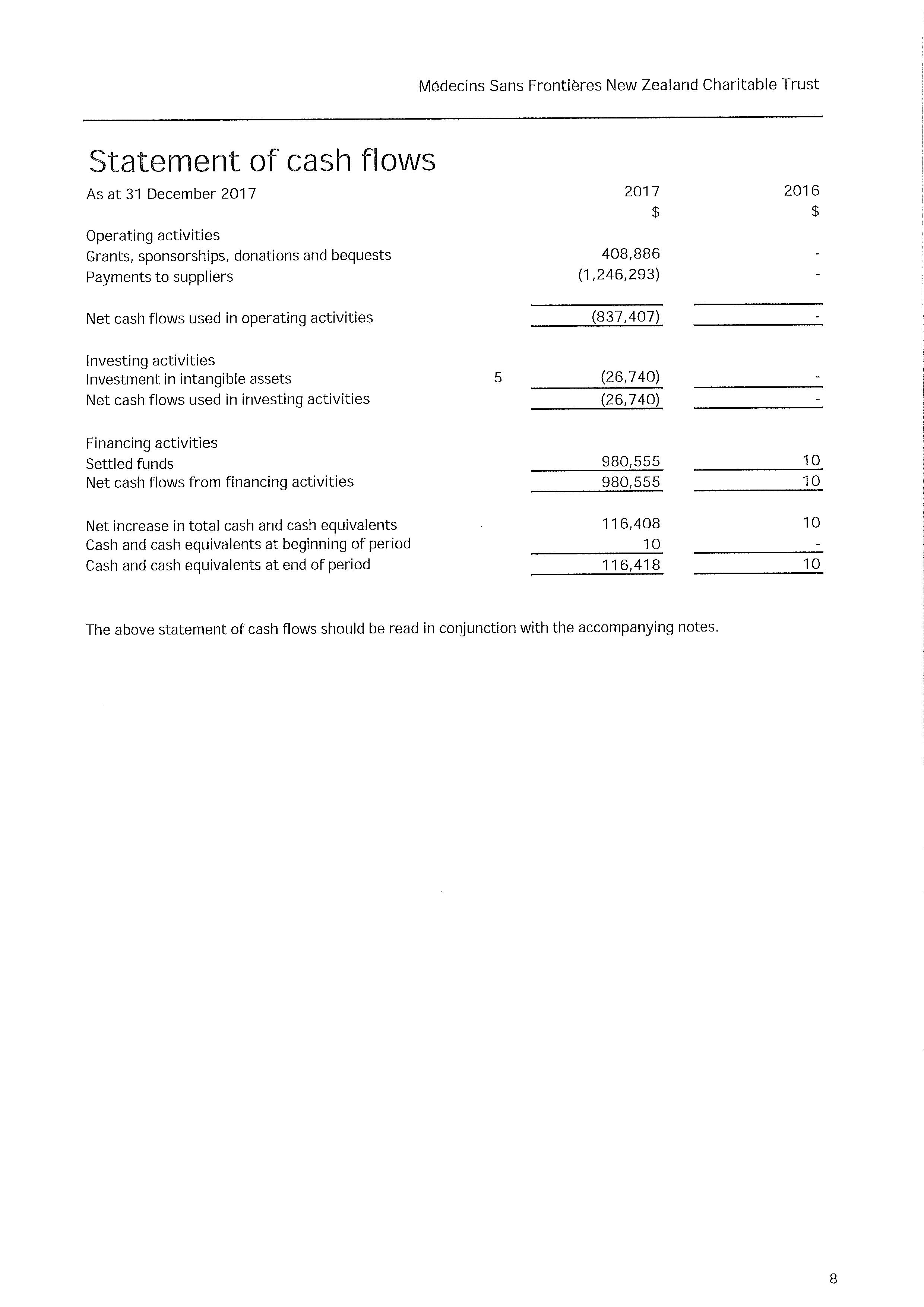
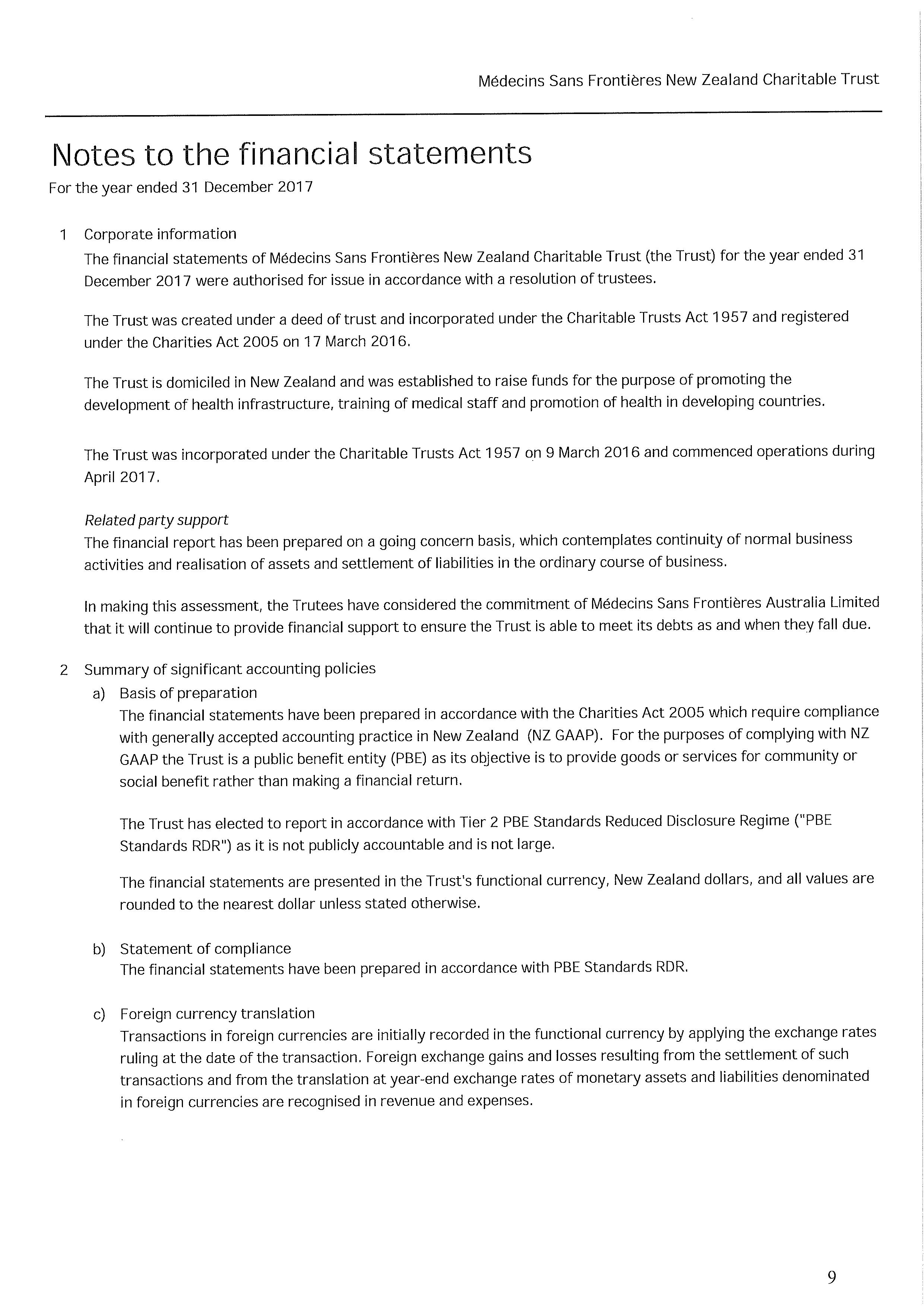
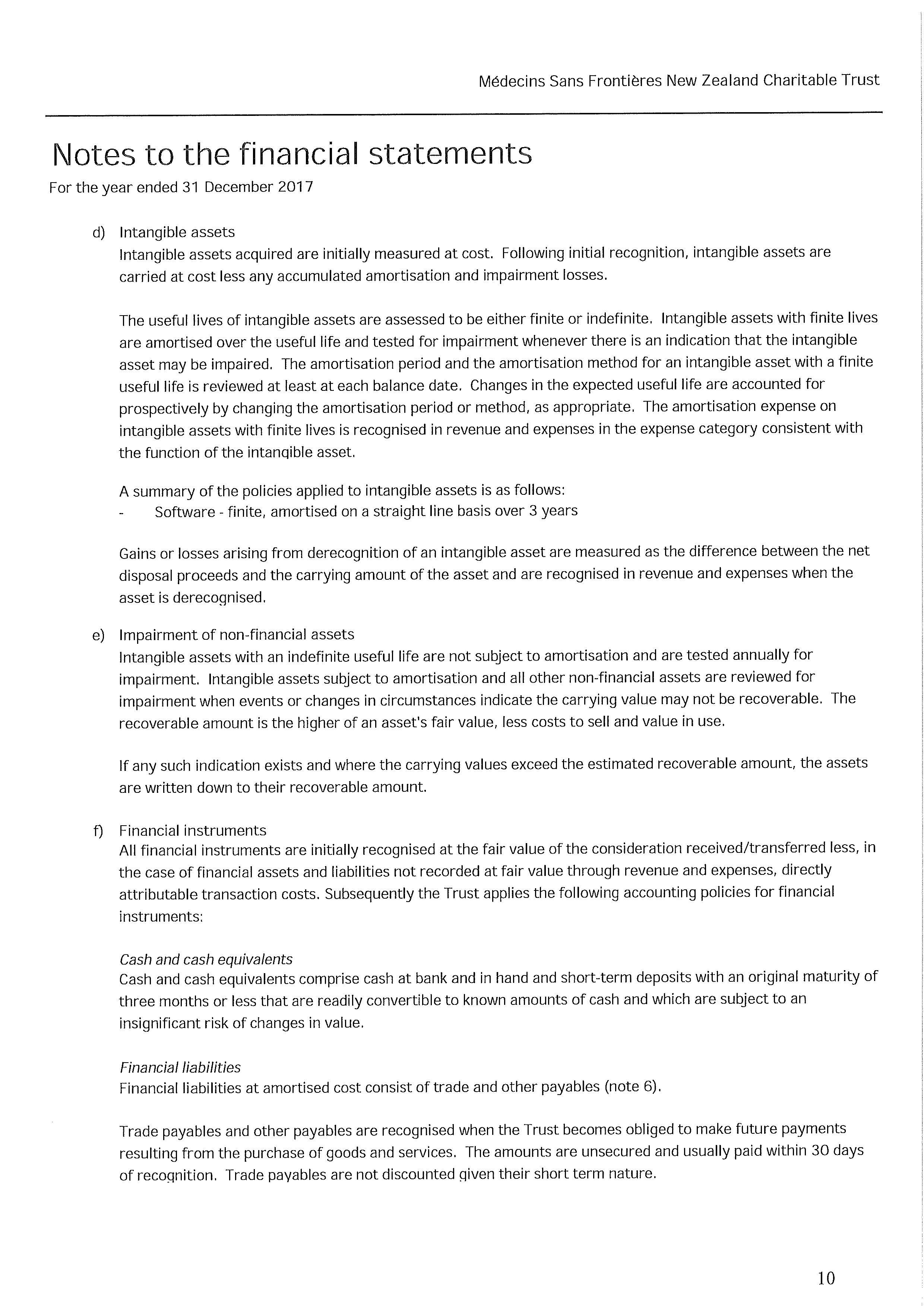
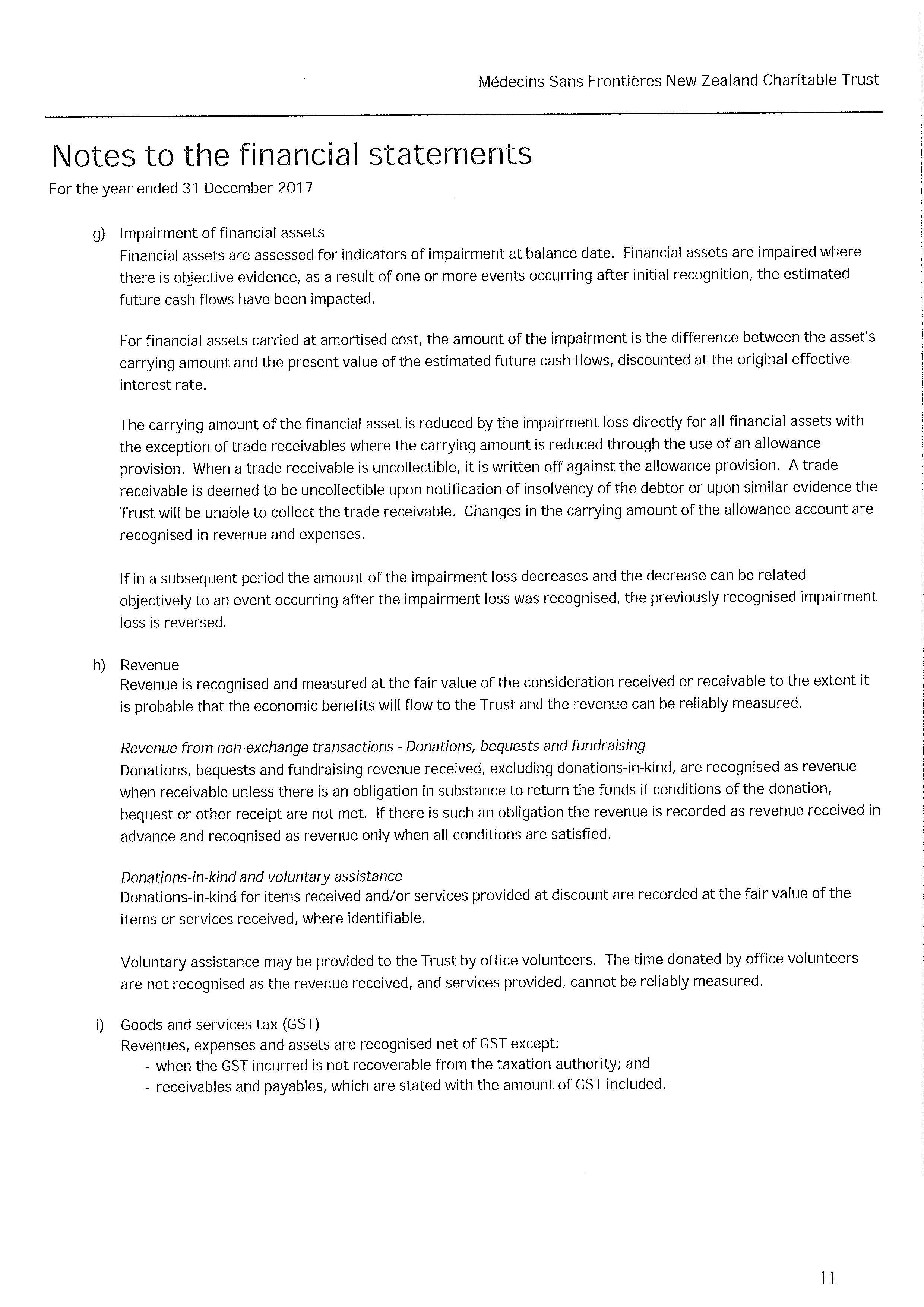
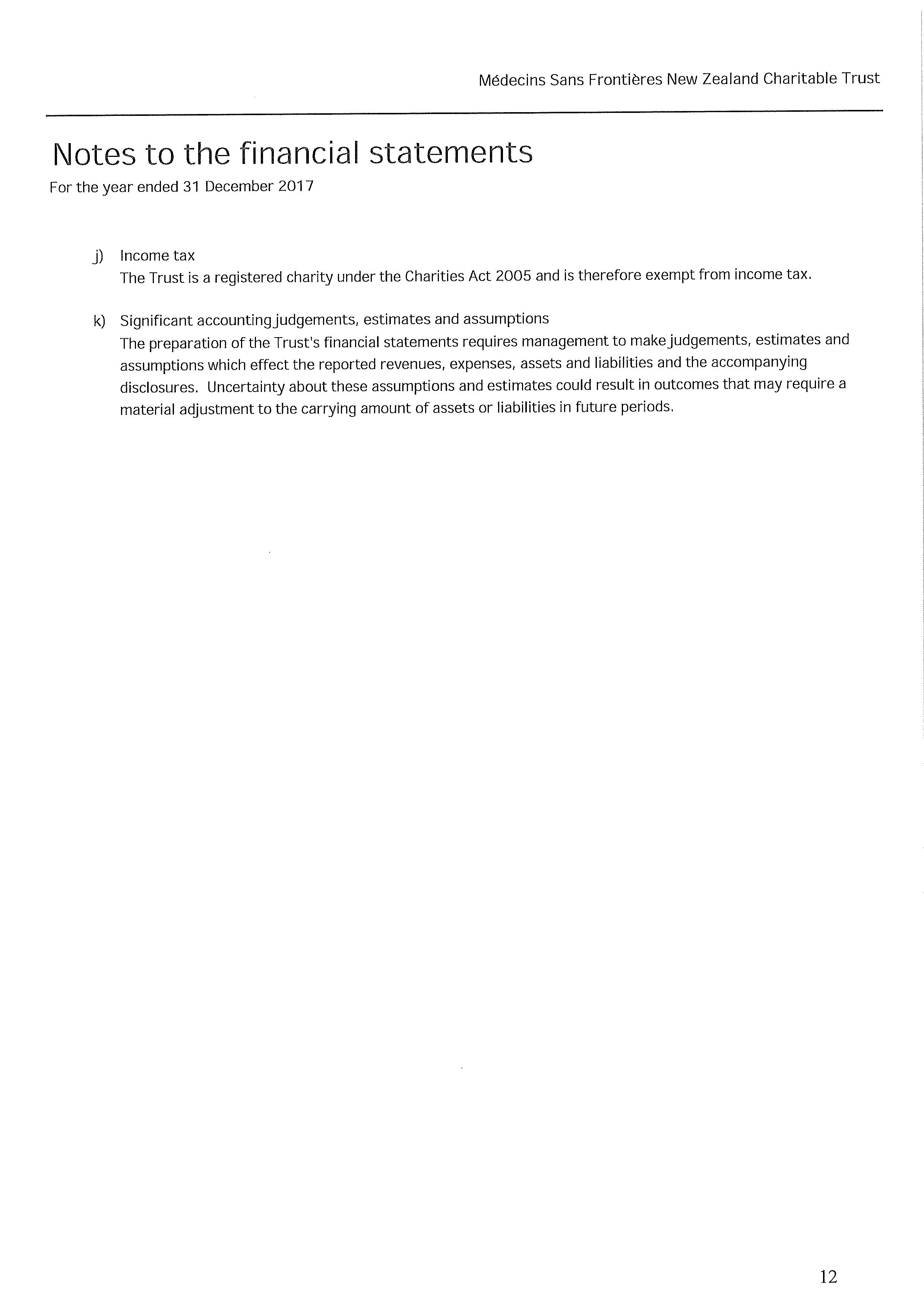
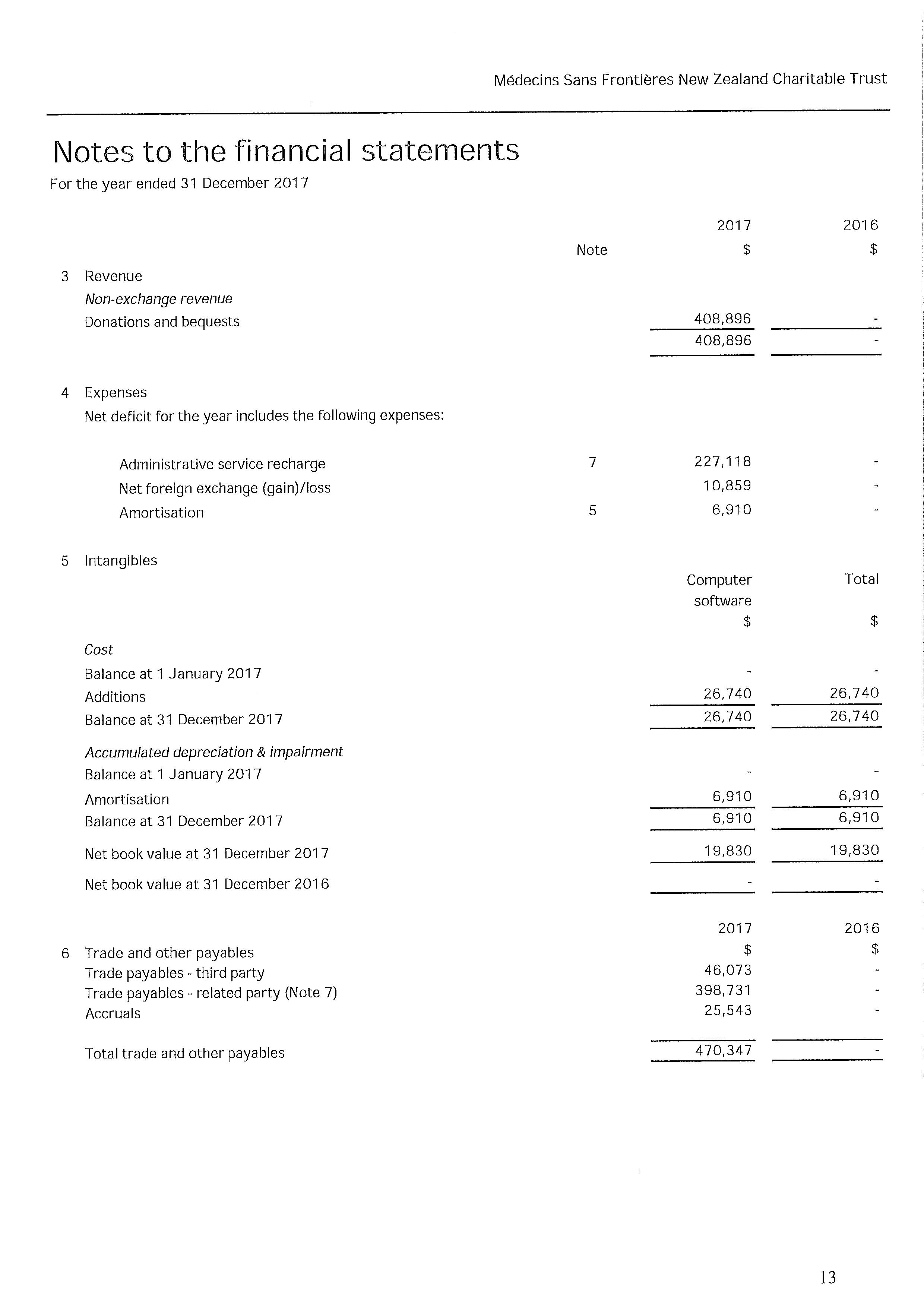
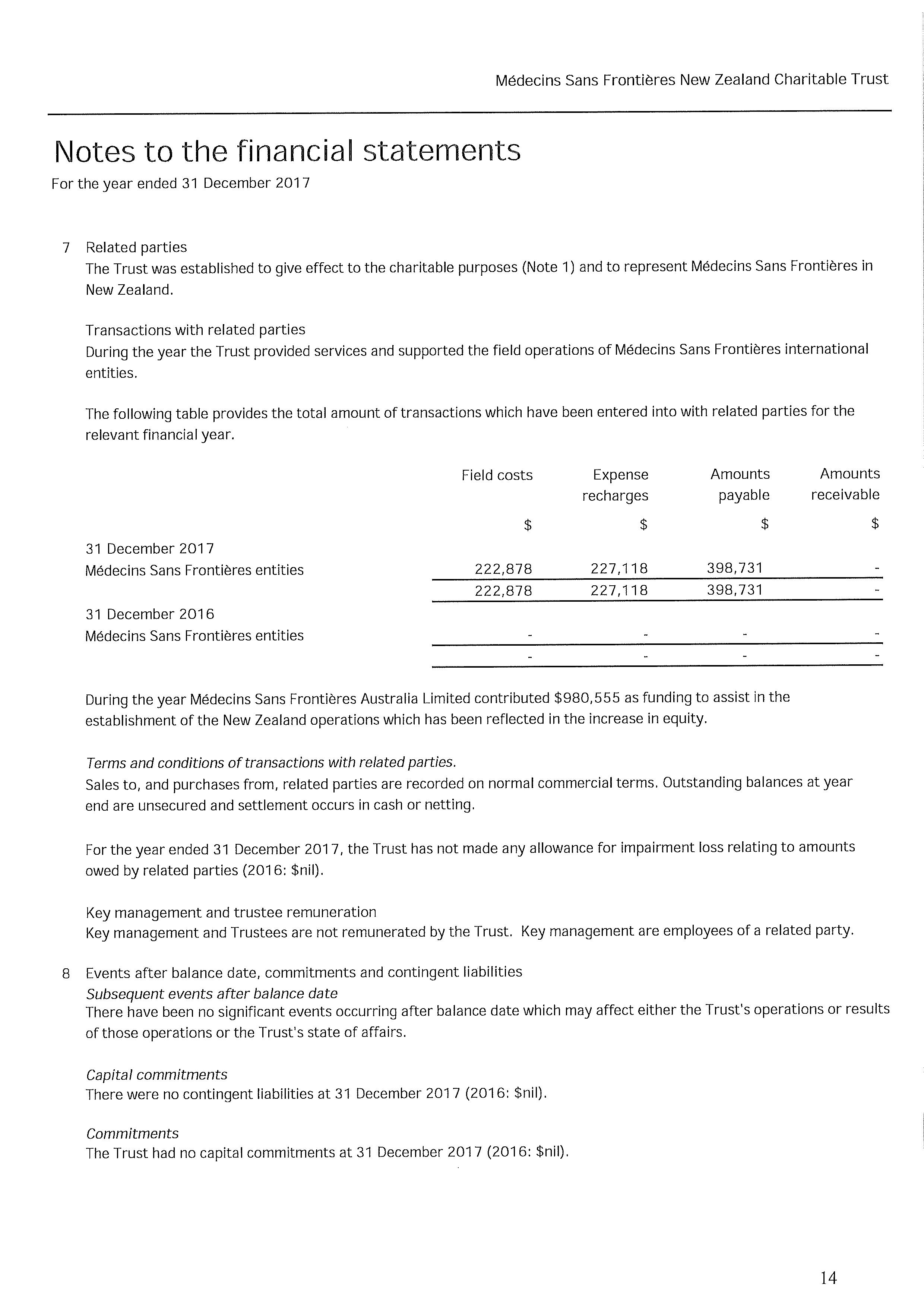
Médecins Sans Frontières New Zealand
PO Box 6241, Wellesley St, Auckland 1141
Phone: 0508 633 324
Email: contact.us@nz.msf.org
© Médecins Sans Frontières Australia 2017 msf.org.nz